


























When you’re young, Dr. Seuss books are a source of fun, witty, mischievous banter. The rhyming words tickle the ear, and the whimsical, fictional characters are so outrageous that you wonder if an adult truly wrote those words. But then you get older, and you begin to read these books to your kids, and you wonder if the adult writing it was imbibing something a little stronger than coffee when he sat down to pen those tomes.
As they’re so engrained in our minds, Dr. Seuss books sometimes come to mind as we look at the world around us.
Marvin K. Mooney came to my mind last week. Remember good, old Marvin? Hanging out, minding his own business, but being told – really strongly – that he must go now. There are many options given for Mr. Marvin to utilize for his departure: foot, cow, Zike-bike, Crunk-car, Zumble-zay, Ga-zoom, or even stamp himself and go by mail. Regardless of the method he decides to use, the message is the same: “I don’t care how. Marvin K. Mooney, will you please go now?”
That’s what I thought of last week when so many in the Democrat Party were calling for President Biden to step down from the presidential race. They weren’t giving him any options of how to step down, though, “Just go, go, go, I don’t care how!”
And then, as the book says, “The time
had come, so … Marvin went.”
Biden’s withdrawal from the race wasn’t very ceremonial – a little note, a hand wave, and he was out. And you wonder. That was it? After all those months of campaigning, of trying to remind the American people that he deserved another four years, all it took was a little (or a big) shove and he was done.
The media, of course, is fickle. Months ago, they were falling over each other, convincing the American public that Biden was healthy and strong, that he accomplished so much in the past four years that America needed him for another term. But then, after that infamous debate, they turned on him and simultaneously began crowing for him to leave the race. As a group, as a mob, they loved him and then they left him. And now, they’re turning to the next figure, trying to convince the American public that Kamala Harris is fit for the Oval Office.
No one said that American politics was boring. It may not be as entertaining as a Dr. Seuss book, but it will certainly keep us on our toes over the next few months.
And, if you feel like you need a break from politics, perhaps you’d like to take a little ride on a Zike-bike or a Crunk-car, if you wish.
Wishing you a wonderful week, Shoshana

Yitzy Halpern, PUBLISHER publisher@fivetownsjewishhome.com
Yosef Feinerman, MANAGING EDITOR ads@fivetownsjewishhome.com
Shoshana Soroka, EDITOR editor@fivetownsjewishhome.com
Nate Davis
Editorial Assistant
Nechama Wein
Copy Editor
Rachel Bergida Shana Brecher
Lani White
Design & Production
Gabe Solomon
Distribution & Logistics
P.O. BOX 266
Lawrence, NY 11559
Phone | 516-734-0858
Fax | 516-734-0857
Classified Deadline: Monday 5:00PM classifieds@fivetownsjewishhome.com text 443-929-4003
PAYMENT VIA CREDIT CARD MUST BE SUBMITTED ALONG WITH CLASSIFIED ADS
The Jewish Home is an independent weekly magazine. Opinions expressed by writers are not necessarily the opinions of the publisher or editor. The Jewish Home is not responsible for typographical errors, or for the kashrus of any product or business advertised within. The Jewish Home contains words of Torah. Please treat accordingly.











Dear Editor,
Before Joe Biden dropped out of the Presidential race, multiple polls this past week showed that about 20% of the country believed Biden was physically and mentally fit to lead this country. While 20% is a ridiculously low number for the supposed leader of the free world, 20% of this country is still tens of millions of people. How can that many people believe that a man who looks like a corpse, can’t string two coherent sentences together and embarrasses himself with every appearance is capable of being President? Fortunately, The Jewish Home allowed Mr. David Pecoraro last week to make the case. Had this been my first time reading Mr. Pecoraro’s screeds, I would have thought this was a troll job. However, Mr. Pecoraro has long been a staunch defender of Joe Biden’s fitness for office. So I will deconstruct his statements from his letter and see if they are based in reality.
Mr. Pecoraro writes: “Joe Biden is healthier than most of the readers of The Jewish Home.” This statement could be true if The Jewish Home was only distributed to hospice centers and intensive care wards. As a reader of The Jewish Home myself, I know that this is not the case and therefore, Mr. Pecoraro’s statement cannot be true. Mr. Pecoraro states that Biden has been examined by neurologists at each of his physical exams. Now this could be true, but the results of any cognitive test administered have not been released. Biden himself has dismissed the need for a cognitive test, delusionally stating that he passes one every day by dint of being President. Mr. Pecoraro states that Biden puts in 14-hour days. This is definitely not true as multiple reports have come out stating that Biden is not even lucid after 4 p.m. It’s highly unlikely that a man who can no longer finish a thought,
cannot speak off prompter for more than 2 minutes, has to have his questions prescreened and be handed a cheat sheet with instructions such as “You enter the room” and “You sit here” is holding high level meetings at 10 p.m. Mr. Pecoraro states that Biden has the respect of other world leaders and mentions that Biden flew to war torn areas such as Ukraine and Israel. Here again, one must apply twisted logic to believe this nonsense. It is precisely because world leaders such as Ayatollah Khomeini and Vladmir Putin see what a pathetic, frail, feckless, inept and frankly ignorant President we have, that they decided to attack Ukraine and Israel while America remains leaderless.
Lastly, Mr. Pecoraro states what a loving wife Jill Biden is. What loving wife pushes her obviously, deeply impaired husband to humiliate himself with every public appearance, just for the opportunity to hold onto political power for a little longer? She is a conniving, morally bankrupt, despicable excuse for a spouse.
Now that the Democratic Party operatives forced Biden out (likely by threatening him with the loss of his Presidential library, lucrative book deals and lots of other post-Presidential goodies) he can relax and contemplate all that transpired the past four years. The only benefit to Biden’s current diminished cognitive state is he likely will never see the fruits of all the terrible damage he has inflicted on this country and will instead, live out his remaining years believing (along with Mr. Pecoraro) that he is one of the greatest Presidents this country ever had. Jason Stark
Dear Editor,
Glad to hear that President Biden heeded the words of Kenny Rodgers in the Gambler, “You’ve got to know when to hold ’em,
Continued on page 12


Continued from page 10 know when to fold them, know when to walk away and know when to run.”
Sincerely,
Larry Penner
Dear Editor,
This is addressed to David Pecoraro who, in your July 18 issue, released his diatribe against President Trump while extolling his deranged compliments for President Biden.
While I could tear apart his entire ridiculous statements, point by point, I will not waste anyone’s time in repeating what has been said so many times before.
I only want to recommend that Mr. Pecoraro seek health help, as soon as possible, to assist him in getting back to reality.
Jack Brody
Dear Editor,
In the letters section of the July 18 section of The Jewish Home, Mr. Pecoraro says that “real doctors … report numbers that indicate that President Joe Biden is healthier than most of the readers of The Jewish Home regardless of age.” I have no idea which “real” doctor would say this. It seems that whatever doctor Mr. Pecoraro got this information from is a real quack, and Mr. Pecoraro is the ugly duckling here.
Saying that Mr. Biden is healthier than most of this newspaper’s readers is not just false, but it’s personally insulting! Mr. Pecoraro has made this statement based on complete conjecture without knowing much about this newspaper’s reader demographics. I am one of the readers that he alluded to. I don’t stutter or lose my train of thought in mid-sentence. I rarely stumble down flights of steps. I frequently teach. I don’t read from a teleprompter, and I answer questions from any random audience member without knowing what questions they will ask me in advance. If I don’t know the answer, I say that I don’t know, rather than mumble some irrelevant answer that no one can understand. Finally, when I’m done, I know how to find the exit and leave by myself. Mr. Biden is barely fit to do these things.
I think Mr. Pecoraro should publicly apologize for insulting this newspaper’s readers. I don’t know what adding the title that he is the former Vice President of Rosedale Jewish Center does to raise his qualifications. I can only wonder if he was ousted from the board because he insulted fellow board members in a similar way that he has done in his letter. Daniel Feldman
Dear Editor, The American people were told this
weekend that President Biden has withdrawn his name from the 2024 election, disenfranchising all Democrat primary voters. He was able to do this because Kamela Harris, his Vice President (VP), in cooperation with other Democrats and the media, kept telling us that President Biden did not have any cognition issues which became apparent at the debate with President Trump. Harris, who dropped out of the 2020 race for President based on her unpopularity, was a clear DEI pick when named to the VP position. Now Harris has been named as President Biden’s successor for the Democrat presidential nomination.
Vice President Harris was assigned one job, managing the border, and she has failed miserably. Since her assignment, millions of illegal migrants have crossed into our country and that has resulted in Christopher Wray, the FBI Director, stating that the current threat level is much worse than before 9/11. Countless American citizens have been assaulted and killed by illegals without a word from Kamala. Fentanyl, trafficking and over 70,000 children are unaccounted for by this Border Czar. Yet she is touted by the Legacy Media as a champion of women’s rights. Before she was appointed Border Czar, Kamala Harris was all in on the George Floyd rioters from the “peaceful” summer of 2020. She warned us that rioting would continue until there was justice for George Floyd. This included setting up funds to bail out rioters leading many of them to continue their crime spree. As bad as the border and crime is, a major issue for Jewish Americans is her siding with Hamas over Israel. Over 15 of the 120 hostages remaining in Gaza are American, and she has never called for Hamas to release them. She has also not called out Hamas for their unspeakable horrors committed on October 7, 2023. From her statements, you would never know that over 1200 Israeli innocents were tortured and killed on October 7, 2023, while more than 250 were tortured and dragged into Gaza. Yet Kamala has continually called for a ceasefire in Gaza using the Palestinian Health Ministry’s casualty numbers as a reason to blame the Israelis for defending themselves.
At the Republican National Convention, Matt Brooks, Republican Jewish Coalition, posed the question, “Do you support Israel?” There was a resounding “yes,” which he stated he could never have asked at the Democrat National Convention since he would have been booed off stage.
Jan Henock
Woodmere, NY





It seems like taxing tourists is the way to go. In Venice, authorities rolled out a temporary entrance fee for visitors over the past few months.
The 29-day €5 fee experiment began on April 25 until July 14 and ran on selected days. According to Venice Mayor Luigi Brugnaro, the program brought in €2,425,310 (around $2.64 million) for the city, way more than the expected fees that the city thought they would collect.
A total of 3,618,114 individuals made reservations, of whom 1,398,084 were exempted from payment because they stayed in hotels.
Other exemptions included 651,254 workers who traveled to the city on days the fee was in place, as well as 466,819 students and 217,589 residents who were not required to pay the entrance fee.
Additionally, 78,224 people were exempted because they were related to residents, and 107,146 were exempted for “other” reasons including being born in the city, religious activities such as the papal visit, and those participating in cultural events, according to data released by the city of Venice.
The experiment was put into the place to limit the amount of visitors coming into the crowded city.
“From a first reading of the data it appears that day-trippers and tourists prefer Saturday to Sunday, and that during all 29 days of experimentation a peak attendance day, equal to that recorded on 30 April 2023, was not reached,” the city said in a statement, adding that the number of people coming to the city on “red flag days” gradually decreased over time.
The city is considering implementing the fee again during other busy times of the year, although that has yet to be announced.
“It’s a positive balance: The first 29 days of experimentation have finally given the city a tool that has allowed us to know how many people would objectively arrive in Venice and will be able to give us a way to act accordingly,” tourism councilor Simone Venturini said.

A court in the Russian city of Yekaterinburg sentenced Wall Street Journal reporter Evan Gershkovich to sixteen years in prison on espionage charges that are widely regarded as illegitimate. The court officially issued the verdict and sentencing last Friday at around 3 p.m. local time.
The first U.S. journalist to be arrested in Russia on suspicion of spying since the end of the Cold War, Gershkovich, 32, was detained in Yekaterinburg in March 2023 while reporting on Russian matters for the WSJ. Russian prosecutors alleged that Gershkovich, “under instructions from the CIA,” used “painstaking conspiratorial methods” to collect “secret information” about a tank factory in Russia.
However, Gershkovich was simply doing his job as a reporter and was likely jailed for geopolitical purposes. Moscow has thus far failed to publicly produce any evidence of the journalist’s wrongdoings, with the WSJ, the U.S. government, and the Western world at large branding the trial a sham.
“This disgraceful, sham conviction comes after Evan has spent 478 days in prison, wrongfully detained, away from his family and friends, prevented from reporting, all for doing his job as a journalist,” the WSJ said in a statement last week. “We will continue to do everything possible to press for Evan’s release and to support his family. Journalism is not a crime, and we will not rest until he’s released. This must end now.”
The newspaper’s sentiment was echoed by Linda Thomas-Greenfield, the U.S.’s Ambassador to the U.N., during a United Nations Security Council meeting on the day Gershkovich was sentenced.
“Let me begin with the news coming

16 out of Russia this morning. Evan Gershkovich was sentenced to 16 years. He has committed no crime. He is being punished because he is a journalist, and he is an American. Simple as that,” Thomas-Greenfield said.
The court’s decision came after Gershkovich offered nonpublic final remarks on the morning of the sentencing. According to a June statement by Russia, Moscow and the U.S. are currently conducting private negotiations about a prisoner exchange deal that could free Gershkovich.
Andrey Mineyev, the judge who presided over the trial, said that Gershkovich has fifteen days to appeal the court’s decision. Additionally, Gershkovich was ordered to pay 6,708 rubles ($77) in procedural fees, with the court also ordering the destruction of the reporter’s iPhone, notepad, and a few of his other belongings. The past 480+ days that Gershkovich has been imprisoned will be deducted from his sixteen-year sentence, the judge added.
Initially, Gershkovich was imprisoned in the infamous Lefortovo prison in Moscow, where he was confined to a tiny jail cell, after which he was sent to Yekaterinburg, where he spent his days writing to family members and friends. According to the reporter’s parents during a WSJ in-
terview, authorities let Gershkovich walk for one hour a day.
In 2022, Brittney Griner, an American WNBA player, was imprisoned in Russia. Later that year, she was freed in exchange for Viktor Bout, a Russian criminal. Paul Whelan, a U.S. Marine, remains in Russian custody after receiving a sixteen-year sentence in 2020 on espionage charges.

A technical glitch implemented by cybersecurity company CrowdStrike in a recent Windows update wreaked havoc upon countless nationwide and global systems last week, causing 3,000 U.S. flights to be canceled and shutting down numerous important medical and government systems.
CrowdStrike, a company that works for Microsoft, was quick to clarify that the

incident was not linked to any cyberattacks or security failures. The firm’s CEO, George Kurtz, stated on X, formerly Twitter, that his company “is actively working with customers impacted by a defect found in a single content update for Windows hosts.” The chief executive also vowed that CrowdStrike would be fully transparent about the incident and would take measures “to prevent anything like this from happening again.”
Over 3,000 U.S. flights were canceled and over 11,000 were postponed, FlightAware.com said on Friday evening. The Federal Aviation Administration said that it “is closely monitoring a technical issue impacting IT systems at U.S. airlines,” adding that “several airlines have requested FAA assistance with ground stops until the issue is resolved.”
“Yesterday, CrowdStrike released an update that began impacting IT systems globally,” Microsoft’s chief executive Satya Nadella said. “We are aware of this issue and are working closely with CrowdStrike and across the industry to provide customers technical guidance and support to safely bring their systems back online.”
Several medical facilities were impacted by the technical issue, including Cincinnati Children’s hospital. Elective medical procedures at Houston’s Harris Health System were canceled, while Boston’s Mass General Brigham canceled non-urgent surgeries, procedures, and visits. The Provincial Health Services Authority in British Columbia, Canada, said that the technical issue impacted its health systems. Blood donation centers also faced several issues due to the glitch.
The American Red Cross, on the other hand, was not affected.
Some U.S. 911 operations, including in Alaska and New Hampshire, were impacted. Public transportation services in New York and Washington, D.C. were also affected. Australia, South Africa, and the United Kingdom were plagued with banking issues, while Disneyland in Hong Kong and Israel’s health service were also affected. Some state DMV agencies, including in North Carolina, Georgia, Tennessee, and Texas, were also impacted by the technical issue.
On Friday, officials announced that Vietnam’s Communist Party chief Nguyen Phu Trong passed away at age eighty.
He was widely considered the nation’s most powerful leader, having served as the Communist Party’s general secretary since 2011.
“General Secretary of the Central Committee of the Party Nguyen Phu Trong passed away at 13:38 on July 19, 2024, at the 108 Central Military Hospital due to old age and serious illness,” reported the Nhan Dan newspaper.
State news agencies also announced that Vietnam would hold a state funeral for Trong.

Trong was born in 1944 and joined the Communist Party, which is Vietnam’s only constitutionally recognized party, when he was 22 years old. His career was marked by his never-ending fight to purge his party of corruption, which he feared could rob the Communist Party of its credibility. In the late politician’s words, “a country without discipline would be chaotic and unstable.”
Trong’s anti-corruption campaign was branded the “blazing furnace” and targeted a number of businesses and politicians, including thousands of members of the Communist Party. Former presidents Nguyen Xuan Phuc and Vo Van Thuong, as well as Vuong Dinh Hue, were disciplined as part of Trong’s campaign. In total, eight individuals from the Communist Party’s policy-making committee, or “Politburo,” were forced out of their positions for being found guilty of corruption since 2016, when Trong’s campaign kicked off. In comparison, in the decades before 2016, no party members were publicly exposed and thrown out for corruption.
Between 1981 and 1983, Trong was a student in the Soviet Union. While he led Vietnam, many expected the country to develop a closer relationship to Russia and China, although Trong instead cultivated what he called “bamboo diplomacy,” wherein Vietnam, like bamboo, remained geopolitically flexible, “bending” in the face of global change. The country has stayed close to China, while boosting relations with the U.S. in recent years.
Following Trong’s death, the Chinese Communist Party’s central committee

18 said it “deeply mourned” the Vietnamese leader’s passing, according to the Xinhua news agency.
“Vietnam has become more and more like China, where institutions and norms doesn’t really matter as much as personal power,” Nguyen Khac Giang, a visiting fellow at Singapore’s ISEAS-Yusof Ishak Institute’s Vietnam Studies Program, said of Trong’s anti-corruption campaign, which Giang says has eliminated several Communist Party institutions which helped maintain balance of power.
On July 18, after Trong began receiving treatment for his deteriorating health, To Lam, who has been Vietnam’s president since May, was chosen to “preside over the work of the Party Central Committee, the Politburo, and the Secretariat.” Before becoming president, Lam was in charge of the anti-corruption campaign. Lam is expected to succeed Trong as party general secretary.
Concerns of Trong’s physical well-being were sparked after he was initially hospitalized in 2019. Last month, Trong met with Russian President Vladimir Putin, during which he reportedly seemed feeble and sick.

For the past six weeks, protests have been rocking Kenya. At least 50 people have been killed and more than 400 have been injured. This week, protesters seized control of Nairobi’s main international airport.
Social media posts encouraged protesters to close all roads leading to the Jomo Kenyatta International Airport and cause a “total shutdown.”
Authorities said in a statement on Monday night that they increased security at the airport and warned against trespassing on protected areas, saying it was an offense punishable by law.
“We urge all individuals participating in demonstrations to respect these legal provisions from attempting to
enter or interfere with protected areas,” acting Inspector General of Police Douglas Kanja said.
The youth-led protests began last month after national outrage about a controversial finance bill that would have dramatically raised taxes on basic commodities. After President William Ruto was forced to pull the bill, demonstrators shifted their attention to protesting against his legitimacy, corruption in his government, and police brutality.
Last month, Ruto fired his entire cabinet, except for two ministers. On Friday, he renominated six of those ministers, reigniting the public’s ire. The cabinet nominees still need parliamentary approval, but they’re likely to be confirmed since Ruto’s party holds the required majority.
On Sunday, the president expressed frustration with the protests, declaring that “enough is enough” after failed attempts at dialogue.
“Going forward, we will protect the nation. We will protect life, property, we will stop the looters, killers, mayhem and anarchy because Kenya is a democracy, and we want a peaceful, stable nation,” Ruto said.

On Monday, Filipino President Ferdinand Marcos Jr. announced that offshore gambling will be banned in the country. Known locally as POGOs, Philippine Offshore Gaming Operators have spawned across the country, both licensed and illicit, employing tens of thousands of Chinese and foreign nationals. Some have alleged connections to organized crime in the industry.
“Effective today, all POGOs are banned,” Marcos said to a standing ovation from lawmakers as he underlined the growing concern in the Philippines over the explosion of the offshore casino industry.























“Disguising as legitimate entities, their operations have ventured into illicit areas furthest from gaming, such as financial scamming, money laundering… human trafficking, kidnapping, brutal torture – even murder. The grave abuse and disrespect to our system of laws must stop,” Marcos added.
The ban comes as Marcos takes an increasingly hard line against Chinese-linked operations amid simmering diplomatic tensions between Manila and Beijing over their competing claims in the South China Sea.
Gambling is banned in China – with the exception of Macao – and Beijing has recently clamped down on cross-border gambling, especially across Southeast Asia. A ban in the Philippines will be appreciated by Beijing.
There are over 40 licensed offshore gaming operators and dozens more illicit gambling hubs in the Philippines, according to the country’s gaming regulator, which Marcos has ordered to close by the end of the year.
The POGO sector emerged in the Philippines in 2016 under Marcos’ relatively China-friendly predecessor Rodrigo Duterte, who critics say turned a blind eye to suspected illicit activities as the industry brought billions of pesos to state
coffers. Since then, the Philippines has become a major hub for online gaming catering to tens of thousands of players based in China.

Joining a short list of countries around the world, Colombia banned bullfighting this week.
Colombian President Gustavo Petro on Monday signed the bill during a ceremony in Bogota’s bullring. A supporter in a bull costume handed him a copy of the legislation to sign.
“We cannot tell the world that killing living and sentient beings for entertainment is culture,” Petro said. “That kind of culture of killing an animal for entertainment would also lead us to killing human

beings for entertainment, because we are also animals.”
The bullfighting ban was approved by Colombia’s Congress in May, after months of heated debates.
The bill calls on the government to completely ban bullfights across the nation by 2027 and orders the government to turn more than a dozen bullrings into cultural and sporting venues.
Bullfights have been held in Colombia since Spanish colonial times. But the popularity of the sport has declined in recent years as views on animal rights changed.
Bullfighting aficionados in Colombia argue that the ban violates the rights of minorities to express their cultural heritage. They say that it jeopardizes the livelihoods of people in the industry, like matadors and promoters.
Only seven countries now allow bullfights: Spain, France, Portugal, Mexico, Venezuela, Ecuador and Peru. However, some municipal and regional governments within those countries have imposed local bans.
“For many years we have staged protests, we have lobbied congress and we have tried to win the hearts of Colombia’s people,” said Chucho Merchan, a vegan activist and musician who spoke at Monday’s event. “So that in this country that has so much violence, we can give an example that it is possible to evolve towards a world with more justice, that is free of cruelty.”

Last week, a migrant boat, with around eighty Haitian passengers, caught on fire as it was traveling near Labadee off of Haiti’s northern coast, killing forty or more migrants, according to the International Organization for Migration (IOM). The craft, bound for Turks and Caicos, departed from Cap-Haïtien at approximately 4 a.m. last Wednesday. Shortly thereafter, the boat caught on fire. Forty passengers, many of whom were injured, were saved by the Haitian coast guard.
“This devastating event highlights the risks faced by children, women and men migrating through irregular routes,
demonstrating the crucial need for safe and legal pathways to migration,” Haiti’s IOM chief Grégoire Goodstein stated.
That same week, a second group of Kenyan police officials came to the city of Port-au-Prince to fight against the violent gangs that control 80%, if not more, of the capital, and to help Haiti hold new elections. The Kenyan officers are part of an international U.N.-supported security mission to help Haiti recover from the terrible violence that has been plaguing it in recent years.
According to Haiti’s U.N. office, 3,250 or more individuals were murdered by gangs in Haiti between January and May of this year, which is a more than 30% increase in deaths compared to the five months prior. Additionally, over 570,000 Haitians have had to evacuate from their homes due to the chaos. Haiti, where around half of the population is severely undernourished, faces an ever-worsening humanitarian crisis and rising poverty levels. As the situation in Haiti becomes progressively worse, more and more Haitians are trying to escape to other countries, although doing so often entails risking their lives. Many try to go to the Turks and Caicos Islands, while some travel to the Bahamas or the coast of Florida.
In “the next few weeks,” Kenyan police officials will begin their mission to quell the gangs, according to Haiti’s U.S. Ambassador Dennis B. Hankins.
“Haiti’s socioeconomic situation is in agony,” said Goodstein. “The extreme violence over the past months has only brought Haitians to resort to desperate measures even more.”
According to IOM, over 86,000 Haitians who have taken refuge in other countries have been kicked out and forced to go back to Haiti. The organization said that it is difficult to get exact numbers of migrants who perish while traveling by boat due to “the remote nature of maritime routes, the secrecy in which boats set out, and the lack of information on trajectories.”
“Many, many boats leave [Haiti],” Haiti IOM spokesman Antoine Lemonnier said. “Many are intercepted by foreign coast guards … and probably many are dying and we will never know about it.”
General Min Aung Hlaing, leader of Myanmar’s military junta, became the country’s interim president on Monday after figurehead leader Myint Swe was placed on medical leave.

“The Interim President’s Office has sent a letter to the State Administration Council Office notifying it to delegate the responsibilities,” government broadcaster MRTV said, referring to the junta council that governs Myanmar, which is chaired by Hlaing.

On Friday, it was reported that Swe, 73, had been suffering from “psychomotor retardation” and “malnutrition” since early 2023.
“As he cannot do normal daily activities including eating food, close medical treatments are being provided for the Pro Tem President under the arrangement of the State Administration Council,” the government paper said.
The junta tapped Swe to serve as the country’s acting president in the aftermath of a February 2021 military coup that saw civilian leaders jailed – including disgraced Nobel laureate Aung
San Suu Kyi – and military loyalists installed in their place.
Since that February, the junta has promised to hold elections within two years of seizing power, but that deadline has repeatedly been extended. The current state of emergency and military rule is due to expire this month.

A Russian court sentenced Alsu Kurmasheva, a Russian-American journalist, to six-and-a-half years in prison last week.
The hearing, which was held behind closed doors, found Kurmasheva guilty of spreading false information about the
Russian army.
Kurmasheva’s charge was handed down in the city of Kazan on the same day that a court in the Russian city of Yekaterinburg convicted Wall Street Journal reporter Evan Gershkovich of espionage and sentenced him to 16 years in prison, following a trial condemned by his newspaper and the United States as a sham.
The convictions of Kurmasheva and Gershkovich on the same day – both in rapid, closed-door trials – have raised questions about whether the Kremlin is intending to use journalists in a prisoner swap with the U.S. When asked about this possibility earlier Monday, spokesman Dmitry Peskov cryptically said, “I have no answer to this question. I leave this question unanswered.”
Kurmasheva, a Prague-based journalist for the U.S.-backed Radio Free Europe/Radio Liberty (RFE/RL), was detained in October 2023 after allegedly failing to register as a foreign agent, while on a trip to visit her mother in Russia. She was formally accused of spreading false information in December.
Pavel Butorin, Kurmasheva’s husband, said, “My daughters and I know Alsu has done nothing wrong. And the world knows it too. We need her home.”
Butorin had asked that the US government also declare Kurmasheva as wrongfully detained, as it has done for Gershkovich, the first American journalist to be arrested on espionage charges in Russia since the Cold War.
State Department spokesperson Matthew Miller on Monday called for Kurmasheva to be released.
Speaking at a State Department briefing, Miller called Kurmasheva a “dedicated journalist who is being targeted by Russian authorities for her uncompromising commitment to speaking the truth and her principled reporting.”
“Journalism is not a crime, as you have heard us say on a number of occasions, and we continue to make very clear that she should be released,” he said.
At least 15 people have died after a bridge partially collapsed in China’s Shaanxi province on Friday evening. Heavy rains and flash flooding contributed to the collapse of the bridge. At least 25 vehicles fell into the water when the bridge partially crumpled.




Authorities were still working on Sunday evening to rescue those who were thrown into the water.
China’s national fire and rescue authority dispatched a total of 1,630 people, 205 vehicles, and 63 boats to carry out the rescue, the broadcaster reported Sunday. At least one person was reported to have been rescued.

Many parts of China have been dealing with flooding and landslides as torrential rains have pummeled certain areas. Flood season began two months earlier than usual.
In neighboring Henan province, more than 100,000 people have been evacuated from their homes as a result of flooding, according to state media.
In the southwestern Sichuan province, more than 10 people were killed and 29 remained missing as of Sunday afternoon after flash floods hit a village in Hanyuan County early Saturday while most people were still sleeping.
settlements from popping up, and “repel all legislation and measures creating or maintaining the unlawful situation.”
Additionally, the World Court also declared that all member states of the United Nations are prohibited from recognizing or enabling Israel’s sovereignty of the territories, and instead, must see to it that anything that interferes with the Palestinians’ “right to self-determination is brought to an end.”
In 1967, Israel, during the Six Day War, seized the West Bank and East Jerusalem, which had been under Jordan’s control, and the Gaza Strip, which was controlled by Egypt at the time. In 2005, Israel completely withdrew from Gaza.
Despite that fact, the ICJ insisted in its ruling last week that the Jewish state has “remained capable of exercising, and continued to exercise, certain key elements of authority” in the enclave – and “even more so,” in fact — since war broke out in the wake of Hamas’ tragic attack on southern Israel on October 7.
This World Court ruling, which was requested in January 2023 by the U.N. General Assembly, has no practical or legal significance but only serves to condemn Israel on an advisory basis. In response, the Israeli government has called the decision “prejudicial” and “tendentious.”

On Friday, the International Court of Justice issued a decisive ruling, declaring that it is “illegal” for Israel to control “the Palestinian territory [it has] occupied since 1967.” The court also said that the Jewish state must withdraw from the West Bank and East Jerusalem “as rapidly as possible,” give up control of the territories, compensate those affected by Israel’s “wrongful acts,” ban new Israeli
“The Jewish people are not occupiers in their own land – not in our eternal capital Jerusalem, not in the land of our ancestors in Judea and Samaria,” said Prime Minister Benjamin Netanyahu. “No false decision in The Hague will distort this historical truth, just as the legality of Israeli settlement in all the territories of our homeland cannot be contested.”
Several cabinet ministers and opposition leaders also condemned the ruling, while some left-wing Israeli lawmakers sided with the court.
Both the Palestinian Authority and Hamas have commended the court for its anti-Israel ruling, with PA President Mahmoud Abbas’ office branding “the court’s decision a victory for justice, as it confirmed that the Israeli occupation is illegitimate.” The Hamas terror group likewise hailed the decision for prioritizing “the international system before the imperative of immediate action to end the occupation.”
“Israel’s extension of its domestic law to the West Bank, notably to the settlements and over settlers, as well as its assumption of broad regulatory powers by virtue of the prolonged character of the occupation, entrenches its control of the occupied territory,” the ICJ claimed in its ruling.

“The sustained abuse by Israel of its position as an occupying power through its annexation and assertion of permanent control over occupied Palestinian territory, and its continued frustration of the right of the Palestinian people to self-determination violates fundamental principles of international law, and renders Israel’s presence in the occupied Palestinian territory unlawful,” the World Court condemned.

Early Friday morning, at 3:12 a.m., a rocket hit an apartment building in central Tel Aviv, injuring a number of Israelis and killing one Israeli man. The unmanned aerial vehicle attack was claimed by the Houthis, an Iranian proxy group that controls much of Yemen. As per early findings by the Israeli Air Force, the UAV was identified in advance by Israeli officials, who failed to neutralize the drone because of a human error.
Yevgeny Ferder, a fifty-year-old man who immigrated to Israel around thirty years ago and used to fight in IDF combat and reserves units, was killed in the attack after being hit by shrapnel. Eight others were brought to local medical facilities, with four being treated for injuries caused by shrapnel and shock waves and four others for acute anxiety, according to the Magen David Adom. The targeted apartment building stands next to the U.S.’s Tel Aviv Embassy Branch Office and a number of hotels, many of which are where Israelis displaced from the northern and southern borders are currently residing. Currently, the IDF does not believe the Houthis were targeting the embassy. Additionally, the military has dismissed the notion that the U.S. had warned Israel about the attack.
From Yemen, the Houthis fired a low-altitude Samad-3 drone, which was made by Iran. The Iran-backed group, which has been terrorizing ships on the Red Sea, vowed to continue attacking Tel Aviv in support of Gazans. The Houthis also said that the UAV it sent was built to circumvent Israel’s radar detection systems.
The IAF said that the attack “shouldn’t have happened” and admitted it was at fault for failing to stop the drone attack, vowing to improve efforts “to defend Israeli skies” by hiring more fighter jet patrols. The IDF added that it had launched a “thorough investigation” on the incident.
On the same day, two rockets, which were likely fired from Iraq and Lebanon respectively, were shot down by the Israeli military, and other Houthi drones were neutralized as well.
“The defense establishment is working to immediately strengthen all defense systems, and will settle the score with anyone who harms the State of Israel or directs terror against it,” Defense Minister Yoav Gallant said of the Houthis’ strike that hit Tel Aviv.
After news of the attack broke, Gallant held a meeting with IDF Chief of Staff Lt. Gen. Herzi Halevi, IAF Chief of Staff Brig. Gen. Omer Tischler, Intelligence Directorate Head Maj. Gen. Aharon Haliva, Operations Directorate Head Maj. Gen. Oded Basiuk, and the Intelligence Directorate’s research division head Brig. Gen. Ofir Mizrahi Rosen.
In response to the attack, Mayor Ron Huldai declared that Tel Aviv “was moving to a higher state of alert.”
“The war is still here, and it is difficult and painful,” said Huldai. “We are prepared for developments if there are any.”
The Houthi rebel group’s motto is “Death to America, Death to Israel, Curse the Jews, Victory to Islam.” Since November, the terror group has launched several attacks on the Red Sea in an effort to place pressure on Israel to end its military operation in Gaza.

In response to a drone strike on Tel Aviv by Houthis in which one person died, the Israeli Air Force conducted strikes on the Houthi-controlled port of Hodeida in western Yemen on Saturday.
Three people were killed and 87 were wounded in the strikes on the port.
In a statement, the Israeli military
said, “Fighter jets struck military targets of the Houthi terror regime in the area of the Hodeida Port in Yemen, in response to the hundreds of attacks carried out against the State of Israel in recent months.”
It marked the first time the Israel Defense Forces has conducted strikes in Yemen. The attack was named by the military “Operation Outstretched Arm.”
The IAF strike on the port was aimed at preventing the Houthis from importing Iranian weapons, as well as causing the Iran-backed rebels financial damage.
According to the Israeli military, the port in the Houthi-controlled city has been used repeatedly to bring in weapons from Iran; therefore, Israel saw it as a legitimate military target. Fuel depots went up in flames, with smoke and an orange blaze engulfing the area.
“This is a complex attack, one of the farthest and longest carried out by the Israeli Air Force. It required careful planning and preparation for a variety of possible threats in the area,” IDF Spokesman Rear Adm. Daniel Hagari explained.
According to the IDF, Yemen’s Houthis in the past nine months have fired over 220 ballistic missiles, cruise missiles and drones at Israel — mostly toward the southernmost city of Eilat — in solidarity with the Gaza Strip, where Israel is battling Hamas terrorists.
The vast majority of the Iran-backed group’s projectiles have been intercepted by U.S. forces stationed in the Red Sea and Israeli air defenses and fighter jets, or missed their target. Before the attack on Tel Aviv on Friday, only one Houthi projectile, a cruise missile, had successfully struck Israel, hitting an open area near Eilat in March.
An official in the Iran-backed group said the attack would be met with “escalation.”
“The Zionist entity will pay the price for targeting civilian facilities, and we will meet escalation with escalation,” Houthi politburo member Mohammed al-Bukhaiti said in a post on social media.
The Iran-backed Houthis, who seized Yemen’s capital Sanaa in 2014 and control large swaths of the country, are “part of the axis of resistance” against Israel along with Hamas — which is also sponsored by Tehran.
When the war in Gaza ends, Fatah and Hamas want to join together to govern the area. On Tuesday, the two groups signed a declaration in Beijing to set up
an “interim national reconciliation government” to govern postwar Gaza.
The two Palestinian organizations have been at odds over the past few years.
Chinese Foreign Minister Wang Yi hosted senior Hamas official Moussa Abu Marzouk, Fatah envoy Mahmud al-Aloul and emissaries from 12 other Palestinian groups on Tuesday. Other declarations have been signed in the past, leading to no real unity between the groups.
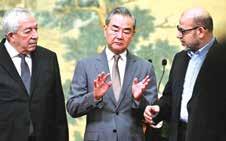
“Today we sign an agreement for national unity, and we say that the path to completing this journey is national unity. We are committed to national unity and we call for it,” Abu Marzouk said after meeting Wang and the other envoys.
Israel criticized Fatah for agreeing to reconciliation with the terror group.
“Instead of rejecting terrorism, Mahmoud Abbas embraces the murderers and rapists of Hamas, revealing his true face,” Foreign Minister Israel Katz wrote on X, referring to the PA president.
“In reality, this won’t happen because Hamas’s rule will be crushed, and Abbas will be watching Gaza from afar,” he added. “Israel’s security will remain solely in Israel’s hands.”
Hamas has said that it doesn’t want to go back to ruling Gaza as it did before October 7. It has called for the formation of a government of technocrats to be agreed up on by the various Palestinian factions. But many are skeptical about Hamas’ intentions.
Also present at Tuesday’s meeting were envoys from Egypt, Algeria and Russia.
According to a joint statement on Tuesday’s meeting, Palestinian Authority’s Fatah and terrorist group Hamas are committed to the creation of a Palestinian state in the West Bank and Gaza, which Israel captured from Jordan and Egypt, respectively, in 1967, during the Six Day War.
Fatah and Hamas have been rivals since Hamas violently routed forces loyal to Abbas’s Fatah in Gaza in 2007, taking over the coastal enclave. Hamas won elections in Gaza in 2006. Fatah governs parts of the West Bank. It is widely viewed by the Palestinian public as corrupt and out of touch, and many resent its security coordination with Israel.

Palestinian Islamic Jihad, a smaller terror group allied with Hamas, issued a statement on Tuesday saying that it still “rejects any formula that includes recognition of Israel explicitly or implicitly” and said that it had “demanded the withdrawal of the Palestine Liberation Organization’s recognition of Israel.”

On Monday, the IDF announced that it had confirmed the deaths of two hostages who are being held by Hamas in Gaza.
Alex Dancyg, 75, and Yagev Buchshtav, 35, were believed to have been held together by Hamas in Khan Younis where they died several months ago, while the IDF was operating there, according to the military.
Dancyg and Buchshtav were abducted by Hamas terrorists from their homes in Kibbutz Nir Oz and Kibbutz Nirim during the massacre on October 7.
The IDF has now confirmed the deaths of 44 of the remaining 116 hostages held by Hamas since October 7. The terror group kidnapped 251 people during the October 7 massacre. Hamas is still holding the bodies of two soldiers since 2014 and two Israeli civilians who entered Gaza in 2014 and 2015.
Hamas in March claimed that Buchshtav had died due to lack of food and medication and Dancyg had been killed by Israeli fire. The claims have not been confirmed by the IDF.
Buchshtav’s wife, Rimon Kirsht Buchshtav, was abducted with him and then released on November 28 in a hostage deal with Hamas. They had been hiding in the safe room in Nirim on October 7. Rimon had texted her family that she saw fire and terrorists shooting “everywhere.”
Yagev was a musician and soundman who built his instruments, including electric guitars. The couple’s safe room also functioned as his laboratory.
The last time Dancyg’s family heard from him was around 8:30 a.m. on October 7, when he was speaking with his
son Mati from his home on Kibbutz Nir Oz, which lies just a few kilometers east of the southern Gaza Strip. Dancyg was a Holocaust educator and an activist for Jewish-Polish relations.
He was born in Warsaw in 1948 to Holocaust survivors. His family came to Israel in 1957. He lived in Nir Oz after he completed his military service and grew peanuts and potatoes there.
Dancyg spent his life educating about the Holocaust and teaching other educators, including Yad Vashem guides as well as Polish educators and public figures, how to teach about the Holocaust. He also led a program for 120 Israeli and Polish schools to meet together during Israeli school trips to Poland.
Dancyg had been recognized in Poland for his pioneering work and received the Silver Cross of Merit from then-Polish president Lech Kaczyński as well as an award from the Polish Ministry of Education.
Murals with the hashtag “StandWithAlex” have been painted in numerous locations around Warsaw since his abduction, and a vigil was held for him and other Hamas hostages in Grzybowski Square in Warsaw on October 16, where a letter written by his son Mati was read.


Last month, U.S. District Judge John Ross of the 8th U.S. Circuit Court of Appeals in St. Louis, Missouri, ruled against the Biden administration’s student debt relief plan, fulfilling the request of several Republican governors to pause the implementation of President Joe Biden’s Saving on a Valuable Education (SAVE) Plan. As a result of that ruling, some of Biden’s debt forgiveness initiative was halted but not all of it.
Last week, Andrew Bailey, the attorney general of Missouri, along with other state attorney generals, requested that
the 8th Circuit block the remainder of the plan. Soon thereafter, the court issued a one-page order in favor of the request, blocking the remainder of the initiative by imposing an administrative stay.
On X, Bailey declared the ruling to be a “huge win for every American who still believes in paying their own way,” adding that Biden’s student debt relief initiative “would have saddled working Americans with half-a-trillion dollars in Ivy League debt.”
The Department of Education “will continue to aggressively defend the SAVE Plan,” a spokesperson said, adding that they would keep borrowers updated about new developments.
The SAVE Plan was introduced in 2022 by Biden, who also pursued a $430 billion initiative that could have canceled around $20,000 for upwards of 43 million U.S. citizens each, a program that was blocked in June 2023 by the United States Supreme Court. On July 1, the SAVE Plan’s implementation was officially supposed to begin. The current administration has said that the SAVE Plan could help more than 20 million borrowers. According to the Education Department, 8 million Americans are currently in the program, 4.5 million of whom have seen their monthly payments decrease to $0. Last Thursday, the Department of Education added that, in all, $5.5 billion of debt had been forgiven for 414,000 borrowers thanks to SAVE.
If the student debt relief plan were put into effect, Americans would have to, over the span of ten years, pay $156 billion in taxes to pay for the plan. However, Republican state attorney generals have alleged that taxpayers would actually have to pay $475 billion.

On Sunday, U.S. President Joe Biden announced that he is dropping out of the 2024 race for the White House. The announcement wasn’t a surprise, as many in his party has been calling for him to step aside as rumors have been swirling about his fitness for office just four months before the election.
During the recent debate between

Biden and former President Donald Trump, the 81-year-old Biden trailed off at times, answering some questions in surprising ways.
Biden said that he plans to serve out the remainder of his term in office, which ends at noon on January 20, 2025.
“It has been the greatest honor of my life to serve as your President. And while it has been my intention to seek reelection, I believe it is in the best interest of my party and the country for me to stand down and to focus solely on fulfilling my duties as President for the remainder of my term,” Biden wrote in a letter posted to his X account.
Biden was diagnosed with Covid last week. He is staying at his Delaware beach house and said he would address the nation in “detail” about his decision.
Biden hasn’t left the American people in the lurch, though. He chose his vice president, Kamala Harris, to run in his stead.
“My very first decision as the party nominee in 2020 was to pick Kamala Harris as my Vice President. And it’s been the best decision I’ve made,” he wrote in a later post. “Today I want to offer my full support and endorsement for Kamala to be the nominee of our
party this year.”
Donald Trump told CNN on Sunday that he thinks Harris will be easier to defeat in November’s election than Biden would have been.
A party’s presumptive presidential nominee has never stepped out of the race so close to the election. The closest parallel would be President Lyndon Johnson, who, besieged by the Vietnam War, announced in March 1968 that he would not seek another term.
“I give you my word as a Biden. I would not be running again if I didn’t believe with all my heart and soul I can do this job,” Biden told supporters at a rally in North Carolina a few weeks ago. “Because, quite frankly, the stakes are too high.”
Biden has been involved in politics for the past 52 years.
Biden won the vast majority of delegates and every nominating contest but one in this presidential race, which would have made his nomination a formality. Now that he has dropped out, those delegates will be free to support another candidate.
The Democratic National Convention is scheduled to be held August 1922 in Chicago.


Right-wing political commentator Lou Dobbs, a well-known CNN and Fox Business Network host, passed away at age 78 last week.
The news was initially announced in a Truth Social post by former president and current GOP presidential nominee Donald Trump. Dobbs’ death was confirmed last Thursday by a statement released on the commentator’s social media accounts.
“It’s with a heavy heart that we announce the passing of ‘the great Lou Dobbs.’ Lou was a fighter till the very end – fighting for what mattered to him the most, [G-d], his family and the country. Lou’s legacy will forever live on as a patriot and a great American,” the statement read.
Dobbs joined CNN in 1980 and was the host of “Lou Dobbs Tonight,” which was originally known as “Moneyline.” He was also, at some point, CNN’s executive vice president and a member of the network’s executive committee. In 2011, his show moved to Fox Business Network, and in 2021, it was canceled in the wake of controversy over claims Dobbs made about the legitimacy of the 2020 presidential election.
Though his family eventually relocated to Rupert, Idaho, Dobbs was born in Childress County, Texas, in 1945. He obtained a bachelor’s degree in economics from Harvard University, after which he was hired for a poverty initiative by the Labor Department. Eventually, Dobbs became a reporter for local Phoenix and Seattle news stations. When CNN was born in 1980, Dobbs joined the network, which he left in the late 1990s. After he left CNN, Dobbs started news website Space.com. In 2000, he came back to CNN until 2009, when he made his final exit from the network.
Dobbs, a Republican who frequently advocated for Trump, moved to Fox Business Network and became embroiled in controversy for his anti-immigration stance and for promoting the idea that former President Barack Obama was not born in the United States, a claim that Dobbs himself said he did not believe.
In 2021, Dobbs, along with a number of other Fox News hosts, was sued for defamation by Smartmatic and Dominion
Voting Systems, two voting machine companies that alleged that Dobbs and others promoted lies about the two companies and the 2020 election. Although Dobbs hosted an episode where he dismissed assertions about the 2020 election being rigged, Fox still opted to cancel the man’s show amid intense backlash.
Since then, Dobbs started “The Great America Show,” which he hosted on his website and iHeartRadio.

During the Republican National Convention, several speakers spoke out about the war in Israel, calling for the defeat of Hamas and for the release of the hostages who have been held in Gaza since the tragic day of October 7.
Ronen and Orna Neutra, whose American-Israeli son, Omer, remains a hostage in the Gaza Strip, gave a heartfelt speech at the RNC.
“He was born in New York City, one month after 9/11. Eight months pregnant, I walked across the Queensborough Bridge toward home that day. And here we are 23 years later, and he’s the victim of another vile terrorist attack,” the hostage’s mother said.
“President Trump told us personally right after the attack when Omer was taken captive. We know he stands with the American hostages,” Ronen Neutra said. In response to the parents’ speech, thousands of people in the crowd chanted in unison, “Bring them home.”
During the RNC, no mention was made of the hostage and ceasefire deal that the Biden administration has supported the adoption of.
Before the Neutras took the stage, Shabbos Kestenbaum, an Orthodox Jewish Harvard graduate who is suing the Ivy League institution for failing to protect Jewish students from antisemitism, spoke to the RNC audience.
“After October 7, the world finally saw what I and so many Jewish students across this country experienced almost every day,” Kestenbaum declared. “Although I once voted for Bernie Sanders, I now recognize that the far left has not only abandoned the Jewish people but the American people.”
The Harvard Divinity School graduate described how his university is filled with antisemitic, anti-religious, and anti-American students and faculty.
“Let’s elect a president who recognizes that although Harvard and the Ivy League have long abandoned the United States of America, the Jewish people never will. Because Jewish values are American values and American values are Jewish values,” Kestenbaum added to loud cheers and applause.
Before Kestenbaum’s speech, a group of University of North Carolina fraternity brothers were recognized for protecting an American flag in April against a mob of pro-Palestinian rioters.
At the RNC, Wednesday night’s theme was foreign policy, with speakers mostly speaking about immigration. During his speech, Lee Zeldin, a Jewish former congressman, denounced Biden and praised Trump on their respective Middle East policies.
Later that night, Trump’s vice presidential pick, J.D. Vance, made a speech calling on the Republican Party to unite. Additionally, Peter Navarro, a former advisor to the Trump administration, spoke just hours after he was released from jail. Navarro had been imprisoned for four months for rejecting Congress’ demands that he give testimony about Trump’s attempts to challenge the 2020 presidential election.

After taking a pummeling in a congressional hearing on the Trump attempted assassination this week, U.S. Secret Service Director Kimberly Cheatle announced her resignation on Tuesday. Her departure comes as lawmakers and an internal government watchdog move forward with investigations into the agency’s handling of Trump’s protection and how a gunman came close to killing the former president and 2024 Republican presidential candidate at a rally in Pennsylvania this month.
Cheatle said in her resignation letter that she made the “difficult” decision to leave the agency “with a heavy heart” and

that she doesn’t want her departure to distract agents from their mission.
“In light of recent events, it is with a heavy heart that I have made the difficult decision to step down as your Director,” Cheatle wrote. She acknowledged that on July 13, the day of the shooting, the agency “fell short” of its mission to “to protect our nation’s leaders.”
President Joe Biden said he and first lady Jill Biden are “grateful” for Cheatle’s decades of public service and will appoint
a new director “soon.”
“As a leader, it takes honor, courage, and incredible integrity to take full responsibility for an organization tasked with one of the most challenging jobs in public service,” Biden said of Cheatle.
Cheatle appeared in front of the House Oversight Committee on Monday and seemed unwilling to answer many of the committee’s questions. Politicians on both sides of the aisle called for her resignation.
During her House Oversight appearance, Cheatle acknowledged that there were “significant” and “colossal” problems with the security at the rally but still rebuffed demands for her resignation.
“I think I am the best person to lead the Secret Service at this time,” Cheatle declared on Monday.
House Speaker Mike Johnson told reporters that the resignation is “overdue.”
“Now we have to pick up the pieces,” Johnson said. “We have to rebuild
the American people’s faith and trust in the Secret Service as an agency. It has an incredibly important responsibility in protecting presidents, former presidents, and other officials in the executive branch, and we’ve got a lot of work to do.”
Cheatle was appointed by Biden to lead the Secret Service in 2022.
In an interview with CNN last week, Cheatle said that the agency was “solely responsible” for the design and implementation of security at the Pennsylvania rally site, where the gunman fired shots at Trump from an unsecured rooftop just a few hundred feet from the rally stage.
A bullet hit Trump’s ear. One person was killed in the shooting. Two others were injured.

Floods triggered by Hurricane Beryl wreaked havoc on Vermont, obliterating crops, destroying bridges and roads, and washing away houses. Exactly a year ago, the state survived another disastrous flood brought about by storms.
“The storm’s torrential rains caused innumerable streams and rivers to flood towns, destroy roads and bridges, inundate farms and ruin crops,” said Republican Gov. Phil Scott. “Many Vermont farms had not fully recovered from last year’s destructive storms before they
were again under water in the middle of Vermont’s short growing season.”
Ninety percent of Joe’s Brook Farm’s crops were destroyed. The farm’s crops also sustained significant damage from floods exactly one year prior to the day when floods once again struck the farm last week. However, the floods caused more damage this year than last year.
“When we got hit twice on the same day two years in a row it’s pretty hard to recover from that,” farm co-owner Mary Skovsted, who owns the farm with her husband, said.
One of the Skovsteds’ friends created a GoFundMe page to raise the funds needed so that the farmers could pay their ten workers until the end of August.
With regard to the flood’s impact on farms in Vermont, Anson Tebbets, the state’s agriculture secretary, said, “We are going to have significant damage. You’re going to have areas that have been hit twice maybe three times in the last year.”
Scott has requested that the U.S. Department of Agriculture officially recognize that Vermont is facing a disaster. If the agriculture department complies with Scott’s request, the federal government will provide financial help to farmers in Vermont. In the meantime, the Federal Emergency Management Agency has been sent to Vermont to determine how much the state has been damaged by the floods.
Sparrow Arc Farm, which grows potatoes on the town of Guildhall’s Connecticut River, lost 36% of its crops, with nineteen of its 52 acres being inundated by water. A few days after the storm hit, Matthew Linehan, a farmer, gave the state’s agriculture secretary a tour of the devastated potato farm. Since the farm was still submerged at

the time, Linehan and Tebbets traveled through the farm on a canoe. Last year, the farm only lost 20% of its crops.
“The crop has just melted into the ground. It’s toast, absolute toast,” Linehan said. “Honestly, in my opinion, two years makes a trend and we’re not going to be planting anything down low next year because I am never going to be in this position again.”
At Cross Farm, 400 chicks were wiped out by the flood, and the farm’s roofs, hay, and fences were also destroyed.

Kids may roll their eyes or groan, but your dad jokes are helping them live a happy childhood.
According to a study published last week in the journal PLOS One, people who were raised by adults who used humor were found to have a better view of their parents or caregivers. They also were more likely to say they have a good relationship with their parents, more likely to say their parents did a good job, and more likely to say that they would use the same parenting techniques as their parents did.
Senior study author Dr. Benjamin Levi, professor of pediatrics and humanities at Pennsylvania State College of Medicine, acknowledged that the study was small but significant.
“This is just the very first of several studies that we’re doing to better understand both how humor was used with children and … what sort of they (the children) took away from that,” he said.
Humor is not just about laughing, Levi maintains.
“It sort of forces you to react differently, which opens up new perspectives and new opportunities,” he said. “That kind of connection can be very (encouraging) for the relationship between the kid and the parent.”
It can also help diffuse sour moods and create a bond between parents and child.

Richard “Dana” Moore loves history. He enjoys scrolling through Goodwill’s online thrift store to find artifacts to purchase and view.
One day, in 2022, Moore came across a post in the historical documents section that featured the image of a framed item claiming to contain a fragment of George Washington’s tent. It came with a written note saying the tent had been displayed at an exposition commemorating the 300th anniversary of the founding of Jamestown in the Virginia Colony.
Skeptical about the authenticity of the fragment, Moore didn’t bid for two weeks. But then, he said, “I jumped in with both feet.”
Moore eventually won the auction with a bid around $1,700. Initially, he didn’t tell his wife Susan about the piece and hid it in his home. But now, Moore realizes that he hit the jackpot: the fragment is actually a piece of George Washington’s dining tent.
Moore contacted the Museum of the American Revolution in Philadelphia in February last year. He knew the museum held Washington’s sleeping and office tent.
Matthew Skic, curator of exhibitions, said the museum was excited but first needed to confirm the fragment was actually a piece of one of Washington’s war tents.
“What’s really fascinating about this particular fragment is it retains some of the red wool trim on the edge of it, and that was telling us that this was likely cut away from the edge of the roof of the dining marquee,” Skic said.
While the museum is still trying to determine which gap the fragment might fill, its binding and hand-stitched linen point to it being the real thing.
The fragment, on loan from Moore, was put on display for public view in February of this year as part of the mu-
seum’s exhibit Witness to Revolution: The Unlikely Travels of Washington’s Tent. The fragment will stay in the museum until January 5, 2025, and then it will be returned to Moore.
During the Revolutionary War, George Washington used tents as his sleeping and office quarters. Over the years, the tents became a symbol of Washington’s leadership and the founding of the country following the Revolution.
Moore is the only known private owner of a piece of Washington’s tent. All of the others are in the Smithsonian and other museums.
The fragment was likely cut off the dining tent by a man named John Burns, who saw the tent on display in Norfolk, Virginia, at the exposition commemorating the founding of Jamestown. The tent itself was on loan from Mary Custis Lee, the great-granddaughter of Washington’s wife, Martha.
Lee’s father, George Washington Parke Custis, later owned the Revolutionary War tents and frequently set them up to host events. Two hundred years ago, he started cutting away pieces of George Washington’s tents as souvenirs.
“It’s the history behind it. Can you imagine the information and the things that were said within that tent?” Moore asked.
Like, “The British are coming!”
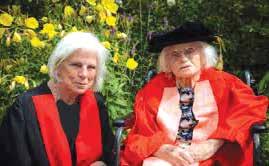
Rosemary Fowler was studying at the University of Bristol in 1948 when she discovered the kaon particle. She was 22 years old.
“I knew at once that it was new and would be very important. We were seeing things that hadn’t been seen before – that’s what research in particle physics was. It was very exciting,” she said.
But Fowler dropped out of the program the next year to raise her family and never earned her doctorate.
Last week, 75 years after she left school, Fowler was awarded an honorary PhD at the age of 98.
Sir Paul Nurse, the chancellor of the University of Bristol, said Fowler “paved the way for critical discoveries that continue to shape the work of today’s physicists, and our understanding of the universe.”
“I’m really pleased for my mother,” daughter Mary Fowler said. “As a child I wanted to be a physicist because it seemed to be so exciting. With both parents being physicists, physics and research was a normal topic of conversation across the kitchen table.”
What did one ion say to the other ion? I’ve got my ion you.

Most lobsters are red, so this crustacean stuck out.
When workers were unpacking a shipment of lobsters in a Red Lobster restaurant in Pueblo, Colorado, last week, one employee spotted a bright orange lobster.
The staff named it Crush after the Denver Broncos’ legendary Orange Crush defense from 1976 to 1986.
“Myself and many of my team are born and raised Denver Broncos fans, so as soon as we saw that orange color, we knew that Crush would be an excellent representation,” said Kendra Kastendieck, the restaurant’s general manager. “And we all want our defensive line to be that good again.”
Kastendieck called the Downtown Aquarium in Denver to see if they would be able to house the rare creature. She packed Crush with ice packs in a plastic
foam container and delivered it to the aquarium on Wednesday.
“As soon as they acclimated him to his quarantine tank at the Denver aquarium, he was very active right off the bat and was really exploring his little area,” Kastendieck said.
Staff had set up a tank with a new generation Denver Broncos helmet on top and an older generation one sitting in the tank “so he can actually climb into it and play around it,” she said.
Genetic mutations can lead to lobsters that are orange, blue and yellow. Downtown Aquarium had one orange lobster previously.
Orange you glad you asked.
Who do you want to be president of the United States comes November? Literally Anybody Else.
A 35-year-old military veteran is running for president. Dustin Ebey legally changed his name to “Literally Anybody Else” to protest major party candidates in the upcoming elections.
The middle school math teacher
wanted to show his distaste for a system that his website states “often prioritizes partisan battles over real solutions.”

Else is running a write-in campaign in Texas, where he did not get the required 113,000 signatures to make it onto the ballot, and is expected to appear by name on the Tennessee ballot, where he said he did get the required amount of signatures.
“It’s not necessarily about drawing attention to my grievances,” Else said, “but about giving a place for anyone who shares these grievances to come together to a focal point.”
Neal David Sutz is Else’s running mate. Originally from New York, Sutz lives in Switzerland.
Who’s on first?








The RNSP has been very busy as of late. What most community members do not realize is that the overwhelming majority of what the RNSP does is hidden from the average member of our community. At least 95% of what we do is without fanfare, lights and sirens, or the involvement of the police. They are the means and methods that we acquire, the pieces of the puzzle that are strategically placed one piece at a time in order to be able to have an arrest made and to make sure that the charges stick. The back-end day-to-day work that we have been engaged in is detailed, patience trying, and meticulous. For example, on a daily basis, we have had and continue to have numerous members out patrolling our communities in their private unmarked cars at all hours of the night and day.
Baruch Hashem, the thousands of hours of grunt work, taking complainant and witness statements, canvassing the community for camera footage, and following up on leads and tips from the community have paid off. We, from the RNSP Shomrim, would like to share some very exciting news with you all.
After many stressful and difficult months and a complex investigation, including multiple covert operations
between the RNSP, NYPD and NCPD, a notorious and dangerous career criminal responsible for hundreds of home burglaries throughout NYC and the 5 Towns has been apprehended and is in police custody. Many of these operations needed to take place on Shabbos which was done under the guidance of our Moreh D’Asrah Rav Tzvi Flaum, shlita. Many of these burglaries have taken place in the Jewish communities of the Five Towns, Far Rockaway and Brooklyn. As of late, most of these burglaries have taken place on Friday nights while you and your families slept in your beds or were away for Shabbos.
There is still work to be done with this investigation, but many of you have been forever affected by this burglary pattern. You have had thousands of dollars in cash and jewelry stolen from your homes, some of you your life’s savings, and many of you and your children haven’t slept a normal night’s sleep since you were victimized in your own homes. It is important to us, the RNSP Shomrim, that you feel safe and secure in your homes once again.
We are working diligently with the NYPD, NCPD and DA’s office, and we will do everything we can to keep this career criminal off our streets for a very long

time.
We thank everyone who worked with us on this investigation over the last 6 months, especially the detectives of the NYPD’s 101st precinct, NCPD’s 4th precinct, and multiple other precincts throughout New York City. The 101 Precinct CO, XO and Special Operations Lt. Ryan Oshea, the 101 Public Safety team, the 101 NCO teams, the NYPD’s Warrant Squad, the Queens District Attorney’s office, our fellow Shomrim brothers throughout NY, and of course the Shomrim wives and families who sit at home while their husbands are out protecting our communities. We would not have been able to get this done without everyone’s involvement and support, and we thank each and every one of you for the care, attention, and assistance that you gave to this case.
Thank you to all of you, our community partners, for all of your trust and support. Thank you for working with us on your most difficult days. We made you a promise that we would put an end to this pattern, and we want you to know that we came through with our commitment. We are here for you.
We hope this gives some closure to the many families who have been through so much difficulty over the last six months.
We hope you and your children sleep better at night, and if there are any recovered items that were stolen from your homes, we can assure you that everything will be returned to you as soon as possible. If there are any community members that have been the victims of a burglary that have not yet come forward, we urge you to please call both us and 911. It is important that each and every crime is reported so that it can be treated with the same level of importance. We have had instances where things that were very valuable were stolen, and the perpetrator covered his tracks but was then seen on someone else’s camera down the block which allowed us to make a positive ID and an arrest to be made. Please never think that a phone call is not important. Every detail helps and is valuable. Never think that you are alone when a crime happens. We at the RNSP are always willing and able to assist in a variety of ways.
We wish everyone a calm, safe and peaceful summer knowing in your hearts that we at the RNSP Shomrim have your backs always! If you mess with our community, we will find you and you will pay for your actions!

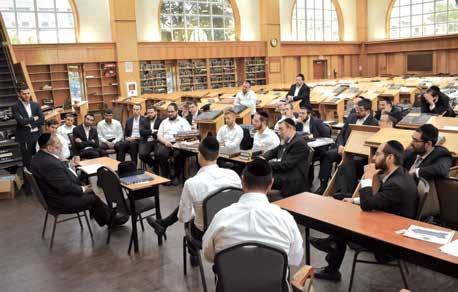
Photo by MHB



The eleventh month and a fantastic and accomplishing school year comes to an end this week at Siach Yitzchok. During the eleventh month, the boys have an amazing afternoon program filled with wonderful trips, swimming, leagues, and best of all the regular morning learning with their all year around rebbe. This week, many classes had a beautiful Siyum Hashana. Rabbi Antbe even brought his fifth grade class to visit Reb Naftali Jager, Rosh Hayeshiva of Sh’or Yoshuv, who has a grandchild in the class, to be farhered on Perek Hakones.


xciting news from the Incorporated Village of Cedarhurst! We’re making incredible progress on one of our most treasured assets – our roadways. We’ve completely repaved Clinton Avenue, Court Avenue, and 5th Avenue from curb to curb, as well as Buckingham Road, Buckingham Court, Albermarle Road, Adelberg Lane, and Rugby Road. Plus, we’ve replaced 2,653 feet of curb and over 1,100 square feet of sidewalks, making this is one of the largest and most impactful paving projects in
our Village’s history, and we’re thrilled to see the transformation!
“Ensuring the safety and enhancement of our Village is a top priority for me and the Board of Trustees. We are dedicated to continuing road and infrastructure improvements while managing the Village’s resources efficiently,” said Mayor Benjamin Weinstock. “We’re excited to announce that the next round of paving is already in the works, with Oakwood Avenue scheduled for August.”
Country Yossi Productions is proud to announce the release of its inspirational new single, “Don’t Be Afraid!”
Geared to all the little kinderlach of Am Yisroel, the upbeat, catchy melody and powerful, uplifting lyrics aim to comfort and reassure a whole generation of innocent children suddenly having to endure and cope with the challenges and difficulties of war related stress and anxiety.
As Country Yossi explains, “As we are confronted daily with the sad and disheartening news from Israel, as well as around the world, we naturally attempt to shield and insulate our precious children from seeing and hearing the graphic images and reports.
“Inevitably though, they hear or sense that something scary is happening and they become frightened. Many have nightmares and suffer other symptoms of stress and anxiety. Indeed, many are currently receiving counseling and undergoing therapy.
“I wrote this song to reassure all of Hashem’s little kinderlach that He loves and cherishes us, is constantly watching over us, and that everything will turn

out fine! Please share this song so we can reach out and give some much-needed chizuk to all our little kinderlach everywhere!
“By the way: we are all Hashem’s kinderlach, and I’m sure we can all use a rejuvenating dose of bitachon as well!”
So please download the song, which is now available on all your favorite streaming platforms, and share it with all your friends and contacts.
You just might uplift someone’s neshama!
Hey, you never know! Am Yisroel chai!













On Sunday,


It is hard to believe that the summer is nearing its halfway point! The MTA building is bereft of its students, so it was time to start visiting the MTA talmidim where many are spending their summers. Visits began last week with a trip to Camp Kaylie and Camp HASC. The MTA talmidim and recent graduates were enjoying Color War at Kaylie, some as campers and others as staff, while the MTA alumni at HASC were hard at work caring for their special campers. Each talmid was given a Summer Swag T-shirt and doughnuts.

Seeing the talmidim living their best summer lives is especially rewarding, as it is known that informal education can play such an important role in the growth of bnei Torah. It brought nachas to those who saw the talmidim in their element and joy to the talmidim who were reunited with teachers and rebbeim. Camp visits will be continuing in the coming weeks. Stay tuned for more…



















































As we wrap up Week 4 at Hillel Day Camp, it’s hard to believe how quickly the first month has flown by. We’ve had an incredible start to the summer, filled with unforgettable memories, laughter, and joy. While we are sad to bid farewell to our first month campers, we are equally excited to welcome those joining us for our second session. New friendships and adventures await, and we can’t wait to create even more amazing experiences together.
The positive attitude of our campers, staff, and parents has truly made this summer special.

Every day is greeted with smiles galore and friendly faces, creating an atmosphere of warmth and kindness. We are incredibly grateful for the letters of thanks we’ve received, and we want to express our gratitude in return. Thank you for trusting us with your children and for being such a vital part of our camp community.
Looking forward to another fantastic month filled with fun, learning, and memories!
Follow the action throughout the week on Instagram @hillel_day_camp

Week four at Avnet Country Day School was a whirlwind of round-the-clock excitement for campers and staff alike. With nine periods a day for over 40 bunks, fun was at an all-time high both on and off campus. Monday heralded the week with amazing trips to Casa de Spin for B1 boys and Adventureland for B2 and B3 boys. Staff got in on the action with an incredible staff night at Top Golf. On
Tuesday G1-G3 girls took their turns at Casa de Spin and Adventureland, and competition began at the first staff intramural sports night. Wednesday was a wow for the G’vaot in B4-5 and Agamim in G4-5 as they embarked on an overnight trip to Club Getaway for two days of outdoor activities. Beat the Bomb was the place to be for team-building challenges for 6-8th grade Harim boys and 6-8th grade Naharot girls. The youngest



Hillel (HAFTR) alumni bonded for a special and meaningful 50-year reunion. Graduates video-called from Israel to partake in the excitement. Sharing memories, catching up, and reminiscing about their time together as classmates made the event an enjoyable and memorable experience for all.

Tipot were entertained on Thursday with a variety of trips to Once Upon a Treetop, Casa de Spin and Planet Play. Friday may have been the end of the week, but it was full-on fun on both Avnet campuses. The fields of the Hirt Family Campus came alive with a petting zoo that enthralled Tipot, B1 and G1 campers. Older campers did not have a moment to rest when they competed in a Ninja Challenge obstacle course on the Lev Shlomo Campus.
“Last week was just a sample of the non-stop adventures we plan at Avnet in the midst of our regular daily programming,” said Daniel Stroock, Camp Director. “Besides all the fun, there were also many opportunities for learning Torah, demonstrating middot and of course building friendships!”
To enjoy more of the Avnet experience, visit @avnethalb on Instagram.

By Mendy Brukirer
In the middle of a sweltering day, I join a group of college students taking shelter in the cool, air conditioned office of Binyamin Ganz of AJ Hollander LLC. The students, participants in an Olami JX professional networking fellowship led by Rabbi Eisemann of Meor NYU, hear of two industries not generally associated with orthodox Jews: tanning hides and trucking. Binyamin speaks of expansion, honesty and being a proud Jew. Lively discussion ensues about profit margins and being openly Jewish.
For most guys, it was their first time on Long Island and this fellowship was the first time they were having conversations with frum businessmen. So why were these group of guys from over five campuses discussing business and Judaism during their summer break instead of chilling at the beach?
They had met for the first time when they arrived in NY for the fellowship after meeting Rabbi E,as he’s known, on
Handshake, a platform which allows students to sign up for internships. The students saw a message about a fellowship focusing on business and Jewish wisdom and grabbed the opportunity to meet entrepreneurs and business owners in orthodox communities in the tri-state.
From AJ Hollander in Inwood, they traveled to Lawrence to meet with partners Yisachar Fenig and JJ Wolfson who shared their story of their e-charging startup. Speaking with enthusiasm, Yissachar shared, “Having the ability to share both my experiences with guys 5-7 years younger who are growing on so many different levels was something I will and do cherish. Sharing what it takes to start our own company and how we see G-d’s involvement daily at the office. Two messages that are parallel and, in my opinion, unmatched. I look forward to meeting with the students again and seeing how they choose to shape their next steps in the work world while clearly growing as Jews.”
The students then traveled to Queens


to meet with Far Rockaway resident and JX board member Dovy Zauderer at the new headquarters for Cross River therapy, a multi-state ABA provider. Dovy shared how he transitioned from accountancy to healthcare and had a candid conversation about his challenges and successes. The students were also offered a challenge where if they commit to wearing tefillin for a hundred days they’d receive Air pods. Dovy said, “It was fascinating to meet the boys in a small, intimate setting and discuss what’s important in life; I could see how they’re on a path of growth.”
The students received swag and headed off to Nechemia Edelstein’s roof in Far Rockaway to meet with community members who had previously discussed getting involved with the new kiruv program at Hofstra, a joint project of JX and Olami. There, they were treated to an amazing BBQ, cold drinks, and “speed dating” where participants shared their professional advice and the students shared what it’s like to be a Jew on campus today. Tzvi Grauman of the W Shul shared, “What a fun and entertaining way for professionals and students to connect and learn from one and other.”
One participant told the author, “I can’t believe the networking opportunities that being part of the Jewish community has given me.”
Two weeks earlier, a group of 11 girls from eight entirely different universities had met with Shmayie Friedman of Platinum Filings and received a hearty lunch and a course on sales followed by Nechemia Edelstein sharing his bootstraps mindset in growing WMS. Meetings with
Rob Kurtz, Sabrina Newman at Yackov Barzideh’s “Jewish Wework” and a BBQ at Sruly Wolfson’s home followed.
The students were constantly wowed by their hosts’ stories and hospitality, instagramming the lunch spread at Platinum and the meats at the BBQ. They were surprised at how willing these successful professionals were to share their acquired wisdom and advice for the students’ careers. It’s been said that when a rabbi gives advice, the student may feel like it’s coming from an ivory tower, somewhat separate from their lives, but when a professional with a career that the students are aiming for speaks of honesty, Shabbos and standing up for Jewish values in the workplace, that’s like hearing it directly from the Al-mighty at Mt. Sinai.
As I’m writing this, it strikes me that no one reading this is even in the slightest bit surprised at the hospitality shown, the precious time given for our brothers and sisters they hadn’t even known existed ‘til this day. This is simply what Jews do for each other – after all, we’re family.
Rabbi Motti Antelis, whose soft launch of Olami Hofstra was a smashing success, joined the networking BBQ in preparation for a similar event he is planning for the end of August for the Hofstra students to network with the community. He mused to me that he’s already seeing so much demand for students that want to get involved in this coming semester and community members who want to host Shabbatons, meet with students on campus and share the beauty of their communities.
Sounds like a match made in Heaven.

L-R: Dr. Irina Gelman, DPM, MPH, PhDc, Nassau County Health Commissioner; Dr. Mimi Knoll, JOWMA CEO; Shelly Schechter, APRN-BC (Director, Division of Community and Maternal Child Health, Nassau County Department of Health); Yael Elias; Dr. Yosefa Schoor Silber; and Sora Lichtman

On Monday, July 15, the Jewish Orthodox Women’s Medical Association (JOWMA) held a life-saving event titled, “CPR at the Beach,” at the Jewish Center of Atlantic Beach. CPR Instructor Mozelle Goldstein, RN, BSN, certified AHA CPR instructor, taught 30 attendees what to do in an emergency and how to stay calm when every second counts.
Mozelle demonstrated CPR techniques for the attendees and shared essential steps for responding to cardiac emergencies and situations where someone’s breathing or heartbeat has stopped. She shared how to recognize cardiac arrest and activate emergency services promptly, how to deliver high-quality chest compressions with correct hand placement, depth, and rate (100-120 compressions per minute), how to manage choking incidents with techniques like the Heimlich maneuver, and understanding different CPR variations for infants, children, and adults. After the class, Mozelle said, ”It was my honor to be able to give a CPR class to the community. Everyone understood the importance and really engaged in the class. Big thanks to JOWMA for sponsoring and supporting community education and
wellness.”
Irina Gelman, DPM, MPH, PhDc, Nassau County Health Commissioner, introduced the event and shared, “CPR is a fundamental lifesaving technique that everyone must learn. Thank you JOWMA and Jewish Center of Atlantic Beach for hosting this important event for Nassau county residents.”
Yosefa Silber, MD, Pediatrician and JOWMA Five Towns Committee member, shared, “JOWMA’s goal is to promote health by bringing cutting-edge health information and skills directly to the Orthodox community. CPR saves lives.”
JOWMA is a 501c3 non-profit founded in 2019 to support a network of Jewish women physicians and to provide health education, outreach, and advocacy on behalf of the Orthodox Jewish community. The organization hosts educational events and programs on a variety of health topics including pediatrics, wellness, women’s health, teen health, mental health, preventative health, and more.
To learn more about JOWMA’s educational programs and events, and to bring them to your community, please email info@jowma.org or visit www. jowma.org.


435 Beis Medrash and Mesivta bachurim of Yeshiva Darchei Torah are enjoying an invigorating four weeks at the Yeshiva’s summer home, Camp Oraysa, outside Woodbourne, New York. Under the guidance of a distinguished staff of rabbeim, they are thriving in their learning, growing in their middos, and recharging their physical and spiritual batteries while completing the summer zman in an environment permeated with kedusha and simcha.


It’s 2:00 AM, early Shabbos morning. I’m in a deep sleep until I hear rustling coming from the corner of the bedroom. It’s my husband. He’s quickly changing into a dark shirt, dark pants and a cap. An inconspicuous outfit, meant to help him blend into the darkness of the night. We had expected this. We knew it was a possibility. His radio is going off now continuously. The “Friday night burglar” was back.
My husband is part of a small group of dedicated individuals who comprise the Rockaway Nassau Safety Patrol, more commonly known as Shomrim. At our Shabbos table, when our guests spot my husband’s radio sitting behind him on the server, they often ask, “What does Shomrim do?” It’s a question with many answers, all of which seem to be insufficient. In short, Shomrim is there to help safeguard community members, their homes and their property. They work closely with local police to prevent and curb crime that occurs within and against the Jewish community of the greater Five Towns, Far Rockaway, Bayswater and West Hempstead areas. This includes everything from stolen bicycles, missing vehicles, hit and runs to attempted child abductions and burglaries by armed criminals. They also are trained in search and rescue of missing persons, both on land, at sea, out-of-state and
even abroad.
Before I get ahead of myself, it’s important to understand that Shomrim members are not cops. The police carry weapons. Shomrim members don’t.
The police arrest individuals. Shomrim members don’t. So what does Shomrim do? They do all the “legwork.” The things that need to get done in order to successfully convict and put criminals away for a long time. The extensive background work, research, following and tracking criminals, hours of surveillance and patrolling, that cops simply don’t have the time, personnel or resources to carry out.
Shomrim gets it done.
The legal system in America is almost as detailed as the legal system of Jewish halacha. There are many “prerequisites” that must be met in order for the District Attorney’s office to successfully convict a criminal and get him into jail for the maximum that the law allows for. “How many witnesses?” “How long did they see him for?” “Was any footage obtained?”
The list goes on and on. Small technicalities in the law that must be met. Most laypeople, including myself, are not well versed in the intricacies of criminal law and are wholly unaware of what’s needed to properly prosecute an individual.
But Shomrim knows. They know exactly what condemning information they need to collect. And they regularly go about


by
gathering such details so that when they do need to engage the cops, the police department is happy to work with them. The cops know that they’ll have a solid case on their hands.
So, there we were, at 2:00 AM Shabbos morning. My husband scurrying around, getting all his gear ready for when his partner’s car arrives. His partner is wearing a bulletproof vest, but my husband is not. Bulletproof vests are expensive. Very expensive. And Shomrim is in need of funds. Nevertheless, my husband goes. He will be at the periphery, while members whose bodies are better protected will move closer. It’s still a risk. I cannot sleep. I go downstairs with him and move into “Jewish wife” mode and pull out my Tehillim. “What if the guy shoots at you!” I find myself saying. More of a statement than a question. “The police are on their way as well. Don’t worry sweetie.”
I say some Tehillim. My husband’s ride is here. I give him a bracha for success and safety. He leaves. I say some more Tehillim praying for my husband’s safety, the safety of all Shomrim members and for the poor Jewish family that this man is in the midst of burglarizing at this very moment. And finally, for the dozens of Jewish homes he has already burglarized with all the trauma and financial loss these families have under-
gone. How horrible. But I compel myself to stop thinking about all this. My kids will need me in the morning and I need to get back to sleep. I finish my Tehillim and go to bed.
It is 5:00 AM, and I am awoken by my husband’s footsteps on the stairs. He is back and exhausted. The “Friday Night Burglar” got away.
It is less than a week later, and Shomrim, along with the NYPD, finally find and catch this criminal. Baruch Hashem. It is another sleepless night for the Shomrim volunteers. My husband was part of the team. So was Shomrim’s “K9 unit,” a German Shepherd trained similarly to police dogs, brought on to help chase down the guy if he attempts to flee by foot.
My heart swells with pride and relief. The end to months of pinpointed crime against our community. But the job for the heads of the RNSP is not done here. They will now work closely with various government offices to ensure this guy gets locked up for the maximum time that they can get. These guys just don’t rest.
Please consider donating to the RNSP who volunteer tirelessly (and often anonymously) to keep you and your families safe. Donate at: secure.merchpay.com/rnsp/



Last week, we kicked off our summer fundraising events with a bang in two incredibly devoted communities. Over 300 people came out to support One Israel Fund at our annual summer BBQs and Fine Israeli Wine tasting events in West Hempstead, New York, and Englewood, New Jersey. An incredible thanks to each of our hosts, Sharon and Alan Shulman and Dr. Lily and Josh Hoffman, for all their hard work and dedication. Thank you for opening your beautiful homes to us.
Significant funds were raised to help support the communities and residents living throughout Judea and Samaria –





our Biblical Heartland. We were fortunate enough to have our very own Eve Harow, director of tourism and education, join us from Israel for both events, as well as serve as a scholar in residence in Great Neck, New York, for the weekend, another one of our loyal communities.
Our guests heard from an array of speakers, including One Israel Fund president, Jacqui Herman, resident of Englewood herself, and executive vice president, Scott M. Feltman, as well as Rachel Pill, CSW, of West Hempstead. Those in attendance learned about the many and varied projects with which
One Israel Fund is involved. These include security, medical, therapeutic, educational, recreational, religious and community development programs. Now more than ever, our steadfast commitment to our fellow Jews is a major factor in the safety and quality of life for Israelis who live in Judea, Samaria, the Jordan Valley, and towns on the southern and northern borders.
Thanks to the support of incredible American donors, over $7 million of crucial equipment was purchased and distributed to these areas since October 7th.
We are grateful to all in attendance,
and of course to our generous sponsors and corporate sponsors. A huge thank you to all of our vendors, and to our caterers Main Event/Mauzone, Oma’s Sushi, and Esprit Events for a beautiful and delicious array of food, as well as the wonderful Israeli wine tasting by Royal Wines and Spruce D’Vine.
To learn more about One Israel Fund and to get involved, you can visit OneIsraelFund.org. Tune in for our upcoming summer BBQs in other communities and for more information on how you can become a partner with us in securing our presence and ensuring our future in the Biblical Heartland.


Martyrdom of Magnificence
Since the history of the first Jewish family, that of Avraham Avinu and Yitzchak Avinu, we have been engrained with unconditional loyalty to Hashem, even at the expense of our own lives.
Martyrdom for Hashem became embedded in the Jewish character when Yitzchak Avinu urged his father Avraham to tie him to the altar so that he could be sacrificed in accordance with Hashem’s command.
David HaMelech writes, “Ki alecha haragnu kol hayom, Because for Your sake we are killed all the time” (Tehillim 44:23). In the Gemara, we are permitted to learn on Tishah B’Av, Chazal (Gittin 57b) give numerous examples of Jewish martyrdom. They first cite the heartbreaking story of Chanah and her seven sons who refused to worship an idol at the command of the Syrian-Greek Antiochus, some two hundred years before the destruction of the Second Beis HaMikdash. Each of her seven sons cited a different pasuk for refusing to worship the idol, and each was brutally murdered.
After her seventh son was killed, Chanah said, “My sons, go and tell Avraham, your forefather, ‘You bound one son [Yitzchak] on an altar [in order to sanctify Hashem’s Name]; I bound seven [sons] on altars [and they all gave their lives to sanctify Hashem’s Name].’”
Rav Elazar Menachem Mann Shach wonders about the purpose of her words. Surely such a righteous woman would not be boasting of her superiority to the holy Patriarch of our people! What, then, was her intent?
He explains that Chanah was certainly not comparing herself to Avraham. On the contrary, she was denying herself the credit for her heroism and that of her children. She was giving credit to Avraham. Her words, far from being boastful, reflected a profound understanding of the source of our nation’s spiritual strength. “Look what you have done for your people!” she was saying to Avraham
with gratitude and awe. “Where did I find the courage and strength to sacrifice my seven sons? It was from you. You bound only one son on the altar, yet through that great, pioneering act of devotion and faith, you forever empowered your descendants to make even greater sacrifices to sanctify Hashem’s Name, such as I have just done with my seven sons.”
The Gemara there cites more subtle understandings of the above verse in Tehillim.
Rabbi Yehoshua ben Levi says the pasuk refers to the mitzvah of bris milah. Perhaps because there is some loss of blood during every circumcision, and the pasuk states, “Ki hadam hu hanefesh, For the soul of the flesh is in the blood” (Devarim 12:23; see also Vayikra 17:11), the act of the bris is thus considered a form of mesirus nefesh.
The following story depicts incredible mesirus nefesh in performing the mitzvah of bris milah
The Bluzhever Rebbe, Rav Yisroel Spira (1889-1989), would often retell an event he witnessed in the Janowska concentration camp.
A group of Jewish men and women were being forced down from an overcrowded train and marched toward a barracks. Nazi soldiers stood by watching sternly as the broken Jews walked past. Suddenly a woman approached a soldier and said firmly, “Give me that knife,” motioning to his bayonet.
The Nazi was only too happy to oblige, as he thought the woman wanted to kill herself. The Rebbe saw the bayonet in the woman’s hand and cried out, “My dear daughter, don’t do it! One never knows when salvation will come. Put the knife away!”
“Rebbe,” the woman answered, “I’m not about to do anything to myself.” She opened the bundle she was carrying and drew out her baby. To the Rebbe’s utter amazement, she recited the bracha of bris milah, and she then circumcised her child. She then cried aloud, “Ribbono shel Olam, You gave me a healthy child; now
I am returning him to You as a kosher Jew!”
That night, both mother and child perished al Kiddush Hashem.
After the war, the Rebbe, with a broken heart, would often tell this story of commitment when he attended a bris ***
A second story regarding bris milah was told to me by the Maggid of Yerushalayim, Rav Sholom Schwadron, who heard it from the Kaliver Rebbe, Rav Menachem Mendel Taub (1923-2019).
In the 1970s, when the Soviet Union was under strict Communist rule, it was forbidden to perform a bris. The punishment for having a son circumcised was immediate firing from work, with the possibility of criminal charges, trials, and perhaps even a jail sentence. For this reason, the great majority of Jewish boys born in the Soviet Union during those years remained uncircumcised.
Nevertheless, some Jews took the risk of gathering a few highly trusted friends and having the bris performed clandestinely. Although a bris should be performed on the eighth day of a child’s life, many times, parents had to wait three weeks, three months, or even six months before they could arrange the risky mitzvah.
For the first few weeks after the birth of a son, parents could almost feel the presence of the authorities, and no hint of a bris could even be mentioned. The family watched not only for officials, but for “friends” who might actually be informers.
In the town of Kirov* along the Vyatka River, there was a “trusted minyan” of people whom the Schleider* family wished to invite to their son’s bris. They were all discreet, dependable, and responsible people. They would never betray a family and no police authority could obtain any information from them. Often, it was one of these men who advised the family when it was “safe” to have the bris.

back to the room where his mother was waiting for him. Suddenly there was a piercing scream, a wail, and a cry. There was a loud thud. People ran to the room and were shocked to see that the mother had fainted. After they revived her, she explained.
The young mother had feared that her son might never have a bris, that she would be lulled into negligence because of her fear of the authorities, that she might capitulate to fear and never have her baby circumcised. She was determined not to let that happen and she made a vow that would compel her to long for the bris, so it would be paramount in her mind at all times. She vowed not to kiss her son until he had had his bris.
For close to a year, she suffered the pent-up emotions that only a mother can feel. Finally, after the bris, she took her son into her loving arms and kissed him fervently.
Did you know?
The Schleider baby was almost a year old, but he had not yet been circumcised. After a long wait, the atmosphere became a bit less tense and the Schleiders were informed that it was safe to have the bris. The mohel was called, the guests gathered in a basement, and the child was brought in.
The bris was performed, the blessings were recited, and they all wished each other mazal tov. The baby was brought
Overcome with emotion, she fainted. Perhaps, then, the pasuk of “Ki alecha haragnu kol hayom, Because for Your sake we are killed all the time, can be understood homiletically”: This courageous woman, who deprived herself of the pleasure and delight of kissing her baby for so many months, despite feeding him, holding him, and dressing him, was “killing herself” just for the sake of the mitzvah of bris milah.
*Names were changed
Reprinted from From Sorrow to Celebration by Rabbi Paysach Krohn with permission from the copyright holder, ArtScroll Mesorah Publications.
















For eight years, when George W. Bush was president, the world feasted on Bushisms. If these word salads by Vice Pres. Harris are an indication of things to come, there will be many Kamalisms to enjoy in the near future.

“So Ukraine is a country in Europe. It exists next to another country called Russia. Russia is a bigger country. Russia is a powerful country. Russia decided to invade a smaller country called Ukraine. So, basically, that’s wrong.”

“We will work together and continue to work together to address these issues, to tackle these challenges, and to work together as we continue to work, operating from the new norms, rules, and agreements that we will convene to work together on to galvanize global action.”

“The governor and I, we were all doing a tour of the library here and talking about the significance of the passage of time, right, the significance of the passage of time. So, when you think about it, there is great significance to the passage of time in terms of what we need to do to lay these wires. What we need to do to create these jobs. And there is such great significance to the passage of time when we think about a day in the life of our children.”

“We got to take this stuff seriously, as seriously as you are because you have been forced to have taken this seriously.”
Yankel, who is very elderly, is driving when he gets a frantic call from his wife: “Yankel, please be careful. I just heard on the news that there is a crazy driver on Route 55 driving the wrong way!”

“It is time for us to do what we have been doing. And that time is every day.”

“I was born realizing the flaws in the criminal justice system.”

“I love Venn diagrams. I really do, I love Venn diagrams. It’s just something about those three circles and the analysis about where there is the intersection, right?”


“Culture is — it is a reflection of our moment in our time, right? And in present culture is the way we express how we’re feeling about the moment.”

“So, I think it’s very important, as you have heard from so many incredible leaders, for us at every moment in time — and certainly this one — to see the moment in time in which we exist and are present, and to be able to contextualize it, to understand where we exist in the history and in the moment as it relates not only to the past but the future.”

Yankel replies, “Honey, I hate to break it to you, but it’s even worse than what they’re reporting; I’m on Route 55 and, let me tell you, they’re all driving the wrong way!”
1. What is Pres. Biden’s middle name?
a. Robert
b. Robinette
c. Roger
d. Ronald
2. In what year was Joe Biden first elected to the U.S. Senate?
a. 1967
b. 1972
c. 1976
d. 1984
3. Joe Biden first ran for office in 1988. Why did he end his campaign?
a. Because he received 3% of the vote.
b. Because he was caught plagiarizing some of his campaign speeches.
c. Because he got Covid.
d. Because he decided to spend more time with his family.
If you throw me from the window, I will leave a grieving wife. Bring me back, but in the door, and You’ll see someone giving life!
What am I?
4. What state did Joe Biden represent in the senate?
a. Michigan
b. Delaware
c. New Hampshire
d. Colorado
5. What type of doctor is Dr. Jill Biden?
a. Pulmonologist

b. Doctor of Education in Educational Leadership (did Kamala create this degree?)
c. Psychologist
d. Physiologist
6. How much did then-Vice President Biden’s son Hunter get paid to be on the board of a Ukrainian energy company, even though he had no experience in energy?
a. Nothing, why would anyone

pay someone without experience to be on the board of an energy company?
b. $5 million
c. $100,000
d. $450,000
Answers

Wisdom key
5-6 correct: Sorry that your guy was forced out of the race by the machine.
2-4 correct: You are a B student, but don’t give up – you can still be president someday.
0-1 correct: Joe, come on, man! Look, you could do better, man! This is a bunch of malarky!
The letter N. wiNdow - widow door - doNor
Answer:
The L-rd promises Pinchas that most valuable and yet the constantly elusive gift: the blessings of the covenant of peace. The world has known very little peace over the long millennia of human existence. Strife and conflict, war and violence, have been the staples of human existence from time immemorial. Many historians and social scientists maintain that war and violence are the natural and constant states of human affairs. So the promise of peace to Pinchas seems to be a little extravagant, especially since it appears that Pinchas has earned this reward of peace by committing an act of violence and war. Shall we say that a time of peace is merely the absence of war; a negative state of being that only marks the interregnum between wars and continued violence?
We are all well aware how difficult it is to achieve peace and how fragile its existence is when, apparently, it is somehow achieved. Its fragility is attested to in the Torah, where the vav in the word shalom is broken and incomplete. So, we may certainly wonder what actually and practically G-d’s promise

By Rabbi Berel Wein

to Pinchas was – and how was it ever to be fulfilled. This perplexing issue is especially pertinent regarding Pinchas himself, who participated in the wars that Israel conducted against Midian and later against the Canaanite tribes in the Land of Israel during the times
Many of the commentators to the Torah defined G-d’s promise of peace to Pinchas and his descendants as being a personal and individual state of inner being, of what we colloquially call “being at peace with oneself.” Pinchas is undoubtedly disturbed by the act of
Pinchas acquires, through G-d’s blessing, the peace of mind and the necessary confident inner conviction of having committed an act that Heaven and history will deem to be justifiable and correct.
of Yehoshua and the Judges. Where is the promise of peace present in the life of Pinchas himself, let alone in the lives of the future generations of his descendants particularly and the Jewish people generally?
violence that he committed and by the widespread criticism of his actions by many of the Jewish people at that time. Nevertheless, the L-rd tells him that he did the right thing and that history will later thank him for his boldness and
alacrity in stemming the tide of immorality that threatened to overwhelm the Jewish people. So Pinchas acquires, through G-d’s blessing, the peace of mind and the necessary confident inner conviction of having committed an act that Heaven and history will deem to be justifiable and correct, even if it is currently unpopular in the eyes of much of society.
President Harry Truman is reported to have said that he lost little sleep over the atomic bombing of Japan which concluded World War II because he believed that he saved millions of American and Japanese lives by his awesome decision. He never again agonized over that decision since he had achieved an inner peace regarding the matter. Our conscience always disturbs us when we make wrong decisions and pursue failed policies. It never rises to plague us when we have behaved correctly and decided wisely and morally. It is this blessing and reward that the L-rd bestowed upon Pinchas and his descendants – the blessing of inner peace and moral contentment.
Shabbat shalom.

The pesukim (Bamidbar 25:11-12) contain a seeming contradiction: “Pinchas the son of Elazar, the son of Aharon the kohein turned My anger away from the children of Israel by zealously avenging Me among them so that I not destroy the children of Israel in My jealousy. Therefore, I say, ‘Behold I give him My covenant of peace.’” How does Hashem’s characterization of Pinchas as a zealous avenger of His honor square with the presumably appropriate blessing of peace?
Kohanim –Loving or Exacting?
Chazal speak about the personality traits of kohanim in many places. The Mishna (Avos 1:12) says, “Be among the students of Aharon, loving peace, pursuing peace, loving every person and drawing them close to Torah.” Similarly, the Navi (Malachi 2:6) says about the personality of the kohein, “In peace and uprightness he went with Me, and he brought back many from sin.” Kohanim are known as being so humble that according to the Gemara (Kiddushin 70b), if one finds a kohein who is brazen and lacks shame, it is doubtful whether he is truly a kohein. Every time the kohanim bless the Jewish people, he make the blessing, “Who has sanctified us with the holiness of Aharon and commanded us to bless His people Israel with love.”
On the other hand, the Gemara also says (Bava Basra 160b) that kohanim are generally very exacting in their dealings with others. And Levi, the progenitor of the kohanim, (along with Shimon) avenged the horrible mistreatment of his sister Dina by Sehchem, saying (Bereishis 34:31), “Shall our sister be made into a harlot?” And it was the tribe of Levi who answered the call (Shemos 32:26), “Whoever is for Hashem, come to me!” They heeded Moshe’s re -

By Rav Moshe Weinberger
Adapted for publication by Binyomin Wolf

quest and slaughtered thousands of other Jews who participated in the worship of the Golden Calf. Even in the daily life of the kohanim in the Beis Hamikdash, they were constantly involved in slaughtering the sacrifices, catching blood, carrying blood, and sprinkling blood. Their lives were surrounded by blood. At the time of the Greek occupation of Eretz Yisroel, it was the Chashmonaim, the kohanim, who would no longer tolerate the degradation of the Jewish people and led an ultimately successful revolt against the Greeks.
On one hand, the kohanim are associated with peace, love, and blessing. And on the other hand, they are associated with blood, zeal, vengeance, and an exacting nature. How do we reconcile these two conflicting descriptions of the personality of the kohanim?
Pinchas and Eliyahu
It is known (Zohar Ki Sisa 190a) that Eliyahu Hanavi has the same soul as Pinchas. But this connection is fraught with
apparent contradictions as well, as illustrated in the piyut we sing after Shabbos about Eliyahu Hanavi: “The man who was zealous for Hashem’s sake; the man for whom peace was announced through Yekusiel [Moshe Rebbeinu].” Eliyahu was known as a very strong zealot in Navi. Because of the Jewish people’s sins, he decreed a famine in Eretz Yisroel (Melachim I 17:1). He also personally slaughtered 400 prophets of the Baal (ibid. at 18:40). And when a captain and fifty men were sent by Achazia to capture Eliyahu, he called forth a fire from Heaven which burned all of them alive (Melachim II 1:10). Eliyahu Hanavi was an uncompromising zealot for the truth and radiated a sense of great awe and fear. Eliyahu even said about himself, (Melachim I 19:14) “I have been zealous for Hashem.”
Yet on the other hand, the last prophet in Tanach (Malachi 3:23-24) tells us that at the end of days, it will be Eliyahu who will come and “turn the hearts of the fathers back through their children and the hearts
of the children back through their fathers.” This Navi who is otherwise known as the ultimate zealot will bring peace between the generations and, in his prior life as Pinchas, was blessed with peace. How do we reconcile this apparent contradiction in the characterization of Pinchas/Eliyahu as both a zealot and a bringer of peace?
The reality is clearly that the two seemingly opposite characteristics of love/peace and zealousness/jealousy are not contradictory at all. The pasuk in Shir Hashirim (8:6) says, “Place me like a seal upon your heart because love is strong as death, jealousy is as powerful as the depths, its coals are like coals of fire, the flame of G-d.” True zeal and jealousy are the natural result of love.
The Midrash (Shir Hashirim Raba 8) says that “Hashem loves you” and goes on to explain the pasuk as follows: “‘Love is strong as death’; in the future, the Holy One will avenge Zion with great jealousy, as the pasuk (Zecharia 8:2) says, ‘Thus says Hashem, I have become jealous of Zion with a great jealousy.’” Real love naturally results in jealousy when someone from the outside drives a wedge between two people who love each other or if someone attempts to or actually succeeds in hurting one of them.
The Zohar (Vayechi 245a) says, “The love of a person that is not accompanied by jealousy is not love.” If one is not bothered when someone he or she loves is hurt, it is a sign that the person does not love that person at all.
The Ramchal describes the relationship between zealousness/jealousy and love in the life of a pious Jew as follows (Chelkei Hachassidus): “It is obvious that if one loves his friend, he cannot tolerate seeing another hitting him or denigrating
him. He will undoubtedly go out to assist him. So too one who loves the Name of G-d cannot tolerate seeing people desecrate It, G-d forbid…”
It is therefore clear that the root of jealousy and zealousness is a love that does not allow one to be indifferent or apathetic to the subject of his love. This love is why the Torah (Bamidbar 5:14) describes the reaction of a husband whose wife has secluded herself with another man by saying, “And a spirit of jealousy came upon him and he became jealous of his wife.” This is why the kohanim, Pinchas, and Eliyahu, who had such great love for Hashem and for the Jewish people, are also known as being zealots.
Expressing this idea, the Sfas Emes explains that the pasuk (Bamidbar 25:7), “And he took a spear in his hand” as follows: The root word for spear, ramach, has the same letters as the Aramaic word for love, rachimusa. Pinchas killed Zimri and Kozbi, but his entire motivation was a love for Hashem and the Jewish people and a desire that the relationship between them not be defiled.
Hashem loves us and that is the source of His “jealousy.” It is as if Hashem is telling us (Amos 3:2), “You are the only one I love of all of the families of the earth.” This
is reflected in halacha as well. According to most poskim, shituf, believing in Hashem along with some other power, is not punishable, and is perhaps even permissible, for non-Jews. But it is forbidden and punishable for Jews. Hashem’s love for us is so great that He lets nothing come between us. But His relationship with the nations of the world is more distant, such that if they engage in shituf, it does not shake that
inserted him or herself between the two. In Pinchas’s time, there were those who stood by and were able to tolerate those who brought idolatry and immorality into our relationship with Hashem. They were complacent. But Pinchas was not one of them. Like the old song says, “I only have eyes for you.” Pinchas realized our relationship cannot be with anyone “other than Hashem alone.” That is why the Navi (Malachi
His entire motivation was a love for Hashem and the Jewish people and a desire that the relationship between them not be defiled.
relationship to the same extent. There is simply not as much intimacy there.
Hashem describes Himself (Shmos 20:5) as a “jealous G-d.” That is why He says (Shemos 22:19) that we may not sacrifice to anyone “other than Hashem alone.”
Our relationship with Hashem is like a loving husband and wife. Of course, one of them would be jealous if someone else
2:5) says about Pinchas/Eliyahu, “My covenant of life and peace was with him.”
Kohanim also come from a perspective of great love, and depending on the circumstances, that love expresses itself in different ways. As we see with Eliyahu Hanavi, an intolerance for those who would hurt our people is the only way to achieve true peace.
With this in mind, we can appreciate the words of the piyut we sing after Shabbos: “A Tishbite man will save us from the mouth of the lions.” It would be too much of a compliment to the Hamas terrorists to call them “lions,” but with Hashem’s help, the Israeli Defense Forces will save our people from the rockets fired by the Hamas cockroaches in Gaza.
May Hashem keep everyone in Eretz Yisroel safe, may He protect the soldiers in the Israeli Defense Forces, and may he make them successful in rooting out the terrorist infestation in Eretz Yisroel. And then, with G-d’s help, we will merit to see the fulfillment of that which we sing in the piyut: “He will announce good news for us, he will cause the sons to rejoice over the fathers after Shabbos… Fortunate is one who sees his [Eliyahu’s] face in a dream, fortunate is he who merits to greet [Eliyahu] with ‘Shalom,” and who [Eliyahu] answers with ‘Shalom.’ May Hashem bless his nation with peace.”
Rav Moshe Weinberger, shlita, is the founding Morah d’Asrah of Congregation Aish Kodesh in Woodmere, NY, and serves as leader of the new mechina Emek HaMelech.

By Rabbi Avrohom Sebrow
Last week’s article generated comments from readers, especially since the article ended with a statement that a blech was recommended for the use of a crockpot on Shabbos. In general, these articles are intended to engender discussion and are not meant as final rulings.
The article mentioned two potential issues with using a crockpot for cholent: Hatmana, insulating, and shehiya, leaving food on a fire when Shabbos starts. These are two separate rabbinical decrees. However, the reason behind them is the same. Chazal feared someone might forget it was Shabbos and stoke the coals to increase the flame. Typically, shehiya would have been in the same place the food was cooked. The food is cooked in an oven and left there when Shabbos starts. Hatmana was typically performed by removing the food from where it was cooked and insulating it in a heat-producing medium. With crockpots, Rav Shlomo Zalman held that hatmana could be accomplished in the very pot where the food was cooked. Indeed, some of those who disagreed with him reasoned that since putting food in a crockpot is a normal way to cook, it cannot be deemed hatmana. However, the article didn’t delve into the issue of shehiya. (See Shabbos 36b). In Talmudic times, it was common to leave food on a flame that was lit before Shabbos. Indeed, it is a mitzvah to have warm food on Shabbos. Since one could not add fuel to the fire on Shabbos, the fire would eventually diminish and perhaps go out at some point over Shabbos. There was a very real possibility that someone might mistakenly stoke the coals on Shabbos. However, to decree that no food may be left on a fire would make it difficult to have hot food on Shabbos. Chazal therefore gave two options to permit one to leave food on a fire over Shabbos. One way is to remove the coals from the oven. The oven still will stay warm for a while. The second is to throw some dirt or ashes on the flames to smother them somewhat. This diminishes the heat of the oven. This

actively demonstrates that one does not want a hot fire. Therefore, this will serve as a concrete reminder to not stoke the coals on Shabbos.
The problem is how to apply those options to crockpots. The first option is not at all possible. There are no coals to remove! The second option is also not applicable – throwing some dirt in the crockpot will not accomplish anything.
knobs of the stovetop and not use a blech. That is a new third option not specifically permitted by Chazal.
How can one fashion a blech for a crockpot? Some poskim have suggested lining the interior of the crockpot with aluminum foil. However, others contend that the foil will not diminish the heat reaching the insert and accomplishes nothing. Some have therefore suggested
In Talmudic times, it was common to leave food on a flame that was lit before Shabbos.
On a stovetop, it has become standard practice to use a blech, a sheet of heavy metal. This is akin to the second option. The blech reduces the amount of heat that reaches the pot from the fire. Some heat is lost due to the use of the blech. As a bonus, the blech usually covers the stovetop knobs as well. This cover will serve as a reminder as well not to adjust the flame on Shabbos. However, many poskim were hesitant to permit one to simply cover the
using heavy-duty aluminum foil or multiple layers of regular foil to line the interior of the crockpot. Poskim have suggested covering the knob as well.
Rav Reuven Feinstein, shlita, ruled that regarding a crockpot, one can be lenient and simply cover the knob without any lining (as related to this author by Rav Yehuda Leib Gold). Rav Moshe Heineman, shlita, ruled similarly and said that was the psak of Rav Aharon Kotler, zt”l.
Another issue must be addressed. When does shehiya apply? The Shulchan Aruch (OC 253:1) states that it applies to any food left on a fire that is still “improving.” Since the food is still improving, Chazal feared one may stoke the coals on Shabbos. However, the Shulchan Aruch then cites a second opinion with the prefix, “Some say.” This second opinion holds that food that was already half-cooked may be left on a fire without any blech. The logic is that since the food is already partly cooked, one will not come to stoke the coals. Presumably, there is often enough heat left to finish the cooking process without stoking the coals. The Rema notes that the custom is to follow this second lenient opinion. The Kaf HaChaim notes that Sefardim were likewise lenient and followed this second opinion as well. More recently, the Chazon Ish sanctioned following this lenient opinion. Therefore, if the food in the crockpot is at least halfcooked, no blech is required.
The Mishna Berura, however, advises but does not rule that one should follow the first opinion as well. Therefore, he suggests using a blech even for fully cooked food.
Therefore, if the food in the crockpot is at least half-cooked by the time Shabbos starts, according to the letter of the law, no blech is required. Those who follow the Chazon Ish do not need to be machmir. Those who follow the advice of the Mishna Berura should attempt to be machmir and use a blech even in this situation. What constitutes a blech? According to some, regular foil is adequate. Some suggest heavy-duty aluminum foil. In addition, one should cover the knob as well. Some poskim suggest that simply covering the knob of the crockpot is sufficient.
Rabbi Avrohom Sebrow is a rebbe at Yeshiva Ateres Shimon in Far Rockaway. In addition, Rabbi Sebrow leads a daf yomi chaburah at Eitz Chayim of Dogwood Park in West Hempstead, NY. He can be contacted at ASebrow@gmail.com.
By Prof. Adina Broder
On Tisha B’Av, when we mourn the loss of the Beis Hamikdash, we are compared to an aveil Both avelius and Tisha B’Av have periods of grief associated with them. The aveil goes through shiva, shloshim, and twelve months of mourning. Each stage has decreased levels of restrictions, giving the bereaved time to express his anguish while easing him back to regular life, one without his loved one.
Tisha B’Av’s stages work the opposite way – and with good reason. Since Tisha B’Av represents mourning over a historical tragedy, our feelings of bereavement don’t occur spontaneously. Instead, we need to cultivate our grief in stages, starting with the Three Weeks, then the Nine Days, and finally Tisha B’Av itself. Each period is more restrictive than the previous one. The increasing physical deprivations are intended to trigger intensifying feelings of sadness so that by Tisha B’Av we genuinely feel the loss of the Beis Hamikdash.
These stages prior to Tisha B’Av can help us understand a Gemara that compares the months of Av and Adar. We are told that in Adar, when Purim is celebrated, we should increase our happiness, but as Av approaches, our happiness should be reduced. The Gemara isn’t comparing Purim and Tisha B’Av, but rather the time leading up to those observances. Just as we prepare for Purim, so too we are instructed to spend the days heading into Tisha B’Av priming ourselves for the day. In both cases, the intense emotions we are meant to experience – while on opposite sides of the spectrum – won’t come about instantly when the date of the holiday arrives but needs to be developed in the period prior to that.
To help prepare for Tisha B’Av, we can look to some of the messages behind the kinnos that we recite on that day. The first kinnah says that Hashem allowed the Jewish people to be pursued

by their enemies because the Jews engaged in sinas chinam . What exactly is this sin of “baseless hatred”? People usually don’t have animosity towards someone without cause.
According to our rabbis, the term “baseless” here doesn’t follow its colloquial meaning. It doesn’t refer to hating someone for no reason; it means hating someone without having a valid, Torah-sanctioned reason. According to the Torah, we are only permitted to hate someone if that person is a rasha –meaning someone who sins out of spite, transgresses the most serious of sins, or incites others to violate the Torah. If we hate anyone other than a rasha , it is considered without a valid cause. This includes people who have different hashakfos than us, or whose personalities we don’t like, or even those who have slighted us. According to the Torah, none of these are permissible reasons to act with hatred towards another person.
That explains the word “chinam ” – baseless. Now let’s turn to the word “sinah” – hatred. We might think that hatred is manifested only with the most
egregious behavior towards someone. But this is not the case. The Gemara in Sanhedrin tells us that refusing to speak to someone for three days is considered sinah . It might be self-evident but it’s worth mentioning that if simply ignoring someone is considered sinas chinam , then all the more so is speaking disparagingly, callously, or discourteously to him.
The sin of baseless hatred isn’t a minor offense. Sinas chinam is equated with the three cardinal sins and was the cause for the destruction of the 2nd Beis Hamikdash. Given the severity of this aveira, we need to know how to combat adverse feelings that we might have towards someone.
The following are three suggestions to help us change negative feelings into positive ones.
First, we can focus on the good qualities that the person has, even if it’s just one good character trait. By concentrating on the person’s positive attributes, you can come to appreciate him and even feel love towards him.
Second, Rav Dessler notes that our
external actions affect our inner feelings. Therefore, he advises that to remove negative emotions you feel towards someone, do acts of kindness for him. The more you give to the person, the more love will be generated.
The third approach is based on the pasuk that says: “Don’t hate your brother in your heart; you should surely rebuke him.” This pasuk contains two mitzvos: mitzvah #1 not to hate someone, and mitzvah #2 to inform someone about his wrongdoings. These two mitzvos are not unrelated; rather the second mitzvah is instructive on how to fulfill the first. The way to avoid hating someone is by communicating that he hurt you. Often, we choose to avoid confronting those who have offended us. However, unaddressed feelings of pain often fester, allowing discord and hatred to develop. Therefore, the Torah commands us to tell someone how he wronged you, rather than letting bitterness grow in the silence. By gently explaining why you are hurt, the issue can be resolved and the relationship can be repaired.
If we do our best to eliminate sinas chinam , we cannot only have healthy, loving relationships but also merit the speedy rebuilding of the Beis Hamikdash.
For more inspiration during the 9 Days, please listen to my upcoming 2024 audio series: Mourning with Meaning, from the OU Women’s Initiative.
Professor Adina Broder, MS, JD, is the author of Meaningful Kinnos, Meaningful Viduy and Viduy Booklet for Kids She is a professor at Touro Graduate School of Education and a Judaic Studies teacher at the Hebrew Academy of Nassau County. Prof. Broder is a frequent presenter for the OU Women’s Initiative, where she has an upcoming series for the Nine Days.
My favorite spot for early morning coffee is sitting on my porch; I have grown very comfortable on my daughter’s cozy, cast-off IKEA couch listening to the sounds of the block. I think I am going to change my ramblings to “Porch Thoughts.”
Thinking about it…no rush anymore.
A realization that has dawned upon both of us this week is that Israel respects her old and her soldiers; in many ways, seniors need to become soldiers as they battle for being taken seriously. More than once have we been told as we schedule the dozens of appointments Nefesh B’Nefesh has listed for us to arrange, “We waive wait times or accommodate our seniors and soldiers.”
When did I become a “senior”? I’m not about wrinkles and coloring my hair; it’s been gray since it chose to be. I am often referred to as “the lady with the white hair”; I’m good with it. Behind my “getting lighter in color hazel eyes” is the fun-loving, sometimes serious, always cynical person I have always been. For the past several years, I have been the oldest “teacher” in the building. It has never bothered me, as my opinions were respected and what I had to offer mattered.
Every summer, Jerusalem hosts a film festival in Sultan’s Pool (and other venues). It is a huge amphitheater in the center of town. For those familiar with the city, it is near the Mamilla Mall. It is a huge oxymoron that there is a modern movie held in the bowels of an ancient venue. The opening film was Thelma; a film about a 93-year-old lonely widow who is scammed by a ruthless caller pretending to be her beloved grandson into thinking her grandson is in grave danger unless she bails him out with $10,000 in cash, now!
So much resonated with us. My husband Bob makes a game of responding to the multiple calls requesting help for one of our grandsons. For some reason, it is always about the boys. One call went

By Barbara Deutsch

something like this:
Caller: “Hello, Grandpa, I’m in trouble. I got into a car accident. They say it’s my fault, and now I’m in jail.”
Bob: “I don’t recognize your voice, which grandson are you?”
Caller: “You don’t recognize my voice, Grandpa. I was in an accident, I got hurt.”
that so many of her contemporaries are either gone or disabled resonated with our friends, my husband, me, and the entire audience.
Israel has somehow figured it out that seniors need support for the limitations that come with the blessings of growing older. We pray for arichat yomim, old
Israel has somehow figured it out that seniors need support for the limitations that come with the blessings of growing older.
Bob: “Just tell me your name and I will do what I can for you!”
The caller hung up.
Spoiler alert: Thelma sent the money and spent the rest of the movie getting it back.
Sitting under the cloudless Jerusalem sky laughing at Thelma’s trials and tribulations, difficulty walking, not being taken seriously, spoken to like one would to a child, being humored and learning
age, but from what I have witnessed –thankfully, not personally – there is very little patience or time to accommodate their needs.
Most days, this first week, we have been sitting in general waiting rooms for the health kupa, the bank, the bus pass, Rav kav (free for seniors), etc. Next week, we are busy with appointments almost every day; some are at home and others in town.
We have been cautioned numerous times to be patient and to keep our expectations at a minimum if we hope to survive the bureaucracy that is life in Israel. With Nefesh B’ Nefesh as your support, as soon as you land, you get an identification number that links you to every single thing you need or want in Israel, from the necessities to the luxuries. Of tantamount importance are the health plan and the zechuyots, benefits. Without that number, there is access to nothing. You need to set up a bank account. Without an identity card, you can’t get a bank account. Without a bank account, you can’t get a Israeli credit card. Without that, you can’t get a water cooler (tap water is eh).
Every need requires an appointment.
When we got no response to our calls nor online requests, we made an in-person appointment, which was “okay, come tomorrow at 4.” Note, do not make the mistake we did and try to contact or visit any “appointment” between 1 and 4 or after 6 p.m.
At the bank, we waited to be seen though we came for our designated appointment time. We were lucky to work with a nice and helpful person. We opened an account, and when we wrapped up, we wanted to deposit some money. “Oh, we don’t do that. Deposits are made in a different branch. We have no cashier.”
“What do you mean? Isn’t this a bank?” we asked.
“This is Israel!” he responded. We are seniors and had run out of patience or energy.
Mrs. Barbara Deutsch is currently the associate principal at HANC 609 and a longtime reflective educator, parent, grandparent, and new great-grandparent. Even after all these years, she still loves what she does and looks forward to working with kids every single day.
By Gedaliah Borvick
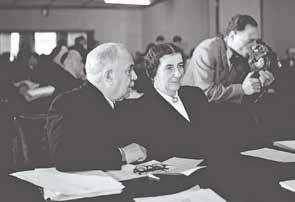


Irecently scheduled a meeting with clients at Jerusalem’s First Station, and I sent them the address David Remez 4. When we met, our client asked if I knew anything about Remez. I recalled seeing his name in several books about the Yishuv (the pre-state Jewish community), but I never grasped how vital a role he played in establishing the State of Israel.
What did David Remez accomplish to merit having half a dozen streets across the country and a Haifa neighborhood named in his memory?
David Remez was born in 1886 in Belorussia, now known as Belarus. He studied law in Constantinople, Turkey, where he met David Ben Gurion and future president Yitzhak Ben Zvi, in what was to be a lifetime relationship. Newly married, Remez moved to Ottoman Palestine in 1913 and soon thereafter dove headfirst into politics, dedicating his life to creating the Jewish state.
A Renaissance man, possessing many talents and areas of knowledge, Remez achieved so much in his career: From 1921 to 1929, Remez was the director of the Public Works Office of the Histadrut, the powerful workers union, and headed the national construction company, later
known as Solel Boneh, which purchased land and built housing projects. He was a founding member of Ben Gurion’s Mapai party and served on Tel Aviv’s city council from 1921 to 1925. Starting in 1930, Remez served for many years as Secretary General of the Histadrut and founded
struction of 10 bridges, and spent several months in the Latrun detention camp.
Once the State of Israel was declared in 1948, Remez became the first Minister of Transportation. In this capacity, he opened Lod (later renamed Ben Gurion) Airport and also helped create the
A talented linguist who valued wit, puns and brevity, some of his most famous speeches were only one sentence long.
many subsidiaries, such as Zim Shipping and the Mashbir department stores.
From 1944 until 1948, Remez was chairman of the Va’ad Leumi, the Jewish National Council, which was the shadow government of the Jewish community and the official representative of the Yishuv to the British Mandate government. Owing to his influential position, Remez was one of 2,700 Jews arrested by the British authorities on “Black Saturday” June 29, 1946, in response to the elite Palmach unit’s de-
country’s telephone and postal service. In 1950, Remez became the Minister of Education and Culture.
Remez loved the Hebrew language. He wrote poetry and coined many new Hebrew words, such as ramzor for traffic light, which came from the words remez-or, a light signal, and chose the biblical phrase (Hosea 11:7) “El Al” as the name for Israel’s national airline. A talented linguist who valued wit, puns and brevity, some of his most famous speech-
es were only one sentence long.
David Remez worked closely with Golda Meir in the Histadrut, where she served on the executive committee before leading the political department of the Jewish Agency in 1946. Remez and Meir were joined at the hip for many years. As Remez’s grandson Gideon Remez, a Sokolov (Israel’s version of the Pulitzer) Prize winner, explained, their relationship was “the most guarded, and yet most well-known, state secret.”
Remez passed away suddenly in 1951 at the age of 64. His son Aharon followed in his footsteps, serving as the second commander of the Israeli Air force and later as a civil servant, politician, and diplomat.
David Remez’s contributions to the establishment of Israel are legendary, and his legacy of unwavering dedication to the Jewish people remains an integral part of our nation’s history.
Gedaliah Borvick is the founder of My Israel Home (www.myisraelhome.com), a real estate agency focused on helping people from abroad buy and sell homes in Israel. To sign up for his monthly market updates, contact him at gborvick@gmail.com.
By Bracha Jaco B son

ike many Israelis, Sa’ar Ofir woke up on October 7 in his home in the pastoral village of Elkana to the sound of the air raid siren. Hamas had just unleashed a barrage of more than 5,000 rockets as the opening salvo to its murderous rampage that would leave 1,200 Israelis dead.
Glancing at his cellphone in the bomb shelter, Sa’ar was shocked to see videos of the white Toyota pickup trucks jammed with Hamas gunmen racing through Sderot. Having recently completed his mandatory military service in a special forces unit, Sa’ar knew that something terrible was happening.
Sa’ar didn’t think twice. Putting on a spare uniform left over from his army days and without being asked, Sa’ar sped off towards Gaza “in order to do whatever I could to save people.”
Arriving at the burning Gaza-area communities, Sa’ar was greeted by a hail of bullets and a trail of bodies. Together with two other civilians he met at the scene, Sa’ar fought hundreds of Hamas terrorists in a desperate effort to blunt the invasion.
The chaos reigned supreme; the IDF’s Gaza Division had fallen to Hamas, the air force wasn’t functioning, and it was every man for himself. Nothing stood between the 3,500 Hamas terrorists and the rest of Israel – Sa’ar and first responders like him who headed into the inferno unasked were the first and last line of defense.
Sa’ar and his ad hoc team battled together with YAMAM commandos for almost three days, killing hordes of marauding Hamas gunmen and saving dozens of Israelis trapped in their vehicles and their homes. Immediately afterwards, he joined his IDF
reserve unit and spent the next five months seeing heavy combat in places like Gaza City, Jabaliya and Khan Younis.
Yet the shock he felt on October 7 was nothing compared to what he experienced in early July when a team of burly detectives hauled him away in handcuffs. Police suspected that the dumbfounded war hero and his informal team had killed a Hamas commando on October 7 that could have been arrested instead. They were charging him with first degree murder; all three face decades in prison if convicted.
“It is absolutely despicable that this is how the fighters who saved civilians and members of the security forces are treated,” Sa’ar told Israel’s Yediot Aharonot newspaper. “There were moments during the fighting where I was sure we would all be killed. I didn’t murder anyone – I eliminated terrorists who had already succeeded in killing Israelis. And they want to put me in prison?”
The episode caused a firestorm in Israel. The public outrage isn’t only regarding the shameful treatment of ordinary Israelis who saved lives but over the hostile treatment and attitude the country’s judicial system has demonstrated throughout Operation Iron Swords.
The Office of the Public Attorney treated Sa’ar and his friends like hardened criminals. Police investigators requested at the arraignment that Sa’ar and his friends remain behind bars until trial, something commonly reserved only for violent repeat offenders.
After being forced to drop the murder charge due to the uproar, the State Attorney’s Office refused to release the trio and decided to charge them with
weapons offenses instead. The team’s decision to use M4 rifles taken from the bodies of murdered IDF soldiers when their ammunition ran out is now being treated as a crime akin to robbing the armory at a military base.

It didn’t end there. In subsequent interviews, Sa’ar related that prosecutors deleted exculpatory videos on his cellphone that would have cleared him beyond the shadow of a doubt. In press releases, police consistently refer to Sa’ar and his fellow suspects as “Israelis suspected of murdering a Palestinian and stealing weapons” – without mentioning that the “Palestinian” in question was a terrorist belonging to Hamas’ Nukhba commando unit and that the firearms in question were used to halt a massacre.
The controversy is the latest iteration in a series of moves by Israel’s judicial system that has left large swaths of society scratching their heads. The repeated pro-Hamas and anti-IDF decisions by the High Court of Justice and the Office of the State Attorney have people asking whose side they are really on.
The Judicial Revolution and Standing
The role of the judiciary in Israel has long been the subject of contentious debate. At the center of
this debate stands the High Court of Justice, a pillar of the Israeli legal system tasked with safeguarding democratic principles and upholding the rule of law.
Yet, in recent years, a significant segment of Israelis has increasingly voiced opposition to the court, citing concerns over what they perceive as judicial overreach – particularly the penchant of justices to force their personal progressive and often post-Zionist beliefs on the public. One of the primary concerns is the court’s willingness to intervene in matters traditionally considered within the purview of the executive or legislative branches.
This includes decisions on military operations, settlement policies, and the status of Palestinians in Judea and Samaria. Critics argue that the court’s rulings on the legality of Israeli settlements have undermined government policy and encroached on matters of national security.
Similarly, decisions on issues such as immigration policies and the rights of asylum seekers have drawn ire from those who believe such matters should be left to elected officials. Since Chief Justice Aharon Barak began what is commonly known as the “Judicial Revolution” in 1993, the High Court has shuttered critical news outlets, banned the IDF from undertaking operations crucial to national security, and repeatedly prevented the Knesset from expelling African migrants.
Matters came to a head in 2023, when elections brought into power Israel’s first-ever homogenous right-wing government. Rankled by what they felt was years of judicial overreach, nationalist parties were determined to seize what was a unique chance to radically revamp Israel’s judiciary.
The attempt failed, however, after a media-led campaign tarred the effort as a “coup” aimed at installing an alleged fascist dictatorship that would destroy Israel’s democratic system of government. The resistance was the most divisive in the country’s history and saw hundreds of thousands of people take to the streets, capital flight, and widespread insubordination by IDF units.
While already on life support, the final nail in the coffin was the October 7 massacre. Horrified by the atrocities and the incomprehensible death toll, Israelis across the political spectrum put aside their differences and worked together in order to defeat the Hamas terror machine.
“United We Will Win” read the ubiquitous slogan that was splashed across the country, in advertisements, on the sides of skyscrapers, and on bumper stickers. Highly divisive groups such as Achim L’neshek that led the opposition to the judicial reform by promoting insubordination within the military ran joint volunteering efforts with Bnei Akiva and Im Tirtzu, right-wing NGOs that had described the said reforms as crucial to maintaining Israel’s Jewish identity.
All across the country, people put aside their differences in order to support their country. That is, save for the judicial system. Over the past six months, the High Court of Justice has repeatedly and consistently undermined the IDF and the government’s effort to dismantle Hamas and ensure
Israel’s security.
This has been done in a number of ways. The first has been the willingness by the High Court of Justice to hear petitions against the IDF by radical anti-Israel NGOs and even the Palestinian Authority itself.
Its openness to appeals from any petitioner, regardless of standing, has led to rulings that undermine critical governmental decisions aimed at protecting Israeli security and sovereignty.
A bedrock of legal theory is the principle of Standing, or the requirement that a person or party must have a sufficient connection to, and harm from, the issue in dispute to bring a case before a court. Essentially, it ensures that those who seek judicial intervention have a direct and tangible interest in the outcome of the case and that only those directly affected by a legal issue have the opportunity to seek redress in court.
A central plank of Justice Aharon Barak’s “Judicial Revolution” was adopting what is widely considered the world’s most liberal interpretation of Standing. The High Court of Justice allows anyone to petition on any and all issues – even noncitizens and non-Israeli residents.
Take Sdei Teiman, a desert detention facility set
of terrorists back into Gaza – severely harming its deterrence and lowering its bargaining power visa-vis Hamas over a possible prisoner swap.
The absurdity was illustrated in late June when Israel sent home Mohamed Abu Salmiya, the director of Gaza’s infamous Shifa Hospital that was utilized as Hamas’ central headquarters. The High Court’s concern for the wellbeing of proven murderers led to Salmiya gaining his freedom, despite slam-dunk evidence that he played a crucial role in holding Israeli hostages at the medical center after October 7.
The decision to release the terror mastermind and hundreds of others like him was a direct result of the High Court’s ruling and resulted in a wave of criticism from Israelis from across the political spectrum.
“The release of the director of Shifa Hospital is a serious mistake and a moral failure. The place of this man, under whose responsibility our abductees were murdered and held, is in prison,” fumed Prime Minister Benjamin Netanyahu.
National Security Minister Itamar Ben-Gvir blasted the move as “security negligence” and warned that it would lead to more IDF soldiers dying on the battlefield.
“Imagine Winston Churchill being arrested by the Scotland Yard for inciting against German civilians during World War II. This is what we’re dealing with here.”
up by the IDF after October 7 to hold the thousands of terrorists it had seized during the massacre and the subsequent invasion of Gaza. The large number of detainees overwhelmed Israel’s civilian prison system, necessitating the establishment of a large holding facility for interning and interrogating prisoners.
In May, the Association for Civil Rights in Israel asked the High Court of Justice to shutter the facility. The far-left nonprofit alleged that the conditions violated the human rights of the Nukhba terrorists held at the site and detailed allegations of severe abuse.
Yet rather than dismiss the petition automatically, the High Court held no less than four full days of deliberations – forcing senior IDF officers to abandon their troops on the battlefield and head to Jerusalem in order to argue their case before the court. At the end, the justices ordered that Israel shutter the facility and banned it from using it for holding terrorists longer than a few days.
The lack of sufficient prison space and the sudden illegality of converting military bases into detention facilities left the IDF in a lurch. Stuck with no good options, Israel began releasing hundreds
The High Court’s eagerness to assist Hamas prisoners goes far beyond shuttering the Sdei Teiman detention facility. After Ben-Gvir ordered an end to the sumptuous meals afforded to security detainees, the Association for Civil Rights in Israel petitioned the Court alleging that the decision would lead to malnutrition and violated international law.
Justices immediately accepted the petition, setting off days of emergency hearings. During the proceedings, the High Court expressed strong disapproval of the decision to reduce food portions, labeling it as “unacceptable” and closely scrutinized the menu afforded to prisoners.
Throughout the hearings, the jurists repeatedly demonstrated their concern over the plight of convicted murderers. Justice Daphne Barak-Erez questioned why an expert nutritionist wasn’t consulted prior to reducing the food quality within prisons, while Justice Khaled Kabub raised concerns about the disparity between the menus provided to security prisoners and those given to criminal prisoners.
Protesting outside the hearing were hundreds of families of terror victims who were shocked at the extent that their country’s highest court was making itself available for terrorist gunmen.
“We’ve been fighting for years for harsher conditions for terrorists, and meanwhile thousands of Israelis have been murdered,” the father of an IDF soldier killed on October 7 told the justices. “You should be representing us. You should be defending Israeli citizens and not terrorists.”
The High Court of Justice even agreed to hear petitions against Israel’s elected government that were filed by the Palestinian Authority – a hostile entity that actively funds and supports terrorism. After a law passed by the Knesset in March allowing victims of Palestinian terrorism and families of those killed in such attacks to pursue compensation from the Palestinian Authority, the PA appealed for redress from Israel’s High Court of Justice.
The petition was accepted by Israel’s highest bench, violating a basic legal principle prohibiting courts from adjudicating appeals brought against its elected government by foreign countries.
Then there was the hearing brought by a bevy of radical anti-Israel nonprofits alleging that the IDF was starving Gazans by not allowing in sufficient amounts of humanitarian aid. Accepting their claims that Israel wasn’t doing enough to alleviate the plight of ordinary Gazans, the High Court of
fused to afford Nukhba terrorists with free legal representation, the Court ordered that Israel retain white shoe law firms on their behalf instead, with taxpayers footing the bill.
When taken together with the justices’ progressive beliefs, the High Court’s elimination of the legal principle of Standing has resulted in a chilling and harmful effect on Israel’s government. Concerns of hostile rulings at the hands of High Court justices has had a deterring effect, forcing government entities into self-defeating moves designed to prevent radical left-wing groups from bringing petitions before the court in the first place.

For example, the IDF’s legal department released a new directive banning the military from targeting Gazans who invaded Israel on October 7 if they were not card-carrying Hamas members. To illustrate, the Bibas family that was seen being led away on October 7 from their Kibbutz Be’eri home to captiv-
Having Israel’s top legal officials join the anti-Israel chorus gave fresh ammunition to the legions of critics accusing the country of crimes against humanity.
Justice issued temporary directives against the government and demanded that it prove that it is adequately supplying humanitarian assistance to meet its legal obligations to the Palestinian population in the conflict-affected region.
“We’re here to help. This court is at your service,” Justice Yitzhak Amit told the petitioners. His remarks were hotly criticized by Israelis wondering why top jurists seemed to be concerned more with the plight of a hostile population than with the country they live in and that is fighting a difficult war after a brutal massacre.
Needless to say, the High Court’s ruling harms the war effort significantly. Not only does it make it difficult for the IDF to use humanitarian aid as a bargaining chip and restrict it from falling into the hands of Hamas, it plays into the hands of Israel’s critics internationally who accuse the Jewish State of committing genocide.
Over and over again, the High Court has run roughshod of every legal norm and common sense in order to intervene into how Israel treats jailed murderers. When the Public Defender’s Office re -
ity (where they remain today) was captured not by Hamas commando units but by ordinary Gazans.
Under the aforementioned order, these kidnappers enjoy complete and blanket immunity for their actions. IDF Military Advocate General Maj. Gen. Yifat Tomer-Yerushalmi, the army’s top lawyer, followed with another directive prohibiting troops from targeting Hamas police officers, even those armed with heavy weapons.
In addition, the IDF is not allowed to assassinate anyone not belonging to Hamas’ military units. At the height of all-out war and only nine months after the worst massacre in Israel’s history, the terror group’s management, lawyers, support staff and leadership were now suddenly out of bounds.
Affording security to anyone who is not a card-carrying Hamas military operative has a deleterious, perhaps fatal, effect on Israel’s goal of ending the terror group’s reign over Gaza. Such an effort demands destroying not only the organization’s fighting arm but its very ability to function – its managers, bank accounts and propagandists.
Off-the-record remarks by furious military officials blamed the High Court of Justice for the change. “It was only a matter of time before some NGO or another appealed. Should the judges accept
their claims, we would be unable to target any terrorist, ever – not only in Gaza but anywhere. This would severely weaken our national security,” said the high-ranking officer.
While responsible for the main thrust of the lawfare crippling Israel’s ability to fight, the High Court of Justice is not alone. Joining it is the State Attorney’s Office, Israel’s main prosecutor, and an entity long known for its radical left-wing agenda.
As detailed in the Sa’ar Ofir saga, district attorneys have been overseeing aggressive prosecutions into Israelis forced to defend themselves against Arab rioters in Judea and Samaria. Matters often extend into the theater of the absurd.
In what many Israelis initially believed was satire, State Prosecutor Amit Aisman has requested permission from Attorney General Gali Baharav-Miara to initiate a criminal investigation into National Security Minister Itamar Ben-Gvir. The investigation aims to address allegations that BenGvir incited violence against Gaza residents for pointing out in a Cabinet meeting that the vast majority of Gazans support Hamas and the October 7 massacre.
Should it proceed, the probe would be the first documented instance in history that a country’s minister is being brought to justice for remarks against an enemy population during war.
“Imagine Winston Churchill being arrested by the Scotland Yard for inciting against German civilians during World War II. This is what we’re dealing with here,” wrote Israeli pundit Gadi Taub.
Aisman’s unprecedented probe reportedly stems from his desire to show the International Court of Justice that Israel is actively holding government officials accountable for controversial statements. It was hotly criticized within the Office of the State Attorney itself and came in the wake of the International Court of Justice’s January ruling mandating Israel to take action against instances of direct and public incitement to genocide.
“The state prosecutor is trying to make an Israeli minister stand trial for ‘incitement’ against citizens of an enemy state that danced on the blood of our soldiers on the streets of Gaza on October 7,”
declared Ben-Gvir. “Instead of the Israel Security Agency and state prosecutor carrying out assassinations in Gaza, they are trying to assassinate an Israeli minister.”
The South African-led effort to convict Israel in the International Criminal Court of Justice had been roundly condemned by a near-consensus of Israelis. Aisman’s decision to open a criminal investigation into a currently serving Israeli minister demonstrates that the judicial system is determined to implement the rulings of the heavily biased and anti-Israel Court, even at the risk of harming the war effort.
It’s important to highlight that persecuting a country’s military personnel and government officials due to the dictates of an international court is unprecedented. When the ICC began probing the actions of American troops in Afghanistan following the 9/11 attacks, Congress responded with the American Service-Members’ Protection Act, a law affording the president power to use “all means necessary and appropriate to bring about the release of any U.S. or allied personnel being detained or imprisoned by, on behalf of, or at the request of the International Criminal Court.”
A subsequent ICC investigation in 2020 into alleged U.S. war crimes in Afghanistan was met by an economic and legal offensive against the Court by the Trump administration that included sanctions against ICC personnel, freezing assets of top offi -
cials, and denying visas to family members.
“For nine months now, the country, its citizens, soldiers, reservists and even the economy have been mobilized to defeat the Hamas terror monster. The only one that has refused to get ‘under the stretcher’ has been the judicial system, which seems to have forgotten what side they are on,” tweeted Rafi Eitan, a popular right-wing commentator.
The damage is not limited to currently serving officials in Israel’s legal system, as senior ex-jurists have supported the international narrative alleging Israel is guilty of war crimes. Israeli Justice Aharon Barak was appointed by Prime Minister Netanyahu to represent Israel as a judge at the International Court of Justice in the Gaza genocide case.
The appointment came out of the belief that having someone of Barak’s stature would help Israel’s attempt to counter the claims of genocide. It went through despite his controversial role as the godfather of Israel’s Judicial Revolution and his radical left-wing political views.
Yet Barak voted in favor of two anti-Israel measures in the ICC’s lopsided and biased ruling. This included requiring Israel to do everything “within its power to prevent and punish the direct and public incitement to commit genocide in relation to members of the Palestinian group in the Gaza Strip” and ordering “immediate and effective measures to enable the provision of urgently needed basic services and humanitarian assistance to address the adverse con-
ditions of life faced by Palestinians in the Gaza Strip.”
Voting against the country one represents at the international legal body is rare, if not unprecedented. In doing so, Barak joined a dubious team of judges from countries such as Lebanon, Iraq, Iran and Somalia.
Following the ruling, former Attorney General Avichai Mandelblit went on record as saying that it was “fair” and “justified.” Having Israel’s top legal officials join the anti-Israel chorus gave fresh ammunition to the legions of critics accusing the country of crimes against humanity.
As Israel grapples with the persistent challenges posed by Hamas in Gaza, its judiciary has emerged as a pivotal and divisive player. While tasked with upholding democratic principles and safeguarding rights, the High Court of Justice’s interventions have sparked intense debate over their impact on national security efforts as its rulings often appear to prioritize the welfare of an enemy population of Israel’s national security.
The uncertainty over whose side the judiciary truly supports taps into broader tensions within Israeli society over the outsized role the judicial system plays in Israeli life. A young mother whose husband recently fell in Gaza asked in a viral tweet on X what many Israelis have been thinking privately.
“Are the High Court justices left-wing Israelis or right-wing Palestinians?” she wondered.
“Some of us would like to know.”



By Hershel Lieber

When I was planning my next article, I realized that I never wrote about traveling to London. I actually did write about a trip that I took to London when I was still single in December of 1966, but that was part of a recollection of my first trip to Europe which included five countries. I did not write about the trip that Pesi and I took

in 1989 which covered a great deal of sightseeing as well as reconnecting with family who live there. That trip was part of a long journey that included two weeks of kiruv activities at the Ronald Lauder Summer Retreat in Poland. Before going to Poland, we stopped off for three days in London, and after Poland we spent another four days in Amsterdam. Now, please join us for visit to the capital of the British Commonwealth, London.
We arrived Sunday evening on July 23 and headed straight to the Hotel Kadimah in the heart of the Orthodox section of town, Stamford Hill. The hotel had small simple rooms, served breakfast daily and was convenient to all the neighborhood shuls. Before retiring for the evening, we took a short walk.
The next morning, I went to daven at the Bobover Shtiebel, where I met my cousin Chaim Leib Lieber. Our grandfathers were brothers, and we keep in touch from time to time. Chaim Leib invited us over to visit him and his wife Shaindy, which we put off for the next night. After davening and learning the Daf Hayomi, I joined Pesi for breakfast at the hotel. The day was extremely hot, but tour we must. We took a bus which connected us to the London Underground, or as it is

popularly called, the “Tube.” Our destination was Buckingham Palace, the royal residence of the English monarchy; at the time, Queen Elizabeth II and Prince Philip lived there.
We arrived just in time for the daily changing of the guard. The pomp and ceremony was exciting and colorful. Red and black uniformed soldiers sporting tall bearskin caps of the New
Guard replaced the Old Guard with the musical accompaniment of the Regimental Band. The ritual takes less than an hour, but it exudes enthusiasm and pride. We then headed to the Parliament buildings which were dedicated in 1860. The famous icon Big Ben is part of this complex. Parliamentary democracy was established in England in 1265 when the Magna Carta was signed by King Tower of London





John. In addition to a short tour of the complex, we were able to secure tickets for a session of the House of Commons. The discussion centered on prosecution of World War II criminals, which had a special interest for us.
We then walked past London’s famed Piccadilly Circus, the city’s entertainment district, and headed to Bond Street, the luxury shopping center. Pesi spent a little time at Selfridges and Mark & Spencer on nearby Oxford Street and found some sweaters. We went out to eat at Rueben’s on Baker Street, the last kosher restaurant in the former Jewish West End section of London.
Tuesday morning, at the Bobover Shtiebel, I met some other people that I knew, including the future Bobover Rebbe, Rav Naftulche Halberstam, zt”l, and Reb Leibel Stempel. After breakfast, we headed to the Tower of London where we took an hour-long tour with a Yeoman Warder, a member of Sovereign Group that guards the former Royal Palace since 1485. The Tower of London has a long history and has alternated as a Royal Residence, garrison, and prison with dungeons since its founding. The Tower is also the repository of the Crown Jewels. Our tour was fascinating, and
the display of the Royal Treasures was mind blowing. Adjoining the Tower of London was the famous London Bridge with its striking double towers. From my childhood years, London Bridge was part of my vocabulary, since a game that we played utilized the song “London Bridge is falling down.” We then boarded a cruise boat that took us to Greenwich along the Thames River. We were quite tired and slept during most of the cruise.
Green, another heavily Orthodox neighborhood, where we went out for dinner. The restaurant, which was called Chopstix, had delicious Chinese cuisine but was quite costly. We ended the evening by visiting my relatives, Chaim Leib and Shaindy Lieber, where we developed a relationship that continues to this very day. Chaim Leib is an expert on family genealogy and history, and he filled me in on the Lieber yichus. He shared fam-
The ritual takes less than an hour, but it exudes enthusiasm and pride.
We disembarked in Greenwich, which is a charming town and is known best for the Royal Observatory. The Prime Merdian in Greenwich is the point where distance is measured east and west around the world. Greenwich serves as the basis for the world’s time zones, including Greenwich Mean Time (GMT). After the tour, we returned to London and took the Underground to Golders

ily photos with us, and yes, we had tea and biscuits which we dunked British style. We had a long but productive day and were still looking forward for tomorrow’s schedule.
Wednesday was our last full day in London. After davening and breakfast, Chaim Leib and Shaindy drove us to the city center since this was the first day of a rail strike and the Underground was

not operational. We were dropped off at the world-famous Madame Tussaud’s Wax Museum. The museum featured life-size waxworks of famous historical, political and entertainment personalities. We were truly impressed with the lifelike mannequins which included many honored dignitaries as well as notorious villains.
We then went back to Marks & Spencer’s to exchange a sweater and shared a Danish and fruit while relaxing in Hyde Park. We returned to Stamford Hill and went to a kosher grocery to stock up on cheese and salamis which we would need in Poland. We ate a milchig dinner at the Eishel Hotel and then went back to the Liebers. Chaim Leib wrote up a family yichus listing going back about ten generations. We then went to shul together and said our farewells.
After davening, we returned to our hotel and made calls to our parents and our children and called it a night. The next morning, we would be leaving for Poland where different experiences were awaiting us. Our visit to London had the perfect balance of connecting with family, having the comforts of a Jewish atmosphere and capturing the best of the city’s sights and cultural heritage.
Hershel Lieber has been involved in kiruv activities for over 30 years. As a founding member of the Vaad L’Hatzolas Nidchei Yisroel he has traveled with his wife, Pesi, to the Soviet Union during the harsh years of the Communist regimes to advance Yiddishkeit. He has spearheaded a yeshiva in the city of Kishinev that had 12 successful years with many students making Torah their way of life. In Poland, he lectured in the summers at the Ronald S. Lauder Foundation camp for nearly 30 years. He still travels to Warsaw every year – since 1979 – to be the chazzan for Rosh Hashana and Yom Kippur for the Jews there. Together with Pesi, he organized and led trips to Europe on behalf of Gateways and Aish Hatorah for college students finding their paths to Jewish identity. His passion for travel has taken them to many interesting places and afforded them unique experiences. Their open home gave them opportunities to meet and develop relationships with a variety of people. Hershel’s column will appear in The Jewish Home on a bi-weekly basis.


By Eliyahu RosEnBERg
One of the first things you’ll notice about Joey Newcomb – aside from the length of his peyos, of course – is the big, ever-present smile that lights up his face. There’s also his infectious laugh, relatable humor, and light-hearted demeanor. You might be inclined to think that it’s just
a show that he puts on for the benefit of others. But that isn’t the case, for Joey’s cheerful exterior isn’t a mask. As his occasional co-performer and dear friend, Benny Friedman, puts it: “With Joey, what you see is what you get.”
Benny Friedman is also a wellknown figure in the world of Jewish mu-
you have m’chadesh in your davening. When you’re m’chadesh one nekuda [point], it makes the whole thing fresh. imagine a guy’s at a gig and when he has to sing
‘Thank you hashem,’ he, for one second, actually thinks, ‘Thank you hashem for the gig.’ now, the whole niggun becomes a new niggun.
always remember who you are. We’re a mamleches kohanim v’goy kadosh never forget that.
if someone’s calling you a certain title in order to distance himself from you – you are this and i’m that – then you’re giving labels in order to divide us.
a niggun has to have a ratzoi and a shuv. it has to go somewhere and come back. it has to have a struggle.
There has to be something going on. if a niggun is just a few notes cobbled together without any seichel, then you can get sick of it very fast.
sic. A proud Lubavitcher and a talented performer, Benny – while perhaps not as energetic as Joey – is also a cheerful, funny, and down-to-earth human being; humble and authentic, yet confident and charismatic all the same. Benny, the nephew of Avraham Fried and the son of inspirational speaker and author Rabbi Manis Friedman, has several popular songs, including “Yesh Tikva,” “Charasho,” and “Ivri Anochi.”
Most people would, no doubt, have a wonderful time speaking with either one of these performers, as both are insightful and personable in their own unique ways. But if you were to put Benny and Joey in the same room as one another, you’d likely witness something far more magical on display: the duo’s dynamic and synergistic relationship, with all the playful banter and surprising moments that come along with it.
“I don’t remember the first time we met, because it feels to me like we’ve always known each other,” Benny said of his friendship with Joey.
Benny Friedman and Joey Newcomb aren’t just occasional co-performers or collaborators; they’re friends. Perhaps it would be even more appropriate to say that they’re practically brothers.
“When you know a guy because you’re a singer and he’s a singer, that’s one thing,” Joey explained. “But we share Torah, we share chassidus, we share niggunim. You have to become chavrusos with your peers.’”
Benny Friedman and Joey Newcomb
are two different singers, with differing upbringings, music styles, and “religious” labels, but at the end of the day, they share the same soul: a holy Jewish neshama.
* * *
Joey Newcomb is usually a cheerful fellow, but he just couldn’t hold back his tears as he stood in front of Auschwitz-Birkenau, Majdanek, and other concentration camps in Poland. The trip to Poland, which he took a few years ago, was a truly unbelievable experience, one which touched each and every individual in the group Joey was traveling with. During that incredible trip, each person – young and old – experienced a flurry of emotions.
There they all were, standing at the sites where our enemies tried to destroy us, where the most heinous, unspeakable crimes against humanity were ever carried out. How many innocent Jews lost their lives because of the Nazis’ unbridled hatred for our nation? The group felt sorrow and anger as they stood, staring at the sites where the world’s worst injustices ever took place. But simultaneously, they also felt an unspeakable pride, a surreal sense of inner-peace and joy for being Jewish.
“The feeling I had was ‘Mi K’Amcha Yisrael’ (‘Who is like Your people, Israel?’). I was thinking to myself: We just showed up – with yarmulkes, with tzitzis, with tefillin – to the place where
you tried to destroy us,” Joey recounted. “There’s nobody in the world like Klal Yisrael! Any empire that was destroyed was destroyed, but we just keep up with the resilience.”
And so, at one point during the trip, Joey found himself at the Rama Shul in Krakow, a historic synagogue named after the great tzaddik and main Ashkenazi halachic authority Rabbi Moshe Isserles. There Joey was, staring at the spot in the shul where the Rama is rumored to have sat. Joey suddenly felt an incredible sensation brewing deep within him.
Within seconds, the musician found himself seized by sudden inspiration; a new melody reverberated through his mind, bouncing back and forth until he began to hum it, bringing the tune to life. It all happened in an instant. Within twenty seconds, he had composed the entire song in his mind, complete with words.
That song was later released and aptly named, ‘Mi K’Amcha Yisrael.’ The song heavily features Benny Friedman, who lent his voice on the track and appeared in the song’s music video, marking the duo’s first collaborative effort. The song, which encapsulates the greatness and the uniqueness of the Jewish nation, also reflects the beauty of Benny and Joey’s musical partnership and friendship.
we can truly become one nation.
While labels may be unimportant relative to the true significance of just being a Yid, “titles” and “labels” aren’t always as bad or as limiting as some people make them out to be. For example, Benny Friedman is honored to identify as a Chabad chassid and to be recognized as such by others. For him, being a chassid of the Lubavitcher Rebbe isn’t a title, but an incredible goal which he strives towards every day. Labels, when used positively, can reflect an individual’s personal objectives and unique life experiences. But, as Benny explains, labels can, of course, also be used to create division.
“If someone’s calling you a certain title in order to distance himself from you – you are this and I’m that – then you’re giving labels in order to divide us,” he explains.
Cultivating Jewish unity does not entail eliminating our differences; it doesn’t mean that everyone must look or act the same. Rather, being united as one nation means that we can stand side by side, loving and accepting one another, despite the fact that each and every one of us is unique. In fact, it is only by accepting our differences that

For Benny Friedman and Joey Newcomb to sing, laugh, and learn together and to enjoy each other’s company, they don’t have to pretend to be the same or deny the fact that they have their differences. In fact, through their respective labels, one might argue that their relationship is elevated. After all, it makes you wonder: is there any other nation, other than Klal Yisrael, that could be so varied – with so many subgroups and different labels – yet still be able to serve one G-d and follow one Torah? Could any other nation in the world have such diversity, yet survive for millennia, come together at times of hardship, and outlive every evil empire that tried so desperately to destroy them? The fact that we can have somewhat different goals and practices and varying worldviews and opinions and yet still be the one nation of Hashem is a phenomenal testament to the strength of our people. It just makes you wonder: Mi K’Amcha Yisrael ?
This article is based on a podcast, “Inspiration For the Nation,” hosted by Yaakov Langer. To catch more of this conversation, you can watch it on LivingLchaim.com or YouTube.com/LivingLchaim or listen wherever you listen to podcasts (just search for “Inspiration For The Nation”) or call our free hotline: 605-477-2100.

Moderated by Jennifer Mann, LCSW of The Navidaters

There is this unspoken rule in shidduchim that dates have to be about three hours long. My problem is when I take a girl out, after about 2.5 hours, I can never find what to talk about. The dates tend to drag out. They start off strong and I feel that things are going well but towards the end and the drive home seems to always be stilted and awkward. I have a feeling if my dates were limited to two hours, things would be different. Would it label me as weird if I suggest this time stamp?

Rebbetzin Faigie Horowitz, M.S.
Most dating rules are fluid. Keeping the length of a date open is smart; you don’t have to waste more time if there is zero connection. Flexibility is key.
However, you are seeing a pattern of anxiety developing because of this rule and the lack of topics, even when you are interested in her. Smart people prepare topics for dates so they have what to fall back on if conversation lags. People generally talk about experiences and their pasts as well as about aspirations and goals.
It’s fun to also prepare somewhat questions that are designed to bring a lighter, more playful tone. Fantasy such as if you could develop a show, what would
it be like. if you could fix two problems in the community, which two would you choose? If you could live in a particular era, which time period would you choose?
Perhaps you need to develop more confidence in your conversational skills. You may want to practice with a friend or partner. Or you may want to practice some visualization techniques so that you will be more at ease during the dates.
Michelle Mond
Thank you for bringing up this very common question. For people who are introverted, shorter dates are a big relief. I completely understand why you would like to shorten your dates to there -

by get more of a chance to progress further to a date two, a date three, and so on. But you don’t want to treat the symptoms without treating the actual problem. If you put a Band-Aid on it by making your dates only two hours, what will happen when you eventually need to have longer and more substantial dates?
You need to start working with a coach now to help you navigate conversation making, people skills, active listening, and many more important person-to-person life skills. I would love for you to be able to go on a date and not have a time stamp etched in your mind. You should be going into a date with excitement and an open mind, rather than nerves and an ending time pre-planned. These are real workable skills that can help you tremendously!
Your dates don’t have to be long or drawn out and can absolutely be closer to two hours if that is what feels natural
Nobody knows what you need better than you.
to you and the girl you’re dating. What I would like to see, though, is for you to work on your conversation skills so that you do not have the handicap of a two hour limitation.
Tzipora Grodko
There are MANY unspoken rules that are outdated, in need of serious

evaluation and should be immediately disregarded. Rules (or guidelines) are meant to help us succeed but are NOT universally met. Make sure to continue to set the standard of what works for you with respect and confidence. Nobody knows what you need better than you.
Dr. Jeffrey Galler
Hmmm. This question required some research. Here’s what I was able to find regarding Orthodox rules and regulations regarding time mandates.
We all know that, for many, there is a strict minhag to wait six hours between meat and milk meals. The Ger -
man custom is to wait only three hours between meat and milk meals. By contrast, Dutch and Scandinavian Jews wait one hour.
I regret to report that no matter how hard I tried, I could not find any basis for the “3-hour rule” in dating. It is perfectly reasonable to adjust the length of your dates based on what feels right for you and your date.
Please consider some helpful suggestions:
If making small talk for three hours is difficult for you, then, instead of taking a date to a hotel lobby for coffee or Diet Coke, you need to be a bit more creative.
For example, if you go for a walk in the park, you are less likely to endure uncomfortable and awkward silences. How about a stroll through the aquarium or through the Brooklyn Bridge Park with its stunning views of Man -
Thattan and waterfront promenade?
Or, instead of sitting in silence, consider bringing along a game called, “Perfect Matches.” It’s an interactive Jewish dating game that can be a fun activity and help you and your date get to know each other.
And, New York is blessed with some of the most interesting museums in the world. You can certainly find discussion topics while strolling through the Museum of Natural History, the Metropolitan Museum of Art, the Hayden Planetarium, or the Jewish Museum.
How about the two of you creating a work of art at a craft store? Or interacting together at a Board Game Café?
Have you considered volunteering together at one of the many sites where you could help sort, pack, and ship needed supplies to Israeli soldiers and displaced families?
As a further benefit, your dates will appreciate and enjoy the thought and
You should be going into a date with excitement and an open mind, rather than nerves and an ending time pre-planned.
creativity that goes into planning a date. Of course, make sure to tell her the plans ahead of time so that she can dress accordingly.
hank you for writing – an excellent topic that I believe many people may have questions about. For some, the three-hour time stamp feels too long, and for others, it feels too short. In my personal opinion, I have a very hard time with the concept of a “time stamp.” It is yet another “rule” that contributes to needless anxiety during dating. (P.S. who is actually making these rules? And why?) While I certainly respect and understand the well-intentioned merit of keeping dates limited so as not to get “too excited” and build a fantasy relationship with someone that doesn’t yet exist only to watch it crash and burn because you don’t have shared values or there will be something down the line that ultimately breaks up two people, I think making any one “rule” that is supposed to be an umbrella for everyone dating is never a good idea.
you, but what can you do about that? So, it really boils down to you trusting your intuition and doing what works for you vs. doing what everyone else does, being uncomfortable all the while, to avoid a label in this crazy, broken shidduch system.
On that note, if you feel more comfortable on a two-hour first date, own it! There’s nothing “wrong” with that (in my opinion.) And yes, you may have to face some gossipmongers who will label
With all that being said, I do encourage you to check in with a dating coach or a mentor, or someone you trust, about what comes up for you during that third hour where you’ve seemingly “run out of steam.” Are you following the rules about what you are allowed to talk about? Family, Israel, hashkafa, etc. In my opinion, we are allowed to have a little fun, have a little levity, make a joke, and just be yourself...whatever that may be. No one likes this, so why does
everyone continue doing it? If we treat dates as if we are following a course curriculum, if class is over at the two-hour mark because you’ve taught your lecture for the day, then class is over. How are we supposed to make it longer without it feeling stunted or strange? I imagine it might feel like, “I need to fill up the hour. Oh no, I have no more material.”
But the greatest professors open conversation, ask questions, make class come to life, crack a joke, share something personal, encourage students to do the same. See a coach and find out what is coming up for you in that third hour.
I hope this was helpful.
All the best, Jennifer
By Sara Rayvych, MSEd

Ihad decided to treat myself to a refreshing beverage and a quiet spot to finish last week’s article. As I walked into a local establishment, a rambunctious group of children were sitting and enjoying their treat. Holding my drink, I sought out the least dirty table, cleaned it from the crumbs and wrappers, and settled down to write. I noted the irony that I had specifically come to this generally quiet location, only to find myself in another noisy spot. But kids are kids, and it was nice seeing families together.
They left a few minutes later, but their trash remained. Empty wrappers, dirty plates, napkins and ice cream stains littered the tables. I didn’t notice any real effort on the part of the adults to encourage their young charges to clean their mess before leaving. I was a bit frustrated watching the staff member go from table to table, removing rubbish and wiping down areas.
I want to be dan l’kaf z’chus and assume perhaps they were in a rush and
unable to clean up, but I still felt uncomfortable. It was upsetting to see the apparent disregard children had for the space around them and the lack of concern by the adults. There was a garbage bin right next to them, yet there was no real effort to dispose of their trash. It also felt disrespectful to the staff that now had to spend their limited time cleaning a number of tables.
This is a common scenario, and it’s not usually intentional. It happens without thought, and that’s where the issue lies – if a child isn’t trained to think about something, they won’t do it. Children need to be educated to value things and respect their space.
A few years ago, I was driving towards the Van Wyck when a man in the car next to me opened his window and threw out a bundle of trash onto the street below him. I was shocked by the blatant disrespect his actions demonstrated. Public places are meant to be
shared, and we all need to do our part to keep it pleasant for others.
Children need to be actively taught to place their trash in a garbage receptacle or take it with them until they reach a bin; they should not toss it on the ground. Parents may find it helpful to bring a small bag for garbage collection on trips. I have strong memories of my parents doing this, making sure we kids had a convenient way of disposing of wrappers.
We need to be especially careful with “heimish” food wrappers. It isn’t a kiddush Hashem when others – Jews or gentiles – see them on the ground.
There are many places that are private but open to the public. The local eatery I referenced above is one example. It’s a private establishment, but it’s enjoyed by many others. Even though they have staff, the expectation is that patrons will dispose of their own garbage. They don’t maintain enough staff to both serve their customers and wash down each area after use. In these ar -
eas, too, we can show respect to the next customers by removing our trash. Children can learn that it’s one way of doing chessed for others – even if we’ll never meet them.
Shuls and batei medrashim are private locations that are open to the public. Kids should certainly be taught to maintain the kavod of these holy makomos by keeping them clean. Beverages and tissues should be removed promptly, not left behind. In addition to doing chessed for others, this reinforces within them the extra respect we have for where we learn Torah and daven.
Ah, the weekly kiddush! Yes, it’s one of the joys of childhood (and often adulthood). Most shuls have readily accessible garbage cans for easy trash disposal. Rather than leave their dirty plates on the table alongside the yet to be eaten food, children (and adults) can properly dispose of them.
While often held in shuls, simchos can be in private homes, too. Baruch Hashem, we were zocheh to make some
of our simchas in our home. It was surprising to see all the creative places people left their trash. I can reassure our readers that right after having a baby, we didn’t want to do a full house bedika to find everyone’s leftover kugel and cake. Here, too, children can show gratitude to their host by respecting the host’s home.
As a general rule, it’s important to clarify for children the expectations for each different place they will visit. As an example, there are many fancy restaurants that would find it funny or offensive if their clientele walked across the restaurant holding their dirty plates searching for a garbage pail. They have a full staff that are expected to clean the tables. In these situations, we can demonstrate for our children how we thank the staff and show our gratitude. Children can clean up after themselves at home, too. They can help clear the table on Shabbos, put away their folded clothing, and place their dishes in the sink (point out the correct sink to young children). Young children can be good helpers, and even doing a small part of the job will help them learn to assist.
Even more important than respecting our location is learning to respect others. In addition to showing gratitude, derech eretz is always a basic requirement.
My grandfather and great-grandfather were both tailors. My grandfather had a Singer sewing machine in his
a treadle sewing machine that was manufactured in 1904. The machine is currently in my parents’ apartment where we expect it to ave many more years of vitality. I received a brand-new sewing machine in the early 2000’s. It worked for only 10-15 years of gentle use before breaking.
We’ve often heard about the “disposable attitude” of the current generation.
Children need to be educated to value things and respect their space.
factory that was manufactured around the 1920s, and it was built to last. That machine ended up in our house, and decades later, I first learned to sew on it. It was made of metal and I can’t even imagine how much it weighed, but it was built to be used again and again, requiring only some periodic minor maintenance. My great-grandfather had

Items are not created to last, with even expensive electronics intended to last for a minimal amount of time. Nothing is worth fixing; we simply run to replace it. As each new model comes out, the previous is deemed outdated. The sweatshirt that every girl needed last year is no longer worn. This is in strong contrast to previous generations.
Even those of us that are not materialistic can still appreciate taking care of the items that Hashem has gifted us. Children need to take care of their stuff and maintain it. Clothing shouldn’t be tossed on the floor to be stepped on. Electronics shouldn’t be left where they can be damaged. Books and toys should not be thrown or otherwise damaged. Additionally, we naturally value something more when we treat it with respect. Hashem has given us so much, shouldn’t we try to appreciate the many gifts we have?! Rather than toss aside something, we can use this opportunity to increase our feelings of gratitude to the Source of it all. This is one simple way children can show gratitude to Hashem for all He has given us. And it also shows gratitude to their parents that do so much for them.
Sara Rayvych, MSEd, has her master’s in general and special education. She has been homeschooling for over 10 years in Far Rockaway. She can be contacted at RayvychHomeschool@gmail.com.


By Aliza Beer MS, RD, CDN

When it comes to dieting and weight loss, “metabolism” is often a key topic. Many people attribute their success or struggles in achieving weight goals to how fast their metabolism works. But what does it mean to have a fast or slow metabolism, and how does it impact our efforts to lose or maintain weight? We will begin our discussion of metabolism by exploring what it is, how to increase its speed, ways to prevent slowing it down, and other factors influencing metabolic function.
Metabolism allows our body to run smoothly. It encompasses all the chemical processes that occur within our cells, enabling us to grow, reproduce, repair damage, and respond to our environment. These processes are crucial for maintaining life and ensuring that our bodies function optimally every day.
Metabolism can be broadly divided into two categories: catabolism and anabolism.
1. Catabolism: This process breaks down molecules to produce energy. For example, when you digest food, your body breaks it down into glucose and other substances, which are then used to generate energy. Catabolic reactions are essential
for releasing the energy stored in complex molecules, such as carbohydrates, fats, and proteins, making it available for the body to use in various functions, from cellular activities to physical movement.
2. Anabolism : This process uses energy to build up complex molecules from simpler ones. This is essential for growth, repair, and maintenance of body tissues. An example of anabolism is the synthesis of proteins from amino acids. This process requires energy and is important for building and repairing muscle tissue, as well as other structural components of the body.
Both of these form a balanced metabolic system that adapts to our diet, exercise, and health. This system constantly adjusts to meet the body’s energy needs and maintain stability. Understanding these processes helps us see how our bodies function, manage energy, and respond to different factors.
Metabolism aids weight loss by determining how many calories your body burns and how efficiently it uses nutrients. A faster metabolism burns more calories, helping to create a calorie deficit essential for enabling people to lose excess
weight. It also promotes the breakdown of stored fat for energy, supporting fat loss. By improving how your body processes nutrients and enhancing energy expenditure, metabolism plays an important role in achieving a healthy weight.
A faster metabolism means your body burns more calories at rest and during activity, which can help with weight loss or maintaining a healthy weight. Factors that can increase metabolic rate include:
1. Physical Activity: Exercise, especially high-intensity and strength training, can boost metabolism. High-intensity interval training (HIIT) and resistance training are particularly effective, as they not only burn calories during the workout but also increase muscle mass and elevate the metabolic rate for hours after exercise.
2. Muscle Mass: More muscle mass increases the resting metabolic rate. Muscle tissue requires more energy to maintain than fat tissue, so the more muscle you have, the more calories you burn, even at rest. Incorporating weight training into your fitness routine can help build and preserve muscle mass.
3. Thermogenic Foods: Certain
foods can increase energy expenditure through the process of digestion and absorption. Foods like chili peppers contain capsaicin, which can boost metabolism by increasing the amount of heat your body produces. Other examples include protein-rich foods, which require more energy to digest compared to fats and carbohydrates.
4. Genetics: Some people have a naturally faster metabolism due to their genetic makeup. This can influence how efficiently their bodies burn calories and how they respond to different foods and activities.
Are we able to speed up our metabolism? Yes, it is possible to speed up our metabolism through various lifestyle changes. These include:
1. Increase Physical Activity: Regular exercise, particularly strength training, can increase muscle mass, which in turn boosts metabolism.
2. Eat Protein-Rich Foods: Protein has a higher thermic effect than fats or carbohydrates, meaning your body burns more calories digesting protein.
3. Stay Hydrated: Staying well-hydrated is essential for maintaining an efficient metabolism. Water is necessary for various metabolic processes, and drink-
ing enough water can help your body burn calories more effectively. Studies have shown that drinking water can temporarily boost metabolism, particularly cold water, as the body uses energy to heat it to body temperature.
1. Get Enough Sleep: Quality sleep is crucial for a healthy metabolism. Poor sleep can disrupt the body’s hormonal balance, leading to a slower metabolic rate and increased appetite. Ensuring you get enough restful sleep supports metabolic functions and overall health.
2. Managing Stress: Chronic stress can lead to hormonal imbalances, particularly an increase in cortisol levels, which can slow down metabolism. Practicing stress management techniques such as mindfulness, meditation, and regular physical activity can help maintain a healthy metabolic rate.
Certain foods are believed to help speed up metabolism, either by increasing the body’s energy expenditure or by supporting various metabolic processes. Here are some examples:
1. Protein-Rich Foods: Protein-rich foods help boost metabolism because the body uses more energy to digest and process them compared to fats and carbohydrates. This process is called the thermic effect of food (TEF). Here are some protein-rich foods that can help increase your metabolism:
a) Lean meats like turkey and chicken
b) Fish like mackerel, salmon and tuna
c) Eggs or egg whites
d) Legumes including chickpeas, kidney beans and lentils
e) Nuts and seeds like walnuts, flaxseeds, and chia seeds
2. Whole Grains: Complex carbohydrates provide a slow, steady release of energy. This helps keep blood sugar levels stable and reduces spikes and crashes, which can promote a more efficient and consistent metabolic rate. The body also uses more energy to break down complex carbs compared to simple carbs, boosting overall calorie burn. Examples include oats, quinoa, and brown rice.
3. Spicy Foods: Spicy foods, containing compounds like capsaicin, can temporarily increase metabolic rate by raising body temperature and promoting calorie burn. They may also promote fat oxidation, potentially helping in weight management when included in a balanced diet.
4. Green Tea and Coffee: Green tea and coffee contain compounds that may increase energy expenditure and fat oxidation. Here are the benefits of each:
a) Green Tea: Contains catechins and
caffeine, which can boost metabolism by enhancing fat oxidation and thermogenesis. Drinking green tea can increase calorie burning by 4-10%.
b) Coffee: Caffeine can boost your metabolic rate by 3-11%. It stimulates the central nervous system, increasing heart rate and energy expenditure.
5. Fruits and Vegetables: Fruits and vegetables are high in fiber, vitamins, and minerals, which support overall metabolic health. They also help regulate blood sugar levels and improve digestion. Examples include berries, oranges, grapefruit, spinach, kale, and peppers.
6. Healthy Fats: Healthy fats are good for metabolism because they help regulate hormones, reduce inflammation,
1. Aging : Metabolic rate naturally declines with age. The older you are, the slower your metabolism can be.
2. Muscle Mass: Less muscle mass can slow down metabolism since muscle burns more calories than fat.
3. Genetics: Some people are genetically predisposed to have a slower metabolic rate.
4. Hormonal Imbalances: Conditions like hypothyroidism can reduce metabolic rate.
There are foods that may slow down your metabolism. Consuming these foods regularly can have a significant impact on how efficiently your body burns calories and processes nutrients. These include:
1. Sugary Drinks and Snacks:
It is possible to speed up our metabolism through various lifestyle changes.
and provide sustained energy. They also promote satiety, which can help control appetite and reduce overall calorie intake. Avocado, olive oil, and coconut oil are examples of healthy fat.
7. Water: Drinking water can temporarily boost metabolism by promoting thermogenesis. Staying hydrated is essential for maintaining optimal metabolic function.
8. Apple Cider Vinegar : Apple cider vinegar can increase satiety, help regulate blood sugar levels, and enhance the expression of certain genes involved in fat burning.
9. Ginger: Contains gingerol and shogaol, compounds that have thermogenic properties, helping to increase calorie burn and fat oxidation.
10. Seaweed: Seaweed is rich in iodine, which is essential for thyroid function. The thyroid gland plays a critical role in regulating metabolism.
Incorporating these foods into your diet can help support a healthy metabolism, especially when combined with regular physical activity, adequate sleep, and proper hydration.
A slowing metabolism means your body burns fewer calories at rest and during activity. This can lead to weight gain if calorie intake is not adjusted accordingly. Several factors can cause a slow metabolism, including:
maintain a healthy metabolic rate, it’s important to focus on nutrient-dense foods that support efficient energy use and metabolic health. Occasionally, you can have a mindful indulgence of these foods, but it should be limited to 1-2 times a week.
1. Breakfast
a) Oatmeal with Berries and Nuts: Top oats with berries and walnuts or flaxseeds.
b) Greek Yogurt Parfait: Layer Greek yogurt strawberries or blueberries, high-fiber cereal, and sprinkle with cinnamon.
2. Lunch
a) Grilled Chicken Salad: Combine grilled chicken breast with mixed greens, cherry tomatoes, cucumber slices, and a sprinkle of pumpkin seeds. Dress with olive oil and balsamic vinegar.
b) Quinoa and Black Bean Bowl: Mix cooked quinoa with black beans, diced avocado, bell peppers, and a squeeze of lime juice
High sugar intake can lead to insulin resistance and fat accumulation, slowing down metabolism. These items often provide a lot of calories without significant nutrients, leading to weight gain and a slower metabolism.
2. Refined Grains: Refined grains, like white bread and pasta, have been stripped of many nutrients and fibers, leading to quick digestion and blood sugar spikes. Foods with a high glycemic index can cause rapid increases in blood sugar and insulin levels, which can slow down the metabolism over time.
3. High-Fat Foods: Trans fats and unhealthy saturated fats can negatively impact metabolic rate. These fats can promote inflammation and insulin resistance, both of which can impair metabolic function. High-fat foods are often very calorie-dense, and excessive calorie intake can lead to weight gain and a slower metabolic rate.
4. Alcohol: Excessive alcohol consumption can reduce metabolic rate and impair the body’s ability to burn fat. Alcohol can interfere with the body’s ability to burn fat, as the liver prioritizes metabolizing alcohol over other nutrients. Alcohol provides calories without essential nutrients, contributing to weight gain and a slower metabolism.
Overall, foods that cause rapid changes in blood sugar, promote fat storage, and provide excess calories without nutrients can contribute to a slower metabolism. To
3. Dinner
a) Salmon with Steamed Vegetables: Serve grilled or baked salmon with a side of steamed broccoli, carrots, and spinach. Drizzle with a bit of olive oil and lemon juice.
b) Stir-Fried Chicken and Vegetables: Stir fry chicken with mixed vegetables like bell peppers, snap peas, and mushrooms, in a light soy sauce or teriyaki sauce. Serve over brown rice, cauliflower rice, or quinoa.
Metabolism is the body’s process of converting food into energy for essential functions like growth and repair. A faster metabolism burns more calories, supported by factors such as regular exercise, a diet rich in proteins, healthy fats, whole grains, fruits, vegetables, and foods with thermogenic properties like spices and green tea. Factors like aging, muscle loss, and unhealthy eating habits can slow metabolism, making weight management more difficult. By focusing on nutrient-dense foods, staying physically active, and adopting healthy lifestyle habits, we can maintain a healthy metabolism and support overall well-being.
Aliza Beer is a registered dietitian with a master’s degree in nutrition. She has a private practice in Cedarhurst, NY. Patients’ success has been featured on the Dr. Oz show. Aliza can be reached at alizabeer@gmail.com, and you can follow her on Instagram at @alizabeer
By Malka Klaver
Fear is an incredibly powerful emotion. Just like any other emotion, it is necessary to understand, lean into, and love. It’s a difficult emotion to navigate, let alone view as an opportunity to create closeness and connection in marriage. Sadly, fear – whether initiated by the relationship or external factors – can often propel a couple to become more distant and remain apart. I say “sadly” because, when we are afraid, there is a tremendous opportunity for bonding and building a stronger connection in our marriage. I’m not suggesting our spouse can wipe away our fears, but the heavy emotional burden of our fear can be mitigated by feeling accepted, understood, and cared for.
So why do couples often grow further apart when one experiences fear?
Allow me to explain by sharing a cute story based on my interaction with my son.
“I don’t want to share my slide with Esther!” my 3½ year old shouted. Esther is his baby sister. Now, what was perplexing to me was the fact that Esther is 7 months old and couldn’t go down the slide even if he let her. I was curious why he didn’t want to share it and even more curious why he needed to make this bold statement without anyone even asking him to share it.
I responded with validation. “You don’t want to share your slide.”
“No, I don’t,” he responded.
“Why don’t you want to share it?” I asked curiously.
“Because I’m afraid she will take it away from me.”
I controlled my laughter. How could a 7-month-old baby who can barely crawl take your slide away from you? What was at the root of him initiating this “no share policy” with his baby sister?
Yes, he doesn’t want her to take it, but he knows he is stronger and bigger than her. He knows exactly what she can and cannot do yet. But it didn’t matter what he knew at that moment. He was afraid of losing his toy. He had to protect himself and his possessions lest they be whisked away from him by his baby sister.
His reaction was comical and adorable, but this incident struck me as it reminded

me of how we adults act when we feel fear: we lose our rational thinking. We go into fight or flight mode. By definition, fight or flight does not help foster connection in our marriage. There is a way to use fear to build a closer bond, but we need to understand our relationship to fear, where it comes from and the path it takes us on. Fear can come from an external factor that has nothing to do with the marriage. Many people were intensely fearful during Covid. And with the current tumultuous state of the world, it’s normal for someone to be experiencing fear, which can affect their marriage. Then, there is fear that is generated from the relationship. Fear of financial failure (or even success), fear of loneliness, fear of being controlled –everyone experiences fear, and it affects their marriage in some way.
Some of you may be reading this thinking, “But I don’t feel fear!” You may not recognize it as fear. Human beings don’t like to feel fear. We are so used to covering it up that we struggle to identify it. Sometimes recognizing it is even harder than working on how we react when we feel fear. Once we identify it, we have to notice our behavioral reaction. The “fight or flight” instinct doesn’t always present with the typical behaviors we would imagine. When a spouse feels afraid, their reaction can manifest in different ways. For
those who act as “flighters” in their marriage when they get afraid, their reaction is more passive. They shut down emotionally. It doesn’t mean they run out of the house – they could be in the same room as their spouse – but they’re not there and the spouse who is trying to connect with them feels their distance. They may be on their phone a lot more, talking to their spouse but only about superficial things, or just always busy. They are physically present but emotionally absent.
And then there are the fighters in marriage. Fighters are the loud ones. They overreact and become hypersensitive, controlling, and critical when feeling afraid.
Keep in mind that people fluctuate. You can manifest various reactions at different times and in different situations. But all of these behaviors can cause tremendous pain to one’s spouse. In the anecdote about my son asserting his power, his fear initiated him to be controlling. A common complaint against many wives is their need to criticize their husbands. Many men are known to check out and be distant in their marriage.
I say, look deeper. Why is she being more critical all of a sudden? Is she afraid of her husband leaving on a business trip and being alone? Why is he always busy? Is he afraid of not measuring up at work and producing? It’s not the behavior you
want to diminish – it’s the cause. If you don’t, it will just come back again – and you won’t know how to find your way out of it. Understanding your relationship with fear is crucial and can mitigate tremendous pain in marriage.
It’s okay to be afraid. It’s not okay to hurt others when afraid. Many people don’t realize the root of their hurtful behavior is fear. If they could reflect on their experience and get to the core of it, they can use that moment to grow closer instead of further apart. Once a person has that awareness, they can approach it in the same way they deal with any strong negative emotion. One powerful strategy is mindfulness. Notice it. Don’t be afraid to name and label your fear. Call it out and validate it. It’s OK. We all get afraid. We are just afraid of different things. Just like we all get angry, sad, jealous, etc., once we identify it and validate it, the intensity diminishes tremendously and we can express our fear to our spouse and use it as an opportunity for connection and love. If you’re uncomfortable expressing it, that’s OK. Say that. “Wow, this is weird for me but I think I’ve been critical or more busy recently because I’m afraid of…” (that doctor’s appointment or our finances or losing you to work or you being busier with the kids).
Use this emotion to lean on one another in your marriage and grow closer. Have the courage and honesty to own your fears and understand your responses. The results will be one of life’s greatest gifts: self-actualization and a deeper, closer marriage.
Malka Klaver is a certified marriage coach and inspirational speaker. She is passionate about empowering, guiding and inspiring Jewish women to have happy and harmonious marriages. She also hosts a podcast titled, “Best Friends for Life,” where she discusses relatable challenges and practical tools to enhance your marriage. Go to malkaklaver.com to learn more and receive “The Four Strategies You Wish You Learned Before You Got Married.” For questions or comments, please email her at Malkaklaver@gmail.com. She would love to hear your feedback!


By Naomi Nachman
If you’re looking for the perfect white fish recipe, look no further. This classic Panamanian dish by my dear friend Vera Newman (author of The Marblespoon Cookbook) is so simple, yet so flavorful. Don’t be fooled by the fish simple ingredient list; this recipe is worth a try. You can watch us make this together on Kosher.com
Make sure to serve it with the Hearts of Palm Mango Salad (recipe on next page).


◦ 5–6 white fish fillets, patted dry
◦ 6 tablespoons butter, softened
◦ 2 cloves garlic, minced
◦ 1 tablespoon mustard
◦ 1 teaspoon finely chopped fresh parsley
◦ ¼ teaspoon black pepper
◦ ¼ teaspoon salt
◦ Lime slices, for serving
1. Preheat oven to 400°F.
2. In a bowl, combine softened butter, garlic, mustard, parsley, pepper, and salt.
3. Spray a 9x13-inch baking dish with cooking spray. Arrange fish fillets and brush generously with the butter mixture.
4. Bake uncovered for 20 minutes. Serve immediately with lime slices.
Naomi Nachman, the owner of The Aussie Gourmet, caters weekly and Shabbat/ Yom Tov meals for families and individuals within The Five Towns and neighboring communities, with a specialty in Pesach catering. Naomi is a contributing editor to this paper and also produces and hosts her own weekly radio show on the Nachum Segal Network stream called “A Table for Two with Naomi Nachman.” Naomi gives cooking presentations for organizations and private groups throughout the New York/ New Jersey Metropolitan area. In addition, Naomi has been a guest host on the QVC TV network and has been featured in cookbooks, magazines as well as other media covering topics related to cuisine preparation and personal chefs. To obtain additional recipes, join The Aussie Gourmet on Facebook or visit Naomi’s blog. Naomi can be reached through her website, www.theaussiegourmet. com or at (516) 295-9669.
By Vera Newman
The salad reminds me of the food, culture, and colors of Panama City, my hometown. I came up with this concept when I saw these cans of hearts of palm “spaghetti” in the grocery store. They weren’t going to be replacing pasta in my book, but I could definitely see myself using this product in a salad. The end result was not only breathtakingly beautiful but also incredibly delicious. Try it and see for yourself!
◦ 2 (14-ounce) cans Gefen hearts of Palm Spaghetti, drained (see note)
◦ 2 mangos, julienned
◦ 3 scallions, thinly sliced
◦ 1/3 red onion, minced
◦ 3 tablespoons chopped fresh parsley
◦ 1/3 cup extra virgin olive oil
◦ 1/3 cup red wine vinegar
◦ 1/3 cup lemon juice
◦ 1 cube frozen garlic
◦ ½ teaspoon salt
◦ ½ teaspoon black pepper


1. In a glass jar, combine olive oil, red wine vinegar, lemon juice, garlic, salt, and black pepper and whisk or shake until combined. taste and adjust seasonings if necessary. Alternatively, blend until fully incorporated.
2. Place the hearts of palm “spaghetti” in a mixing bowl. Add mangos, scallions, red onion, and parsley. drizzle with the marinade and gently toss to coat.
Notes: If you are unable to find this specialty item, use regular canned hearts of palm, julienned. I’ve also tested this recipe using fresh hearts of palm and it is divine. refrigerate leftovers in an airtight container for up to five days.




By Nati Burnside
As Teddy Khafif worked his way up through the high-end sushi scene in New York City, he realized that there just wasn’t anything similar in the kosher community. After making all the necessary contacts and forming relationships all over the industry, Khafif decided he was going to do something about it.
Like most in the restaurant business, Khafif was looking for a new job during COVID. Instead of feeling down on his luck, he made his dream come true by starting Akimori. Originally, the main feature was bringing the set-up to a person’s house and offering omakase service there. Omakase is Japanese for “I’ll leave it up to you” and is a method used in restaurants where the chef makes food without the guidelines of a formal menu.
A lack of restaurants and a lack of entertainment options meant that omakase at people’s homes was a big success.
Operating a high-end omakase bar is about who you know. Khafif has a guy in the famous Tsukiji Market in Japan. He knows all the best vendors in New York. He knows the chefs to hire. His research enabled him to do everything necessary to make Akimori happen. When restrictions eased, Khafif decided to open his first brick and mortar location.
Akimori first opened its doors in late 2021 in Brooklyn. They also maintain a partnership with Salt Steakhouse in Long Branch where they have a sushi bar and lounge inside the restaurant. Unfortunately, a fire damaged their Brooklyn location, and the renovations won’t be completed until the fall. In the meantime, you can check out their new location, though.
When I was invited to experience Akimori at their new location on the Upper East Side, I was struck by how elegant the location was. Part of the immediate mood change is that the restaurant is located a few steps below the sidewalk on Lexing-
ton Avenue. You go from the loud, bustling, bright sidewalk to the quiet, comforting, loft light of this stylish space. The sushi bar is right where you walk in and has 12 seats, while the lounge farther back features tables for other patrons.
Akimori isn’t like most restaurants, so this column won’t be like most of my columns. Most people that are walking through the door aren’t picking their food off of a menu, so I can’t exactly recommend selections for you to make on your trip. As an omakase bar, the chef is the one doing most of the choosing.
While you can still order any of the regular omakase selections (10, 15, or 18 courses) at lunchtime, you might want to choose from the two special lunch offerings. These include an appetizer plus a selection of four hand rolls per person or a two-person lunch that features a mixture of classic rolls, nigiri, hand rolls, crispy rice, and a sake pairing. You can also select anything off the à la carte menu.
If you come at dinnertime, picking one of the omakase choices is mandatory. You can still add to your meal with the à la carte menu, but it’s really the experience that you are there for. While that experience is best had at the bar, you can also order omakase to your table. The chef will make everything and send it to you on a platter. While this might not be as alluring as sitting at the bar and watching the magic happen, it might be the way to go if you are in a hurry.
Let’s talk about the omakase process. Depending on the number of courses you order, you’ll get more or less of the different types of food. The first one or two plates will be appetizers. I had hamachi and cucumber topped with jalapeño salsa in a truffle ponzu sauce followed by marinated tuna in soy sauce with toasted garlic chips and microgreens. Both of these were fabulous and really brought out the


flavors of the fish. Not only were they plated nicely, but they also showed the great care the chef puts into both the taste and presentation of the food.
Here is where the main course starts. As with most omakase, most of the courses are nigiri. Sitting at the bar allows you to watch the chef preparing the fish and the toppings, torching the fish sometimes, and making sure you have an amazing time. The chef will mix and match the different fishes they have available with different toppings and preparations. While some of the courses might seem similar (a few types of tuna), you are sure to get a few things that you may never have even tasted before.
Some of the interesting fish I had included striped jack (also known as white trevally), sea bream, fluke, sablefish, golden eye snapper, sea perch, and amberjack. Along with different types of tuna (bluefin, toro, otoro) and salmon (king, sockeye, belly) none of my 13 pieces of nigiri were the same kind of fish. One of my fa-


vorite parts of the process was the selection of the topping and how different they were depending on what went best with the particular fish. Some used stronger tasting toppings like pickled plum paste or scallions and truffle salt. Others were minimalist with choices such as lemon zest or just a sprinkle of sea salt.
After the nigiri comes the hand roll portion, followed by the dessert. The handrolls have a great crunch that contrasts well with the buttery fish of the nigiri courses and the mochi ice cream is also a real treat to close out your meal on a sweet note.
Leaving everything up to the chef is an amazing way to dine. It does away with any anxiety you might have over choosing from the menu, plus the omakase experience gives you a behind-the-scenes look… right in front of your face.

This column features business insights from a recent “Mind Your Business with Yitzchok Saftlas” radio show. The weekly “Mind Your Business” show – broadcasting since 2015 – features interviews with Fortune 500 executives, business leaders and marketing gurus. Prominent guests include John Sculley, former CEO of Apple and Pepsi; Dick Schulze, founder and Chairman Emeritus of Best Buy; and Beth Comstock, former Vice Chair of GE; among over 400+ senior-level executives and business celebrities. Yitzchok Saftlas, president of Bottom Line Marketing Group, hosts the weekly “Mind Your Business”
show, which airs at 10pm every Sunday night on 710 WOR and throughout America on the iHeartRadio Network.
Since 2015, Yitzchok Saftlas has been speaking with leading industry experts on the “Mind Your Business” show, sharing insightful business and marketing strategies.
In this article, we’ve collected five essential tips from business leaders on how to network and build impactful connections.

Jeffrey Hayzlett, Chairman and Founder of C-Suite Network
Business owners, whether they run a small or large business, are often so busy that they never stop to talk to anyone else. It can get very lonely and make you feel isolated. That’s why I feel that it is so important to just go out to networking events and start making connections with other executives. If nothing else, networking with likeminded business owners can just be a great avenue for moral support. It can be really cathartic to unload and talk about the everyday challenges you encounter in your business with someone who knows where you’re coming from because they’re likely experiencing the same issues. This also provides a great opportunity to learn how other people are dealing with those same problems that have been plaguing you. Those fresh perspectives can be very valuable in helping you grow and succeed. It’s all about being able to get together with people in positions like yours and experience a vast array of diverse ideas.

v irtual c oNN ectioNs
Debra Jasper, Founder and CEO of Mindset Digital
The first thing people do when they’re doing business with you is usually looking you up online. That’s why you need to have a powerful online presence. If you want to connect with someone that you’ve never met in person, they might not be ready to go golfing or grab lunch with you yet, and that’s where platforms like LinkedIn can be a really powerful asset. LinkedIn, which is the world’s largest professional network, is a great tool to help you make those early connections. And so, once that initial connection is made, it’s not just about having your profile nicely prepared for whenever they look you up but also fostering further engagement whenever you can. Maybe you comment on their posts or send them a “happy birthday” – anything that helps you stay top of mind virtually, in the same ways we used to do in person.
Another important thing is to present anything you put online with clarity and impact. I actually teach a whole masterclass on how to how to design Zoom meetings and other presentations with powerful openings and endings in ways that people will want to tune in for because impactful messaging is such an essential way of fostering online connections.
If you want to maintain relationships, you have to work at them.

Nurturi Ng rE latiONSH ip S
Norm t rainor, Founder and CEO of t he Covenant group
One of the things we know about the economy is that networks have a material impact on wealth creation. The quality of your network, the depth and breadth of your relationships, will be key to the impact you have in your life, via the success and the wealth that you create. And that’s why maintaining relationships is so important. If you want to maintain relationships, you have to work at them. For example, one of my closest friends and colleagues is Ian Telfer. We first met at the University of Toronto when we were teenagers, and we’ve been friends for over 50 years. Our friendship has expanded over that time and now touches seven generations. It’s been the vast majority of our lives. And that has just gone to show me why managing and working at those relationships is so important. Ian has touched my life in so many different ways. And there are so many more people like that. Diversity breeds strength. The more diverse our network, the richer and deeper an impact it will have. That can be diversity in terms of ethnicity, race, gender, geographic location, or anything else that allows for a unique perspective. The more we nurture relationships that are important to us, the more value those diverse personalities bring to your life.

e ye c oN tact
Dr. David J. l ieberman, Noted author and p resenter
When making connections, maintaining eye contact is very important for several reasons. Number one is that not making eye contact can be a classic sign of deception. When a person lies, they often feel a degree of guilt. Eye contact increases the level of intimacy, so they sort of look away. This is why a child will often have a hard time making eye contact when they’re telling a lie. It’s not a foolproof indicator, but there is an ingrained association with lack of eye contact and deceit.
Number two is that when you don’t make eye contact, the other person may simply feel as if you’re not that interested in what they have to say. If you’re talking to them while looking at your phone or reading the paper, they will likely feel that way to an even higher degree. But, even simply glancing away at nothing can send the message that you don’t think of the other person as important to you.
I’ll tell you something else fascinating. If you’re having a conversation with someone and your phone rings, not answering it will ingratiate yourself so much in that person’s eyes. You’re sending a powerful message that their time is important to you and that you care about what they have to say. The ability to maintain eye contact and actively listen is vital in conveying that we’re giving our full time and attention, because we see that person as important.

tHE SigNatur E SE l F i E
a manda Holmes, CEO Of Chet Holmes i nternational
Two of the most important things in networking are capturing a lead’s information and following up with them. You have to grab their attention and get any kind of contact information you can, whether it’s an email, phone number, or even one of their social media handles. If you don’t capture their information, then you’ll never be able to follow up with them. In fact, 80% of leads that are generated from an event are never followed up on.
I’ll give you a really great tip that I use to get that contact information. Say you meet somebody at a networking event and have a great conversation. Before you leave, you can say, “Well, it was really nice to meet you. Let’s do something fun.” Then, you pull out your phone and open it up as if you’re going to take a selfie. Say, “smile,” snap a photo of the two of you, and then say, “That was great. I’ll text it to you. What’s your number?” And you wait for them, assuming the sale, that you’re getting their cell phone number. I have done this with leaders of industries, nine figure CEOs, and billion-dollar executives in the automotive industry time and time again. It leaves them so impressed. They go, “Wow, that was brilliant.” And it didn’t cost you a dime. I call it the Signature Selfie. It’s so simple and gives you an easy way to follow up.


The people there knew that there was a danger, there was a threat to President Trump, and it was allowed to happen. Was there a stand-down order, Ms. Cheatle? Was there a conspiracy to kill President Trump?
- Rep. Marjorie Taylor Greene (R-GA) to Secret Service Director Kimberly Cheatle at a congressional hearing, as further details emerge, such as the fact that the Secret Service was made aware 12 minutes before the shooting that there was a potential assassin in the area but did not remove Trump from the stage
Well, he’s certainly under consideration, I know that from key Harris allies. He’s a first term governor. He’s Jewish. There could be some risks in putting him on the ticket.
- CNN’s John King explaining that Democrats may not take kindly to a Jewish vice president, when asked about the potential of Pennsylvania Governor Josh Shapiro being Kamala Harris’s running mate
There will be extra sergeants at arms on the floor. If anybody gets out of hand, we’re gonna arrest people.
- House speaker Mike Johnson promising to arrest any anti-Israel congressional officials who get “out of hand” during Prime Minister Netanyahu’s speech to a joint session of Congress
Please show us the Venn Diagram of “not fit to run for reelection” and “still fit to run the country.”
– Elon Musk on X
Many of you have heard me refer to the upcoming “Harris Honeymoon” that I expect to see in the public polling over the next couple weeks. As I’ve explained, the honeymoon will be a manifestation of the wall-to-wall coverage Harris receives from the MSM [mainstream media]. The coverage will be largely positive and will certainly energize Democrats and some other parts of their coalition at least in the short term. That means we will start to see public polling — particularly national public polls — where Harris is gaining on or even leading President Trump.
- Trump pollster Tony Fabrizio in an internal Trump campaign memo
The Democrats and the MSM will try and tout these polls as proof that the race has changed. But the fundamentals of the race stay the same. The Democrats deposing one Nominee for another does NOT change voters’ discontent over the economy, inflation, crime, the open border, housing costs, not to mention concern over two foreign wars. Before long, Harris’ honeymoon will end and voters will refocus on her role as Biden’s partner and co-pilot.
- Ibid.
On a personal note, seeing Donald Trump get up after getting shot in the face and pump his fist in the air with the American flag is one of the most [cool and tough] things I’ve ever seen in my life. And I think, look: On some level as an American, it’s, like, hard to not get kind of emotional about that spirit and that fight, and I think that that’s why a lot of people like the guy.
- Facebook founder Mark Zuckerberg

In Most Popular Move Of Presidency, Biden Quits
- Babylon Bee headline
“Donald Trump Will Destroy Democracy,” Says Party Nominating Candidate No One Voted For - Ibid.
Party That Claimed Biden Was Sharp For Past 4 Years Now Says Kamala Harris Is Brilliant.
– Ibid.
Secret Service Director Resigns In Disgrace For Failing to Assassinate Trump
- Ibid.
At publishing time, the DHS announced they were looking for a new director with experience in handling ricin and cyanide.
- Ibid.
Harris would be the first woman president, first black woman president, and first Asian president. But I don’t vote for who will be the first; I vote for who will win. For whatever reason, Harris has never been popular. You can count the amount of delegates that she won on one hand, as long as that hand has no fingers.
– Bill Maher, HBO
In three years as vice president, she has been quieter than an electric car. And like an electric car, your MAGA uncle can’t explain why she fills him with homicidal rage.
– Ibid.
I’m not gonna [lie to you]— I was drunk last night. I’m checking myself into a facility today to get the help I need. That was not me last night. I apologize to MLB, all the fans, and this country I love so much for that rendition. I’ll let y’all know how rehab is. I hear it’s super fun.
- Statement by a country singer after she botched the National Anthem during the MLB’s Home Run Derby so badly that players were trying not to laugh

Violence is not the way to go. Give peace a chance.
- John Hinckley Jr. , who shot President Ronald Reagan in 1981, weighing in on X about the assassination attempt on Trump
They said that they will not give him a presidential library and that Hunter will go to his prison for the rest of his life. So he says, “Fine, I’ll leave.” Then they are like, “Wow! He’s a hero!”
- Jesse Watters, Fox News

Spare me the soaring accolades from people with their fingerprints on the blades in our President’s back.
- Sen. John Fetterman (D-PA) responding to the high praise by Democrat elites, after they spent weeks threatening Pres. Biden that they would destroy him if he didn’t drop out of the race
Has he wiped the blood off the knife yet?
- Ibid., responding to George Clooney calling Biden “a hero” for not running for reelection, after it was Clooney’s NY Times op-ed that opened the dam on forcing Biden out
They fined Donald Trump 2x more for accurately appraising the market value of his home than Boeing got fined for killing people.
- Tweet by Sean Davis after Boeing agreed to pay a $243.6 million fine for its 737 Max crashes in 2018 and 2019
I feel like I’m taking crazy pills when the left keep calling Trump a threat to Democracy when the Dems didn’t let their own party vote for their candidate. It’s insane!!!!
- Dave Portnoy on X
Just admit you hijacked democracy, just admit you don’t care if … Mussolini or a head of lettuce is running against Trump, you hate him so much, you’re willing to trample on democracy, steal the vote from the American public, the most supposedly important right an American has, the right to vote, you have stolen from the Democratic Party.
- Ibid.
Breaking: Joe Biden Devastated To Learn That He dropped Out.
– Tweet by Associated Free
Omer Neutra has been missing since the Oct. 7 attack on Israel. When his parents speak publicly, they don’t talk about Israel’s assault on Gaza that has killed over 38,000 Palestinians, according to local officials. Experts have warned of looming famine.
- Sick tweet by the Washington Post after Oma and Ronen Neutra spoke at the Republican National Convention about their son who is being held hostage by Hamas

Stay positive. You are sounding defensive.
- Pres. Biden on a call with donors before being forced to drop out, reading aloud a note that a staffer put in front of him
Earlier today, Kamala Harris gave her first remarks since Biden dropped out of the race. And in response, Democrats started planning for 2028.
- Greg Gutfeld, Fox News
After years of watching him deteriorating and the media covering up, Joe admits that he not up to campaigning, like traveling, speaking, and not dying.
- Ibid.
But now they are in a pickle: If Joe is too far gone to be campaigning, how can they keep him on as Commander in Chief until January 20?...But if Joe can still do the job, didn’t we just witness a coup, orchestrated by Obama, Clooney and all the coastal donors who just replaced a candidate simply because he was polling below Trump?
- Ibid.
So it was polling that got Biden out. A bunch of nameless number crunchers just anointed a new candidate. It wasn’t because Biden’s IQ dropped lower than his body temperature. If it was, how can this woman be his replacement?
- Ibid.

President Biden has always had trouble letting go, even if it was something as simple as a handshake in a receiving line. He might be tired and stressed at the end of a workday, but he would clasp each guest’s palm, maybe a pat on the back, too, or a hug, reminiscing and cajoling as the minutes ticked by and the line backed up.
Biden seemed to love all his jobs in government, especially this last one. The whole world was waiting in line to shake his hand. He could be irascible and demanding with his staff, but in his public role as president he was nearly always the genial patriarch. After a lifetime of being underestimated, he liked being in charge. And it was hard to give that up.
The country has watched Biden’s agonizing path toward Sunday’s announcement that he won’t run for a second term. By the end, he seemed nearly alone in resisting this decision. Three-quarters of the country told pollsters a year ago that he was too old to serve another term as president. But perhaps Biden saw that long receiving line stretching toward the horizon, and he didn’t want to step away.
Biden’s decision will allow a relieved country to applaud his success as president. Much of the Republican critique of Biden is pure nonsense. In fact, he helped steward sustained economic growth. He made critical investments in technology and infrastructure. He rebuilt America’s foreign alliances. And he was steadfast in the great moral challenge of our time, which was resistance to Russian President Vladimir Putin’s dark designs on Ukraine and the world.
It’s often said that if we could see ourselves through others’ eyes, we would make better decisions about our weaknesses. But Biden for many months resisted recognizing what television viewers could plainly see: that he was aging and increasingly unsteady in ways that made another term as commander in chief problematic.
Simply raising the question drew
By David Ignatius

the wrath of Biden and his inner circle, as I discovered when I wrote a column in September arguing that despite my admiration for him and his policies, he shouldn’t run for reelection.
In Biden-world, retirement was unmentionable, and his team quickly closed off any real discussion last year of his age and fitness for office. It wasn’t the best moment for his party, or for some members of the news media, who were so focused on the threat they saw in former president Donald Trump that they deflected any real discussion of Biden’s weaknesses.
Why was Biden so resistant? Part of it surely was the pride and vanity everyone feels as they age. Older people don’t want to give up the keys to their cars even as they become a danger to others. They insist they can do everything as well as they could decades earlier, even when they can’t. It’s human to resist the signs of aging. I’m 74 myself, and I am deep into denial.
But it’s different when you’re commander in chief. You can’t talk about getting to bed earlier when you’re the person who could receive the ominous phone call at 2 a.m. warning that an adversary has
launched a missile strike. “I just got to pace myself a little more, pace myself,” Biden said in a July 11 news conference. That’s good advice for most people, but if you hold the fate of the world in your hands, it’s not enough. Covering over your infirmities can be an act of recklessness.
Biden’s stubbornness has in some ways been one of his superpowers. He was the guy who was always undervalued. Others might be sharper debaters or more innovative thinkers, but Biden stayed in the fight, through personal tragedies and political reversals. That bred a self-confidence that could be downright ornery at times. One of Biden’s close advisers likened the Biden White House to a sentimental but sometimes dysfunctional Irish family. You did not want to make the boss angry.
The public Biden conveyed the common sense of a normal person. He was the guy from Scranton, Pa., who had grown up in the middle of the middle. He prized the “regular order” of the Senate. After spending more than half his life as a legislator, he knew how to compromise. He was the scrappy come-from-behind guy. People didn’t think he could win the
White House in 2020 or be a good president. But he proved them wrong, twice over, and that reinforced his belief in his own judgment and resistance to others.
Biden’s mission, as he so often said, was to defeat Trump, who he thought was genuinely dangerous to the country. If Trump hadn’t cruised toward the nomination, Biden might have stepped back months ago, one of his close friends told me. Biden truly felt an obligation to halt the MAGA menace again, as he had in the 2020 presidential race and the 2022 midterm elections.
“I think I’m the most qualified person to run for president. I beat him once, and I will beat him again,” he said at that July 11 news conference. “I got more work to do. We’ve got more work to finish.” Really, it was as simple as that.
On Sunday, Biden quickly backed Vice President Harris for the Democratic presidential nomination, but I hope he will still allow space for the competitive race the party needs. Harris will be a better candidate and potential president if she goes through a tumultuous one-month barnstorming campaign that should energize the Democrats and the country.
When President Lyndon B. Johnson stepped back from reelection in March 1968, he had a kind of rebirth. Doris Kearns Goodwin writes in a new book that “the lame duck rose like a phoenix from the ashes.” Johnson’s poll ratings reversed from 57 percent disapproval to 57 percent approval. An editorial in The Washington Post said he had made “a personal sacrifice in the name of national unity that entitles him to a very special place in the annals of American history.”
A similar wave of public admiration should follow Biden’s decision. He did the right things as president for America and the world, even when it hurt. He put the country back together after a bruising Trump presidency. And in the end, he understood it was time to go.

In 1924, Democrats convened in New York for what became history’s longest presidential nominating convention. With 103 ballots over 16 days, they selected former congressman and ambassador John W. Davis. He was shellacked by President Calvin Coolidge (382 to 136 in the electoral college).
A century later, Democrats face what seems to, but should not, rattle them: the prospect of an old-fashioned deliberative convention, rather than a modern one that merely ratifies decisions taken in states’ primaries and caucuses. President Biden, in what we may hope is the last irresponsible act of his irresponsibly prolonged public career, has said, in effect, to convention delegates and voters: If you enjoyed my presidency (polls indicate that an American majority has not enjoyed it), I urge the convention to nominate Vice President Harris. So, let’s recapitulate the Democrats’ path into today’s political cul-de-sac.
Biden’s 1988 presidential quest foundered five months before the Iowa caucuses. In 2008, he lasted until Jan. 3, finishing fifth in Iowa with less than 1 percent of the vote. In 2020, following dismal results in Iowa (fourth) and New Hampshire (fifth), he limped into South Carolina, where 56 percent of Democratic primary participants would be Black and he could leverage his party’s established religion – identity politics. He promised a Black female Supreme Court justice. And for a running mate, he wound up with Kamala Harris, whose futility in national politics had already been Bidenesque.
Her candidacy for the 2020 nomination sputtered to extinction 62 days before Iowans cast the first selection votes. Her only memorable moment was when she accused Biden of insufficient enthusiasm for an unpopular and unproductive social policy: forced busing in pursuit of racially balanced public schools. Perhaps
By George F. Will

even when Biden chose her, he could not remember this insult.
An English person once said of another, “He has risen without a trace.” If only that could be said of Harris, the helium candidate, lighter than air. The eerie strangeness
speaking. Democratic delegates who convene in Chicago should think before possibly handing to her the nuclear launch codes. And they should read their party’s Rule 13.J: “Delegates elected to the national convention pledged to a presidential candi-
Democratic delegates who convene in Chicago should think before possibly handing to her the nuclear launch codes.
of her public maunderings will live as long as YouTube enables the savoring of her streams of semiconsciousness about space, school buses, broadband in Louisiana, Poland and NATO’s northern flank, nations working together by working together, the border (“We have a secure border”) and equity (“Equitable treatment means we all end up in the same place”).
Perhaps delusions of adequacy disincline her to prepare, or even think, before
date shall in all good conscience reflect the sentiments of those who elected them” (emphasis added). Shall, not may. It is a duty. And spare us doubly silly sermons about how Biden’s delegates consented to him and are his property to dispose of. The noun “consent” comes with an implicit adjective preceding it: “informed.” Voters who supported Biden in primaries were misinformed by him and his party about something germane: his evaporating faculties.
Ira Gershwin nailed it: “The age of miracles hadn’t passed.” Miraculously, the Democratic Party, although increasingly defined by its off-putting progressive minority, contains a slew of plausible presidents: governors Andy Beshear of Kentucky, Josh Shapiro of Pennsylvania, Gretchen Whitmer of Michigan, Jared Polis of Colorado and, especially, former Rhode Island governor and current Commerce Secretary Gina Raimondo. They are executives who have run things (states) larger than a Senate office. (Remember this column’s inexplicably forgotten proposal for a constitutional amendment: “No senator or former senator shall be eligible to be president.”)
Today, however, two bruited names are governors unsuited to lead this embarrassed nation, which has suffered enough: Illinois’ J.B. Pritzker, who is as rich as Donald Trump pretends to be, and could finance his campaign. And California’s Gavin Newsom, who should constantly murmur “Thank G-d for Illinois,” the only state more disastrously misgoverned than his.
After Biden’s most epic pratfall (plagiarizing, in 1987, a British politician’s autobiography), he said, clairvoyantly, “I’ve done some dumb things, and I’ll do dumb things again.” Perhaps his latest was clever dumbness – vengeance of Shakespearean subtly. To the many Democrats – former colleagues – who forced his withdrawal, he proffers Harris’s candidacy, giving it whatever momentum his endorsement imparts. He could be saying: “You ingrates deserve this.”
The Democratic Party now has an opportunity to make partial amends for Biden’s 2024 candidacy. It has, however, done some dumb things, and will do others. © 2024, Washington Post Writers Group

Democrats awoke on Monday feeling happier than they had in weeks. President Joe Biden’s decision to withdraw from the presidential race relieved them of the burden of having to obfuscate the truth about a president suffering from an acute decline in mental acuity that they spent years denying and covering up. And by uniting around Vice President Kamala Harris as his replacement, they’ve ended their brief civil war about whether to give up on Biden.
But as a budding controversy about who should be the new Democratic vice-presidential candidate indicated, the left-wing baggage of Biden’s replacement may create new problems that will add to those of a campaign that still trails the Republicans, even without the burden of Biden as the nominee.
Though they have several practical reasons for eliminating any semblance of a democratic process by choosing Harris, tapping her for the nomination also raises some troubling questions about the present and future of the Democratic Party.
The clearest sign that the Democrats were serious about defeating Donald Trump in 2020 was that they understood they needed to select a candidate other than the man who was the frontrunner after the early primaries: Sen. Bernie Sanders (I-VT). Rather than offering a socialist alternative to Trump, they needed someone who could be perceived as centrist and not beholden to the party’s increasingly radical left wing. The only candidate who could be presented in that way was Biden. And, despite his lackluster showings in Iowa and New Hampshire, the party closed ranks behind him.
That’s not going to happen now, even though Harris is no more popu-
By Jonathan S. Tobin

lar than Biden and the polls show her trailing Trump.
But passing over her in a process that sought to come up with the most plausible moderate, and therefore the most electable Democrat, would have been impossible in a party that has married itself to toxic left-wing ideologies about race. Simply put, there was no way a Democratic Party that has adopted the woke catechism of diversity, equity and inclusion (DEI) and intersectionality as among its guiding principles – and which looks to African-American women as its most loyal voter group – would even consider snubbing a woman of color in that manner.
To note this is not to denigrate Harris because of her race or gender. And her opponents this fall would do well to avoid any comments that could be interpreted or misinterpreted as prejudicial or misogynist. It should also be acknowledged that Republicans should also take care not to underestimate her. Her nomination injects new life into a heretofore dispirited and divided party.
She has been every bit as unpopular
as Biden and flopped whenever she was given responsibility to solve a problem, such as the administration’s scandalous open borders policy. But the comparison with a man who had trouble completing sentences is flattering to her, even though it’s a very low standard by which to judge a potential president.
Her main asset is that she is now the candidate of a party whose voters actually believe the hyperbole they’ve been fed about Trump and the Republicans being a threat to democracy. Having an alternative other than Biden will stoke their enthusiasm as well as their desperation, even if she is also burdened by having to defend the policies of an administration that has failed at home and abroad.
But the problem with Harris is that her rise gives the Democrats a candidate further to the left than anyone, other than Barack Obama, whom they’ve nominated for president in the last 50 years. But, unlike Obama, whose rhetorical brilliance and political smarts enabled him to pose as a man who wanted to erase the divisions between red and blue America even while exacerbating them, Harris is
not someone who can play that game. Despite occasional efforts to play the moderate, she is inextricably linked to those elements in her party that are pushing the country further apart with terrible ideas and policies that divide us by race.
The clearest indication of this has been her attitude toward Israel. It was an open secret in Washington that even in an administration that was staffed largely by Obama-era alumni, Harris was the most openly sympathetic to the Palestinians and the least inclined to stand with a Jewish state that had suffered the worst mass slaughter of Jews since the Holocaust.
From the start of the war that was launched by Hamas on Oct. 7, she has been careful not to go too far in denouncing Israel’s effort to defeat the terrorists in Gaza. But she has also repeatedly recycled Hamas propaganda about Palestinian casualties and bogus claims about a famine in Gaza. Though left-wing Jews are already mobilizing to loyally vouch for her, her position is essentially one of moral equivalence between Israel and the people who committed murder, assault, kidnapping and wanton destruction on Oct. 7, while supporting a genocidal terror group bent on Israel’s destruction.
Take, for example, the instances in which she stood silent while being subjected to lectures calling for Israel’s elimination, or in which she expressed her sympathy and understanding for left-wing antisemites who turned college campuses into no-go zones for Jews.
She is guilty of doing exactly what Democrats falsely claimed that Trump did with respect to the neo-Nazi rally in Charlottesville, Virginia in August 2017. For Harris, these pro-Hamas demonstrators really are “very fine people.”
In addition, as Al Monitor has noted, she has a record of opposing an American policy that would get tough or punish the terror-supporting Islamist regime of Iran.
Just as troubling, she is the face, along with her Jewish husband, Doug Emhoff, of an announced administration effort to create a new national strategy for combating Islamophobia. The problem is not that such a plan follows an utterly toothless strategy against antisemitism that has failed to combat the surge in post-Oct. 7 Jew hatred.
It’s that the entire point of raising the utterly fallacious claim that there is an epidemic of prejudice against Muslims is to silence criticism of members of this group who engage in antisemitism. Almost all of what is labeled as Islamophobia is nothing more than taking note that elements of the Muslim community have been radicalized and support Islamist ideology and engage in open Jew-hatred and support for terror groups like Hamas.
This plays very well in places like Dearborn, Michigan, America’s “jihad capital,” to which the Biden administration sent envoys earlier this year to try to appease Muslim-Americans
who were angry about the president’s on-again/off-again stance in favor of eradicating Hamas. It also raises an interesting question about whom Harris will choose as her running mate.
Among the most promising candidates is Pennsylvania Gov. Josh Shapiro. The popular governor of a key swing state, Shapiro is politically moderate though reliably liberal on domestic issues. This makes him exactly what the Democrats ought to be seeking for the top of their ticket opposing Trump. But if that isn’t possible, he is a perfect running mate for Harris.
However, as CNN’s John King pointed out the day Biden withdrew, Shapiro’s religion might be a problem.
According to King, there were “risks” in nominating Shapiro for vice president because “he’s Jewish.”
King has been roundly denounced for this comment, but this criticism of one of the liberal network’s top political analysts (the ex-husband of CNN’s Dana Bash and the father of a Jewish child) is

unfair. Though voicing it understandably raised some hackles, he was doing no more than stating the truth about the current state of the Democratic Party.
King was right that Shapiro may be simply too Jewish and too pro-Israel for a party whose principal worry is energizing a base dominated by left-wing Israel-haters. While there are still plenty of pro-Israel Democrats like Shapiro in Congress, much of the activist class of the Democrats has been indoctrinated in critical race theory, DEI and intersectionality, which all brand Israel and the Jews as “white” oppressors. As we’ve seen in the demonstrations on college campuses since Oct. 7, this grants a permission slip to antisemitism.
So, if Biden with his equivocal stance toward Israel was ludicrously labeled as “genocide Joe” by many in the Democrats’ intersectional base, one shudders to think what they’ll say or do at demonstrations at the party’s national convention in Chicago next month if Shapiro is tapped as Harris’s running mate.
Shapiro is a highly logical choice simply because the number of pro-Israel votes in the political center of a country still overwhelmingly favorable toward the Jewish state outnumber those of an-
tisemites on the left.
But the Biden-Harris campaign has demonstrated all year that it was more worried about the latter, and there’s no reason to think Harris’s brain trust, which is decidedly to the left of those who advised Biden, will think differently.
Adding a vice-presidential candidate who is an unabashed supporter of Israel to the ticket will likely diminish the enthusiasm of a party base Harris needs if she is to have a chance of catching up to Trump.
Seen in this light, the Democrats’ biggest problem at this point isn’t Harris’s manifest shortcomings so much as it’s the way their adherence to woke ideology has put them in a box with respect to choosing candidates who might actually beat Trump.
In a year in which the unlikely and even the improbable seem to have become commonplace, no one should be making any firm predictions about the outcome of a Trump-Harris race. But unless and until they shed their allegiance to dangerous DEI myths, the Democrats are carrying baggage that could sink what is left of their hopes of winning in November. (JNS)

By Avi Heiligman



Soldiers come from all backgrounds, and it’s sometimes the interesting person in boot camp who becomes an excellent soldier on the battlefield. Many soldiers have used previously learned skills to great advantage while serving in the military. Others that have served with them can testify to their grit and personality while in battle; sometimes, it’s these eccentric soldiers who become battlefield heroes. Musicians have played important roles both on the battlefield and behind the front lines. Many military units have bands to drum up morale for the troops. Buglers not only sounded the wakeup call in the morning but also relayed important information like a commander’s orders to the troops. During the Civil War, they were very important in rallying up the troops before and during battles. However, during World War II, it was a rare sight to see a musician playing an instrument on the battlefield for any army. Two British Army soldiers refused to put down their bagpipes and became known for their tunes during battle. Canadian-born Bill Millin was the personal bagpiper for the commandos’ commanding officer Lord Lovat. Despite regulations for bringing musical instruments into battle, Lovat insisted that Millin play while landing on Sword Beach on D-Day. He kept on playing despite the casualties around him. A captured German soldier later said that he didn’t shoot Millin because thought he was crazy. British troops were encouraged by the friendly bagpipes, and he played until they reached their objective.
Jack “Mad Jack” Churchill was another British Army bagpiper who was also
equipped with a broadsword and a longbow. He became a legendary soldier for his exploits on the battlefield which included capturing 42 Germans in Sicily accompanied by just one other soldier. During a raid in Norway in 1941, he was playing the bagpipes as the ramp on the landing craft went down. He then charged forward while hurling a grenade at the enemy. In 1944, he was playing the bagpipes on a mission in Yugoslavia when he was knocked down by a mortar shell that killed or wounded all the other commandos that were with him. Churchill was captured, and the Germans mistakenly thought he was related to the British prime minister. He was interrogated in Berlin and remained in captivity until the end of the war when he walked 93 miles to reach American lines. He was then sent to Burma, but the fighting had ended. At one point, he quipped, “If it wasn’t for those Yanks, we could have kept the war going another 10 years!”
After the war, Churchill stayed in the army and was sent to the British Mandate that was soon to become the state of Israel. Along with other soldiers, he attempted to rescue a Hadassah medical convoy that was attacked by a large group of Arab terrorists. Although he couldn’t help those that were in the convoy, Churchill coordinated the rescue of 700 Jewish doctors, patients and other personnel at the hospital.
Mad Jack was a legendary soldier who received many awards and citations for bravery and daring even though his actions may have been a bit unconventional.
One of the most entertaining British soldiers was Alfred Wintle. Born in Mar-
iupol, Ukraine, to English diplomats, Alfred Wintle lived in France and Germany, becoming fluent in the local languages. He was just 17 when his father let him join the military in 1915. World War I had been raging for over a year when he went to the front for the first time. He had just been introduced to his sergeant when a shell exploded and killed the sergeant. The petrified Wintle was shellshocked for half a minute before saluting and standing at attention to help ease tensions on the bloody battlefield. He lost his left eye and three fingers in 1917 due to an accident while dragging an artillery piece. He was set back to England to recover but was caught trying escape the hospital in a nurse’s uniform. On November 9, 1918, Wintle was back on the front and was sent to gather information. Somehow, he returned with 35 prisoners of war and received the Military Cross for his actions.
Wintle described the period between the two World Wars as “intensely boring” and wrote in his diary shortly after the Treaty of Versailles, “I declare private war on Germany.” Dragoons are a class of mounted (on horses) infantry, and Wintle joined them during this period. He told a dragoon in the hospital who was suffering from an infection, “It is an offense for a dragoon to die in bed. You will get better at once. And when you do, see that you get your hair cut.” The soldier was Cedric Mays, who later said that he was too frightened to die because of Wintle. He made a full recovery, and the two dragoons became lifelong friends.
Wintle’s superiors tried keeping him out of the fighting during World War II, so
he called an airfield to try and get a ride to the fighting in France. He was sent to the Tower of London for this stunt but was let off after a stint with a severe reprimand. He was eventually sent with the dragoons to fight the Vichy French in Syria. The Vichy French were German collaborators, and Wintle spent his time in Syria gathering intelligence on them and coordinating raids. After the British victory, he asked to be sent into Vichy France to help British POWs, but he was captured. In true form, he told his guards that he would escape and fulfilled his word soon after. However, he was recaptured and went on a hunger strike until his guards agreed to shave. He said their appearance wasn’t fit to guard a British officer! Wintle managed to escape again by using a saw to cut through the bars. Then he hid in a garbage cart and went down the walls of the castle-prison in Toulon where he was being held. He made it back to England by going through Spain, and later all of his Vichy French guards joined the resistance “because of Wintle’s dauntless determination to maintain English standards and his constant challenge to our authority.”
The British Army attracted all kinds of personalities, but these three eccentric soldiers went above and beyond when faced with difficult battlefield situations.
Avi Heiligman is a weekly contributor to The Jewish Home. He welcomes your comments and suggestions for future columns and can be reached at aviheiligman@gmail.com.

MAJOR APPLIANCE REPAIR
Servicing Washers , Dryers , Refrigerators , Dishwasher, stoves
All work guaranteed. Call 718 3762288
VACUUM SALES AND REPAIR
All areas call Max Flam 718-444-4904
THE LEATHER SHOPPE
The spot for all your custom leather Judaica. Tallis/tefillin bags, lulav and esrog bags, havdallah sets, challah covers, shtenders, pesach sets, matzah/afikomen bags. WhatsApp: (732) 523-0007 or email: theleathershoppe732@gmail.com for a full catalog. We ship.
MY MOTTO IS DON’T WAIT TO buy real estate
Buy real estate and wait Your realtor for life 516-784-0856 Alexandra at Realty Connect USA
PEACEFUL PRESENCE STUDIO
Men’s private yoga, Licensed Massage & Holistic Health Guidance 436 Central Ave, Cedarhurst Info. & free video training www.peacefulpresence.com 516-371-3715
GERBER MOVING
FULL SERVICE MOVING
Packing Moving Supplies
Local Long Distance. Licensed Insured 1000’S Of Happy Customers Call Shalom 347-276-7422
HANDYMAN AVAILABLE
For big or small jobs, Sheetrock, carpentry, painting, electrical, plumbing, install & repair appliances Call Ephraim at 347-593-4691
MANAGEMENT STAFF WILL ASSIST you with: * Obtaining Medicaid and Pooled Income Trust
* In-home Assessments, Individual and Family Counseling
* Securing reliable home care assistance
* Case and Care Management services
Dr. S. Sasson, DSW, LCSW (718) 544- 0870 or (646) 284-6242
HAIR COURSE:
Learn how to wash & style hair & wigs. Hair and wig cutting, wedding styling Private lessons or in a group Call Chaya 718-715-9009
ZEVIZZ WOODTURNING JUDAICA Challah knifes, batei mezuzah, besamim holder, kiddish cups, havdalah candle holders, yad for sefer torah, pens, stenders, bowls and more 952-356-2228

DON’T GET STUCK WITH A TWO STORY HOUSE YA KNOW, IT’S ONE STORY BEFORE YOU BUY IT BUT A SECOND STORY AFTER YOU OWN IT! Call Dov Herman For An Accurate Unbiased Home Inspection
Infrared - Termite Inspection Full Report All Included NYC 718-INSPECT Long Island 516-INSPECT www.nyinspect.com
Don’t miss this opportunity!
4 Bedroom 21/2 Bathroom House Perfectly located in Cedar Bay Park, walking distance to all.
Oversized property for expansion, A Must See.
LOCATION, LOCATION.
For More Info call (516) 881-7727 Leave Message
WOODMERE
Introducing a stunning 14-side hall colonial home in the Hewlett Woodmere School District. Formal living room, formal dining room, den with a skylight. Eat in Kitchen, two sinks, a double oven, a warming draw and a microwave. First floor bedroom, a full bathroom and laundry room. Two-car garage. Upper level has four bedrooms, two full bathrooms. Finished basement with playroom, storage and utilities. Well-groomed exterior with porch adjoining the master bedroom. Hardwood floors and back patio. Central air conditioning, inground sprinkler system, alarm system. Close proximity to schools, shopping centers, restaurants, and transportation options. Mark Lipner Associate Broker Berkshire Hathaway Laffey International 516-298-8457 mlipner@bhhslaffey.com
WOODMERE
Beautiful, brick, colonial boasting 5 bdr 3.5 Bth in pristine condition. Excellent location, near all! Move right in! RCUSA 516-512-9626

CAN’T AFFORD YOUR PROPERTY TAXES?
MORTGAGE?
Must sell for any reason? Call for FREE Consultation. Call now 212-470-3856
Cash buyers available!
Spacious home within school district 14 with exquisite upgrades and central air conditioning, splendid kitchen with dual sinks, five bedrooms. Main level encompasses a spacious great room, office space, complementing the formal living and dining areas.
Unfinished basement, detached garage. Expansive lot, measuring 80 x 100. Conveniently located near shopping, railroad, restaurants and places of worship.
Mark Lipner Associate Broker Berkshire Hathaway Laffey International 516-298-8457 mlipner@bhhslaffey.com
WOODMERE
Dead end street, lot 8000 built 2100, 2 car garage 850k, pool, needs a lot of work. 917-770-0849
Entrance off gourmet glatt lot, second floor, shared bath, ideal for therapist/ office work, includes utilities, $600. Call 516-371-3715 COMMERCIAL REAL ESATATE
5 TOWNS — OFFICES FOR LEASE
Attractive Pricing! 1500sf loft office (formerly SDF Architect) Cedarhurst 2&3 Office Suites Store/office; ~600sf Cedarhurst office ~100sf Also… Large Parking Lot & Storage available Utilities, Internet & Parking incl. with some Kosher kitchen — Minyan Next to LIRR — No broker fee Call/text/Whatsapp: 516-206-1100

BIG FULLY RENOVATED, Woodmere, spacious 4bedroom 2 full bath split level.2 car garage +driveway. Backyard on water SD#14. W&D. Tons of storage space. 347-517-3552
HELP WANTED
HEAD ENGLISH, AFTERNOON Teaching Position Zareinu is hiring for the 24-25 school year. Looking for a qualified teacher to teach a modified English curriculum! for a small group of 3rd grade girls in Far Rockaway. Great Pay! Warm environment! Great administrative support! Email resume: jlepolstat@zareinu.org or call 516-993-2142
SEEKING SETSS PROVIDER 2024-25 High school girls yeshiva. Experience with high school curriculum and connecting with this demographic required. FT, Forest Hills, Queens Email aklaver@aylondon.com
SEEKING ELA TEACHER
Teaching position for Gr. 6. Mon.-Thurs., afternoon hours. Far Rockaway/5T area. Great salary, warm, supportive environment. Training in our curriculum is provided. Teachersearch11@gmail.com
TIME ADMINISTRATIVE
Assistant Join the Zareinu team!
Seeking a detail-oriented individual Will provide support to our administration, staff and parent body. Responsibilities: managing office tasks, setting up appointments, maintaining records, and assisting with communication between our staff and with the different schools that host Zareinu. Strong communication and computer skills. Competitive salary!! RSVP: jlepolstat@zareinu.org













LOOKING TO HIRE AN Experienced biller for our office
Great Pay! Lots of growth opportunity! Email jobs@fcc-corp.com
EARLY CHILDHOOD CENTER
Assistant Teachers Needed in Lawrence for Fall, 2024 The Gural JCC Early Childhood Center is hiring Assistant Teachers for the 2024-2025 school year. Please send resumes to JCC.Nursery@guraljcc.org or call (516) 239-1354
REGENTS EXPERT
Tutoring regents in Algebra and Geometry A Darchei Torah instructor. Guaranteed results Text 347-491-8045 WhatsApp 347-767-1755
SEEKING ASSISTANT teachers for elementary General Studies classes for ‘24-’25 school year. Candidates should have skills to take over for teachers if needed. M-Th, PM hours, strong support. Far Rockaway area. Send resume to teachersearch11@gmail.com
BOOKKEEPER
Excellent growth potential, Frum environment, Excellent salary & benefits. Email resume to: resumetfs1@gmail.com
DELIVERY PERSON NEEDED to deliver this Newspaper every Thursday morning to locations in Brooklyn. Must have Mini van or SUVand availability to work Consistently every week. Good pay
Please email gabe@ fivetownsjewishhome.com or call (917) 299-8082

ZAREINU
Is seeking a P/T afternoon, secular studies, special education teacher for a small fourth and fifth grade girls class in a Far Rockaway Bais Yaakov. Great pay! Warm environment with administrative support!
Email resume: jlepolstat@zareinu.org or call 516-993-2142.
ZAREINU
Is seeking a P/T morning Limudai Kodesh special education teacher for small fourth and fifth grade girls class in a Far Rockaway Bais Yaakov. Great pay! Warm environment with administrative support! Email resume: jlepolstat@zareinu.org or call 516-993-2142.
ZAREINU
Is seeking a P/T early afternoon Limudai Kodesh special education teacher for small sixth-seventh grade girls class in the Five Towns. Great pay! Warm environment with administrative support! Email resume: jlepolstat@zareinu.org or call 516-993-2142.
ZAREINU
Is seeking P/T assistants for their small, special education, elementary and middle school classes. For more information, call 516-993-2142.
Email resume: jlepolstat@zareinu.org
TAL ACADEMY IN Belle Harbor seeking experienced special education teacher for afternoon class. Warm working environment. Competitive pay. Send resumes to Careers@talacademy.org
Seeks executive assistant in a busy financial office as well as assisting with events. Must be reliable, detail oriented and able to work with tight deadlines. Position will be part time. Salary range will depend on skills and experience. Must be fluent in Microsoft Office, InfoGrasp knowledge a plus. E-mail resume and references to responses246@gmail.com
SPECIAL ED TEACHER HASC seeks Special Ed Teachers for our Early Learning Program. Warm, supportive and enjoyable working environment. Great Pay and Benefits! Sign on Bonus! Referral Bonus! Please email resume to jobswd@hasc.net
Seeks a responsible individual to serve as a bookkeeper in a busy financial office. Must be reliable, detail oriented and able to work with tight deadlines. Position can be full or part time. Salary range will depend on skills and experience. Must be fluent in Quickbooks and Microsoft Office, InfoGrasp knowledge a plus. E-mail resume and references to responses246@gmail.com
5 Towns area Nursing Home management office seeking a Regional/Corporate level MDS Nurse to work in our office. Must be an RN. Regional experience preferred. 2-3 years MDS experience with good computer skills required. Position is Full Time but Part Time can be considered. Great Shomer Shabbos environment with some remote options as well. Email: officejob2019@gmail.com
HEAD ENGLISH, AFTERNOON Teaching Position
Zareinu is hiring for the 24-25 school year. Looking for a qualified teacher to teach a modified English curriculum! for a small group of 4th and 5th grade girls in Far Rockaway. Great Pay! Warm environment! Great administrative support! Email resume: jlepolstat@zareinu.org or call 516-993-2142
HEAD MORAH, MORNING POSITION Zareinu is hiring for the 24-25 school year. Looking for a qualified head Morah afternoon position! Looking for a qualified teacher to teach a modified Limudie Kodesh curriculum. for a small group of 4th and 5th grade girls. Great Pay! Warm environment! Great administrative support! Email resume: jlepolstat@zareinu.org or call 516-993-2142
classifieds@fivetownsjewishhome.com • text 443-929-4003
ASSISTANT TEACHER, MORNING and Afternoon Positions
Join our Specialized team at Zareinu. Looking for a warm and caring teacher assistant to work with an experienced teacher in a small 3rd and 4th grade girls’ class in a Beis Yaakov in Far Rockaway. Great Pay! Great Opportunity! Warm environment with administrative support! Email resume: jlepolstat@zareinu.org or call 516-993-2142
SEEKING ASSISTANT TEACHERS
For elementary General Studies classes for ‘24-’25 school year. Candidates should have skills to take over for teachers if needed. M-Th, PM hours, strong support. Far Rockaway area. Send resume to teachersearch11@gmail.com.
and Science/History teacher. M-Th, PM hours, strong support, curriculum and material provided, excellent salary. Far Rockaway area. Teachersearch11@gmail.com.
A multi-tasker needed for general office work. The ideal candidate is someone who is detail-oriented, responsible, and can take ownership. Looking for someone who is eager to learn, and expand his/her skill set while possessing the ability to work independently and as part of a team. Experience with Excel required. Five Towns location. In-office position only, not remote. Please send resume to 5tpart.timecareer@gmail.com
SEEKING SETSS PROVIDER 2024-25 Junior High boys yeshiva. Experience with middle school curriculum and connecting with this demographic required. FT, Forest Hills, Queens Email aklaver@aylondon.com
A YESHIVA IN QUEENS
is looking for an experienced part/ full time secretary, 2-year-old morah, kindergarten morah, kindergarten morah assistant and Pre-1A English teacher for the 2022-2023 school year. Nice and timely pay. Please email resume to mshelt613@gmail.com or call/text 718-971-9799.
5 TOWNS BOYS YESHIVA
Seeking Elem Gen Ed Teachers Excellent working environment and pay. Only lic/exp need apply. Email resume to yeshivalooking@gmail.com
YESHIVAT KOL YAAKOV
In Great Neck, NY, is seeking general studies teachers for both the elementary and middle schools, for the upcoming academic year. Mon-Thur afternoons. Competitive salary, warm and supportive environment. Send resume to m.kalati@kolyaakov.org
NEFESH MATCHMAKING (Chesed) Free Shadchan service for the special needs community. We help those with Medical, Physical, Emotional or Intellectual challenges find their spouse. Strictly confidential. Email for more info. Nefesh.matchmaking@gmail.com
SHMIRAS HALASHON
Text 516-303-3868 with a time slot of your choice to be careful on lashon hara. Be a part of the 1,000 people for klal yisroel!

By Rivki D. Rosenwald Esq., LMFT, CLC, SDS
Let’s talk about summer Sundays. They are those special days we look so forward to. We are off , and the weather is so fine! Or is it?!
What you want is that perfect combination of nice weather and no obligatory event stealing your day.
And then, how do you capture the best of the day? Do you stay home and just enjoy the sun, the outdoors, the ease of it all? Or are there people around saying, “I’m bored”?
Or do you want to get out and do stuff? And how easy is it to get out? Do you want to be just with the kids? With
friends? With family?
Do you want to do the beach? The park? Someone’s pool?
And do you even know someone with a pool?!
Maybe the beach would be a great choice. And then, of course, can you control the traffic? The weather? The kids?
Also, will there even be a place to park when you get there? After all, you don’t want looking for parking to be the day’s activity.
Maybe it would be fun to go to an amusement park? This is always a great choice – at least in your mind. Howev-
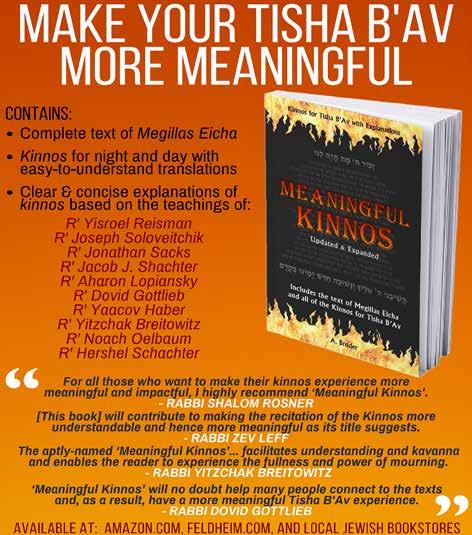

er, then you get there! The lines are too long, the weather is too hot, and someone is already nauseous from the Tilt a Whirl.
Many people are wise. They right away join a neighborhood pool or beach club or they were smart years ago and chose parents with their own pool, so they are set weekly with their Sunday plans. This certainly reduces a lot of the problems. Just get there and the day is made.
What we dream of ultimately is good weather, good friends, quality family time, and everyone keeping busy doing what makes them happy.
Hanging with the kids, showing you care.
Better yet, having Sunday help there!
Truly, whatever is someone’s “thing,” they want time to do it.
The thing is, there are so few of these Sundays and so much that conspires to steal them. For instance: Rainy or cold weather. Then again, there are the two possible fast days that, depending on the year, can snatch two Sundays away just like that! Of course, we can’t forget about the Sunday given to Visiting Day! And throw in the price of being popular – a wedding or two or three –
After all, you don’t want looking for parking to be the day’s activity.
This poem may illuminate some of what does make them happy.
Jumping the waves, throwing a ball,
Better yet, hanging on the pool wall!
Sitting down, relaxing in a chair, Better yet, just lying there!
Talking, shmoozing, having fun.
Better yet, talking to no one!
that snatches a final few Sundays right out from under you.
We hold these days so dear. Yet, there are just not that many of them available to us.
Fortunately, this summer, we do have the two extra ones because the fast days are on Tuesdays. So whatever you decide to do with them, enjoy and hope they are custom-made for you!

